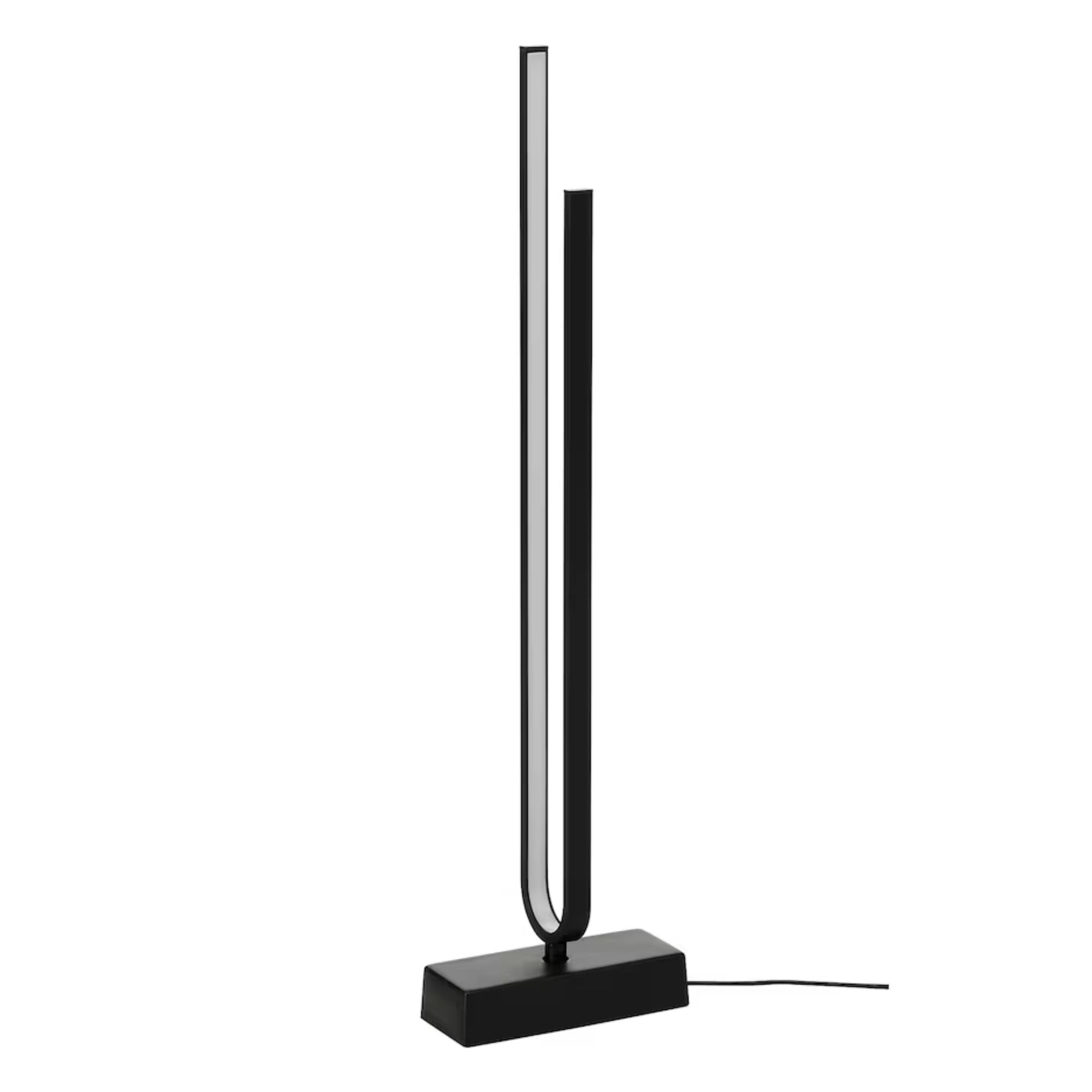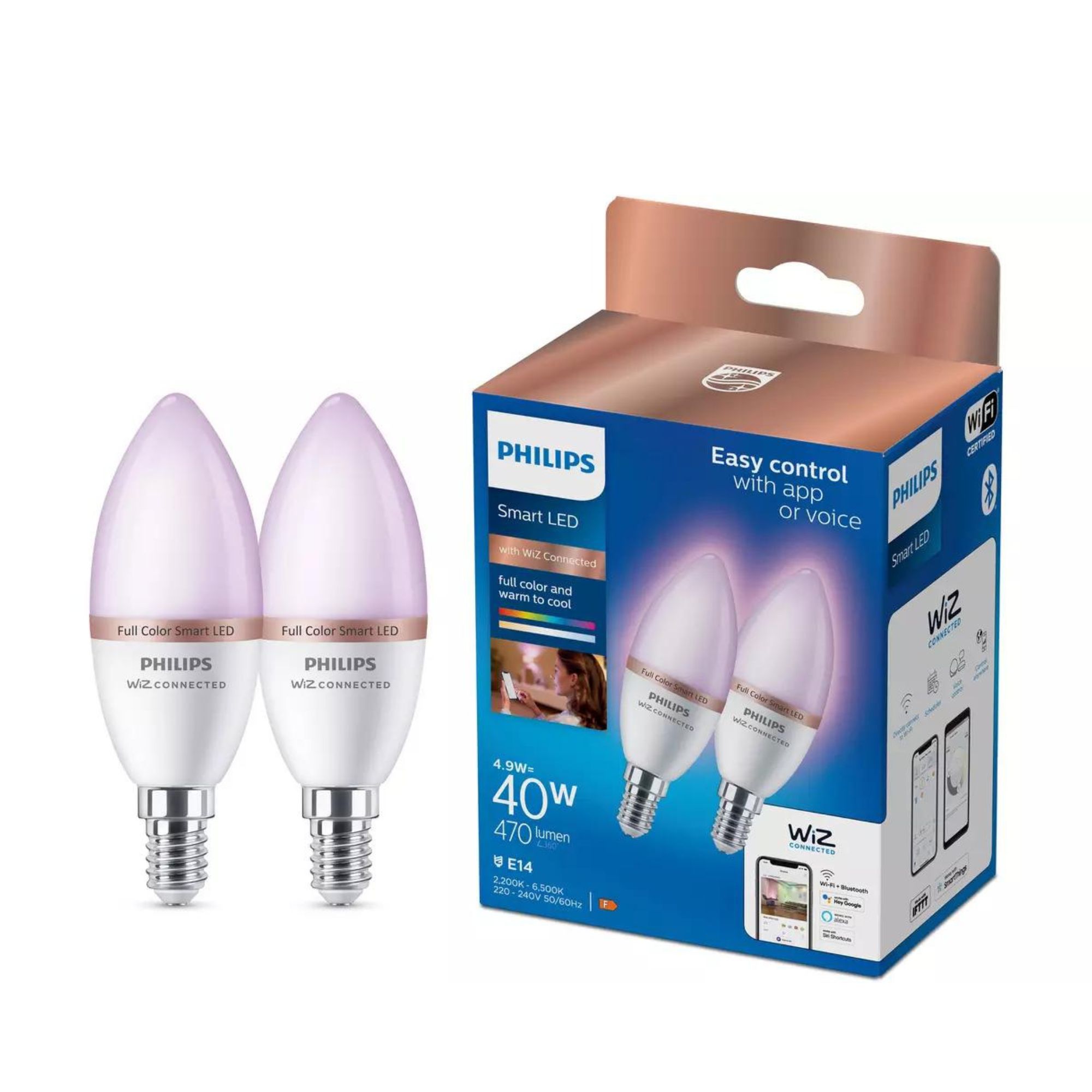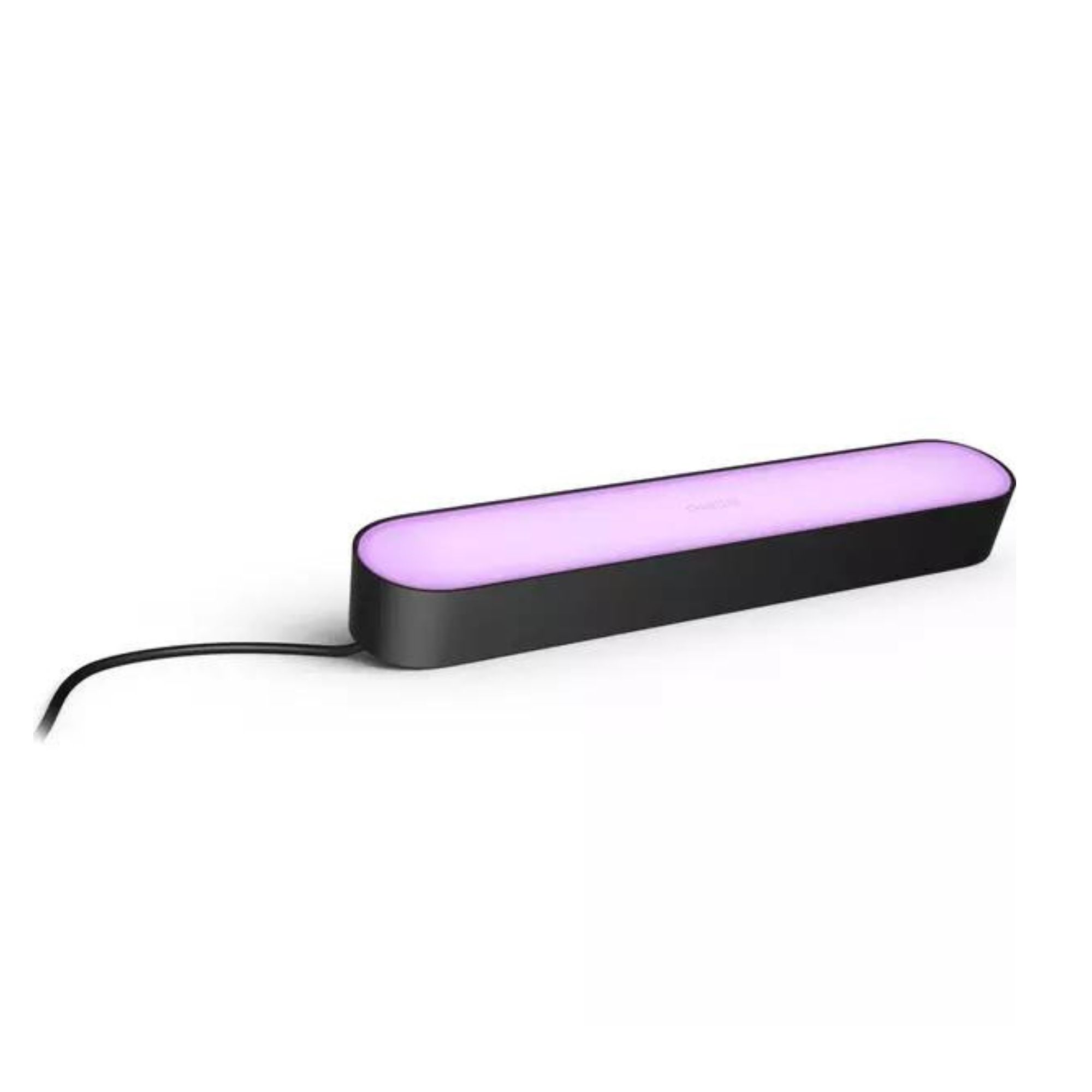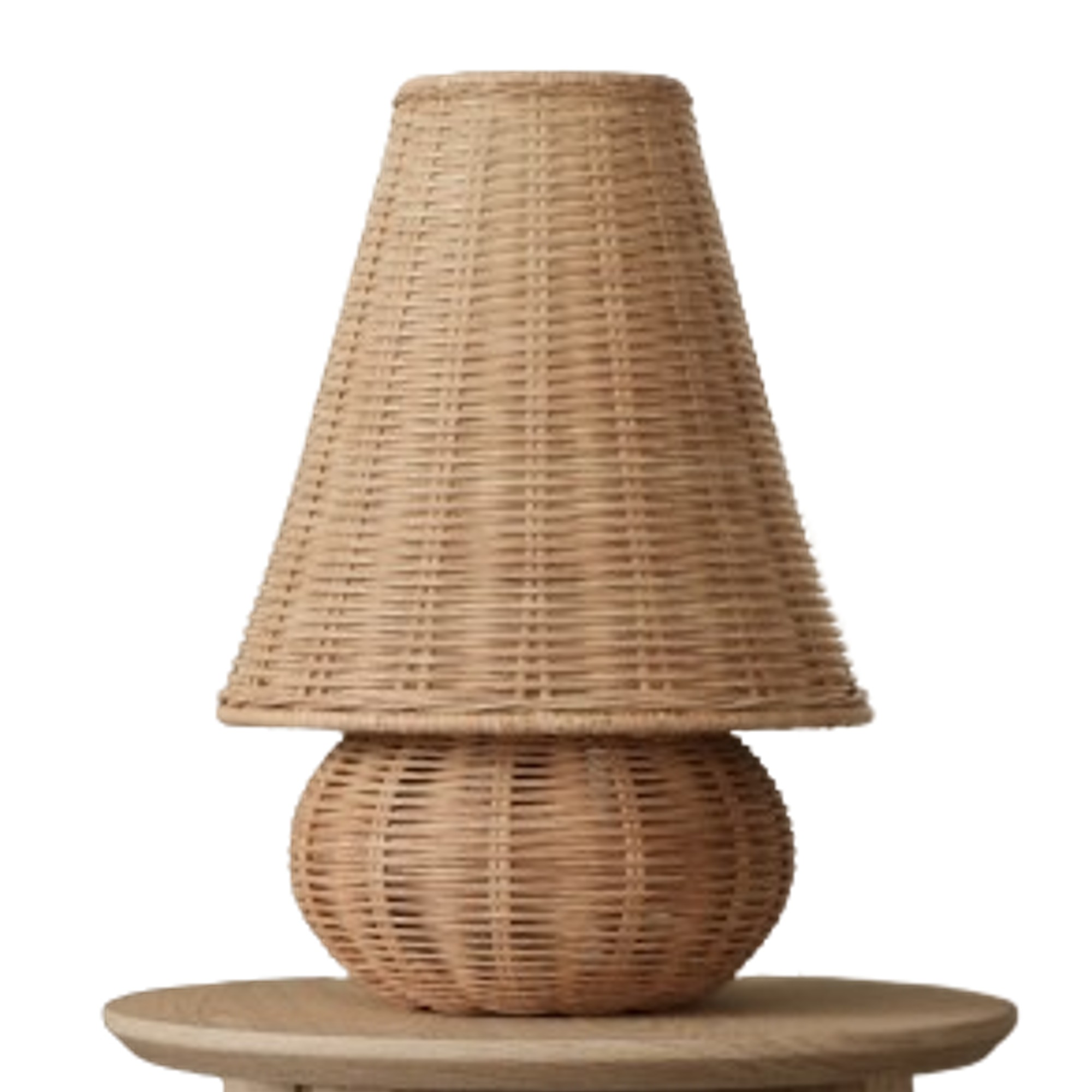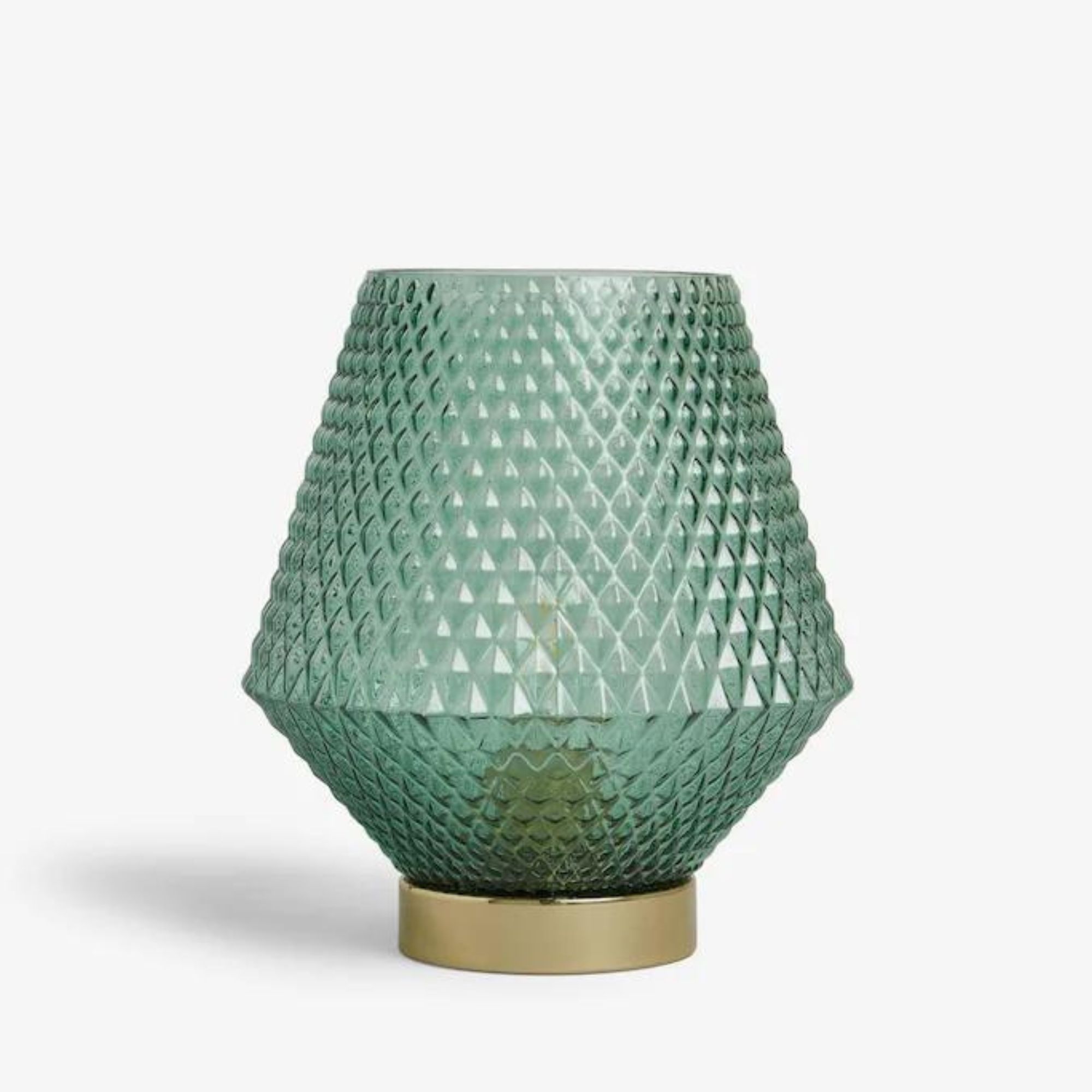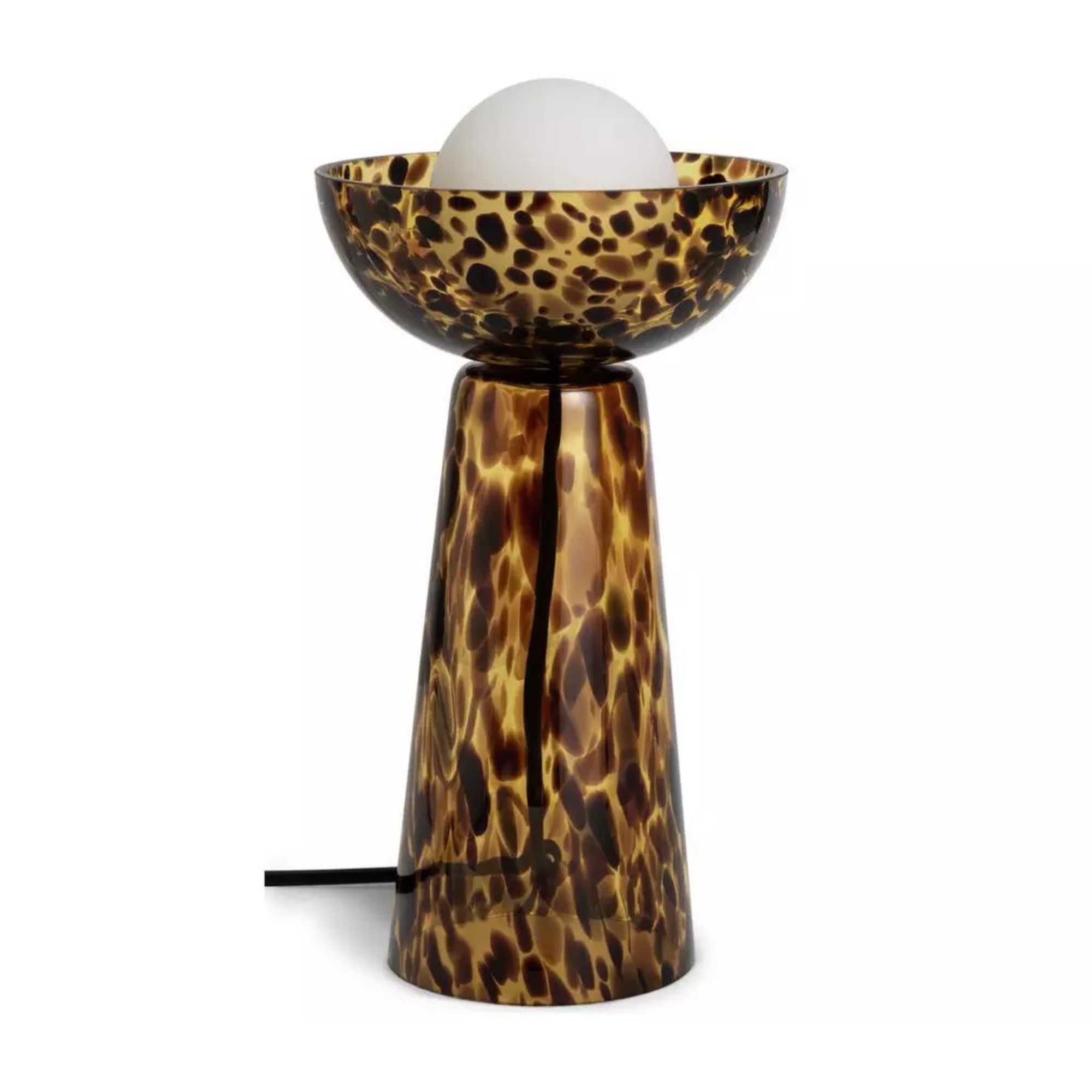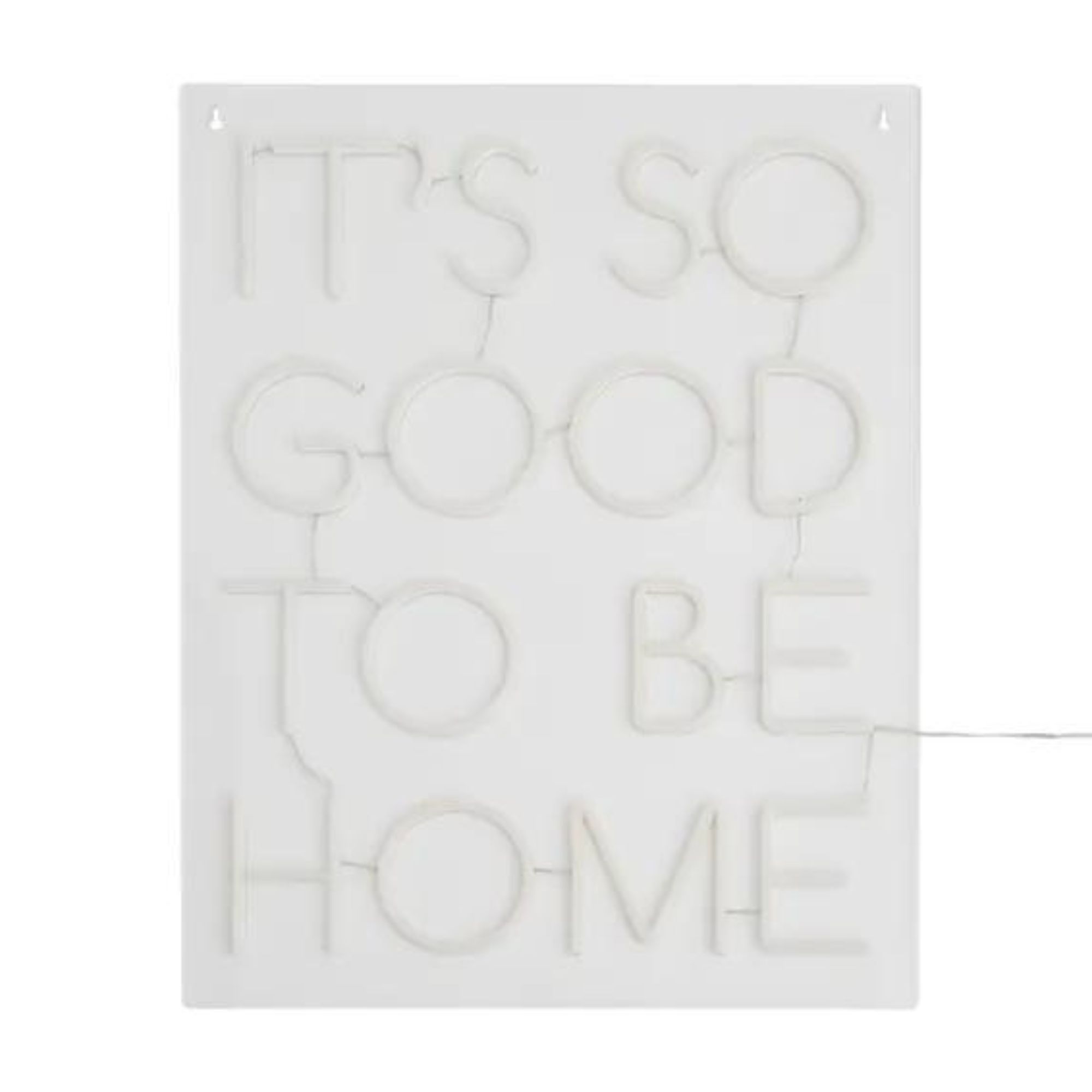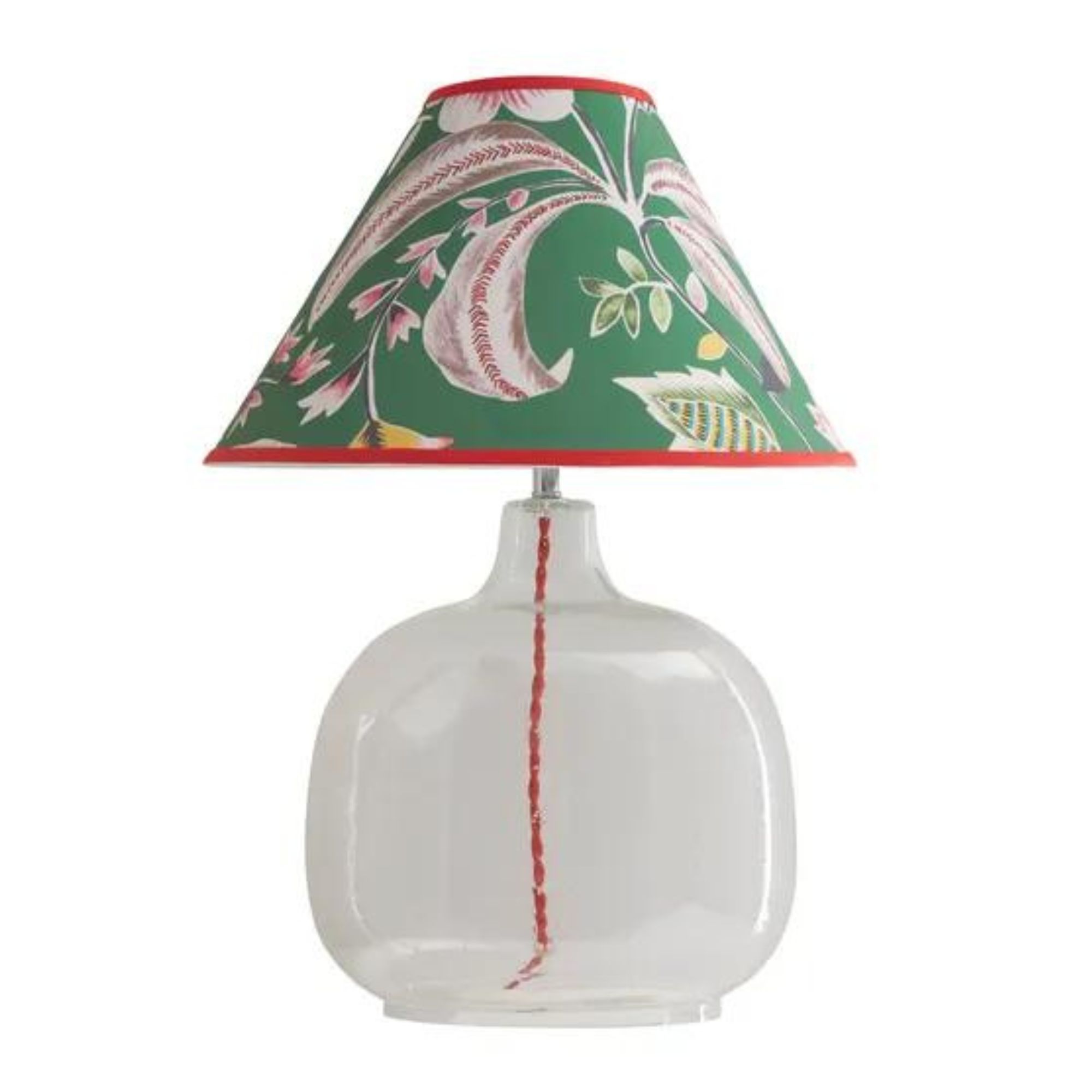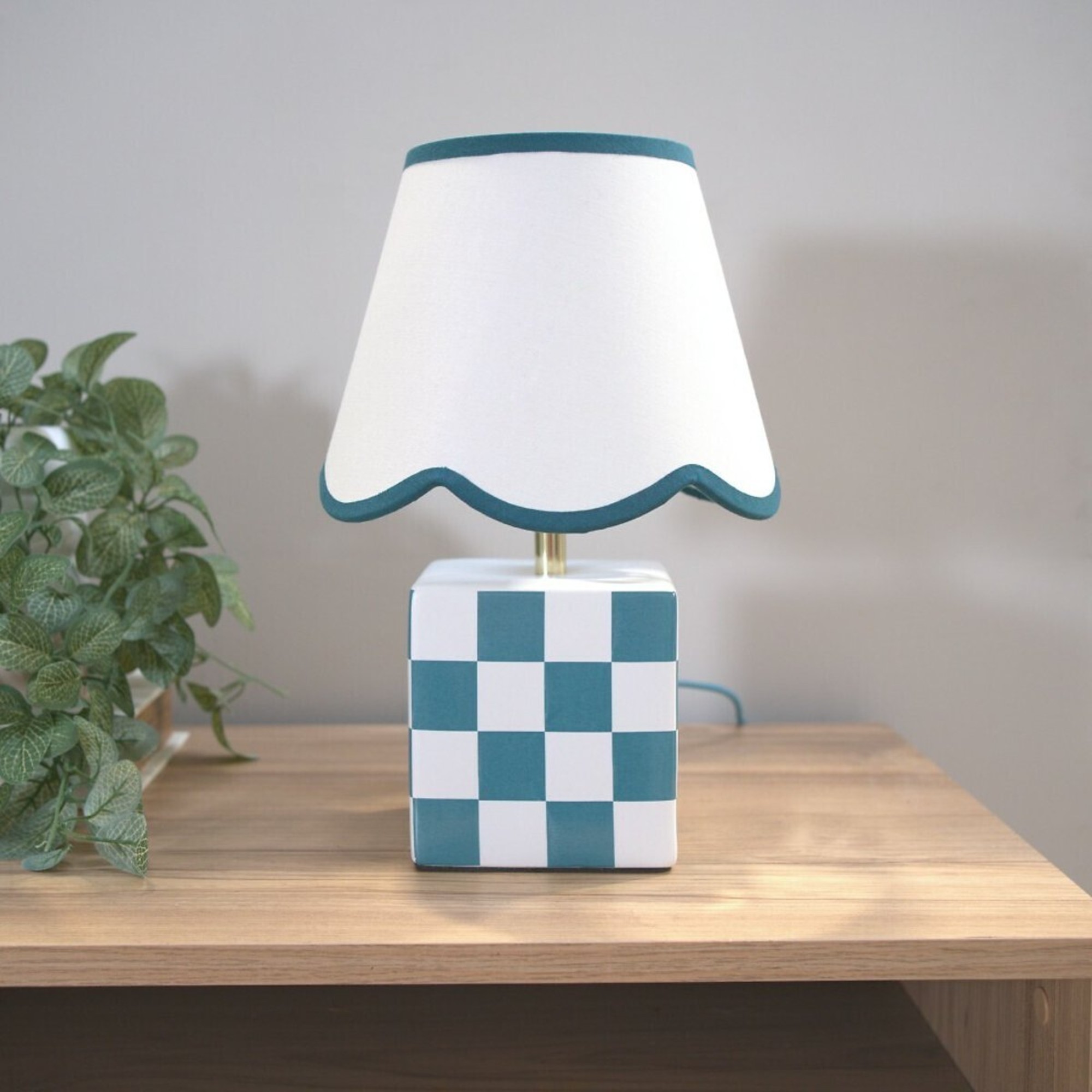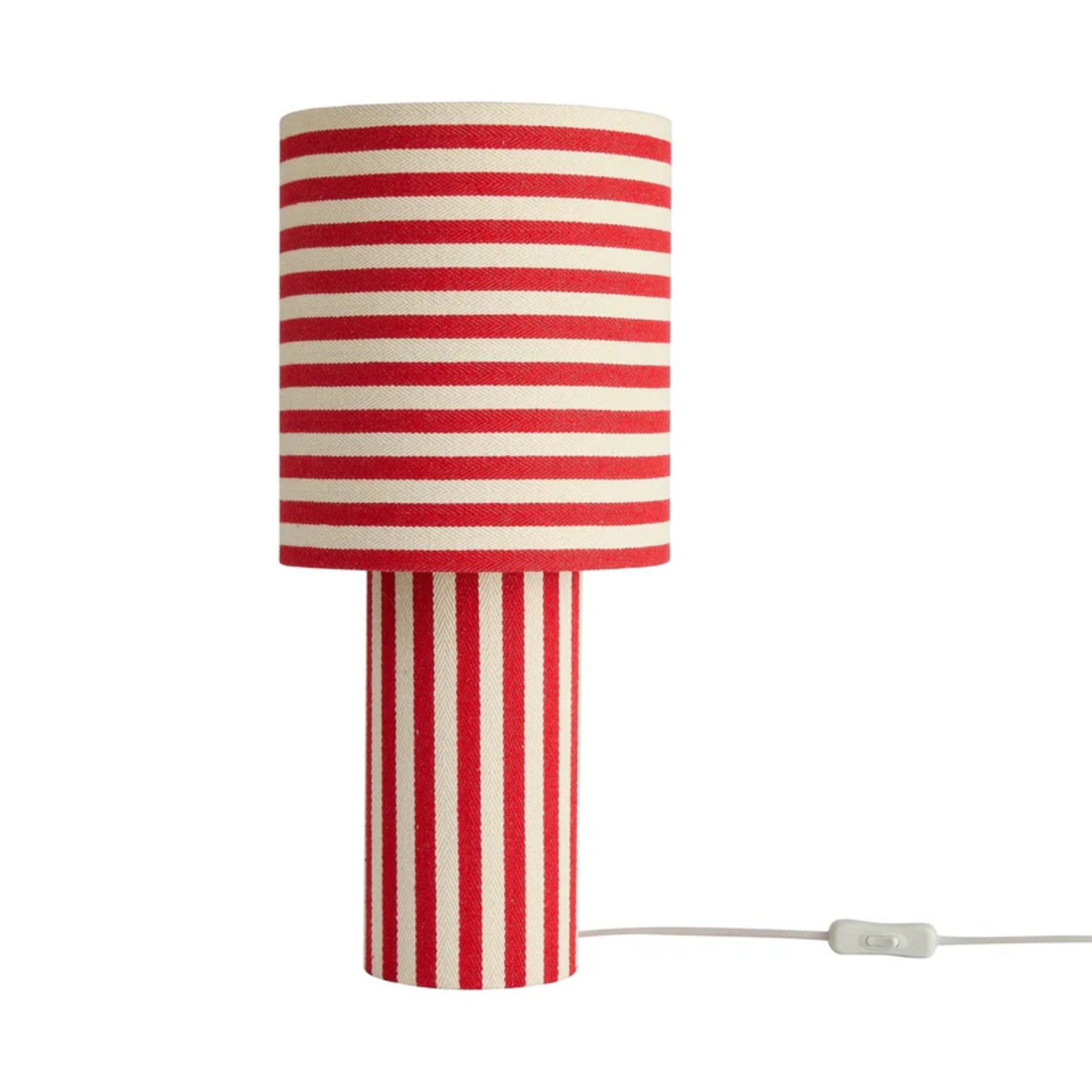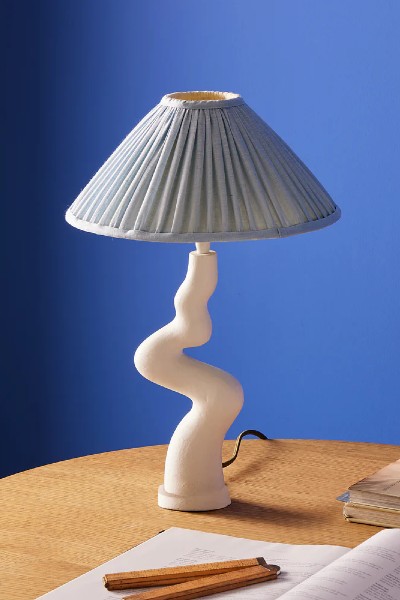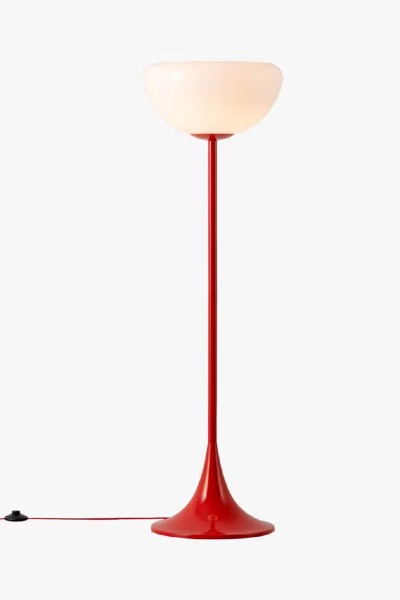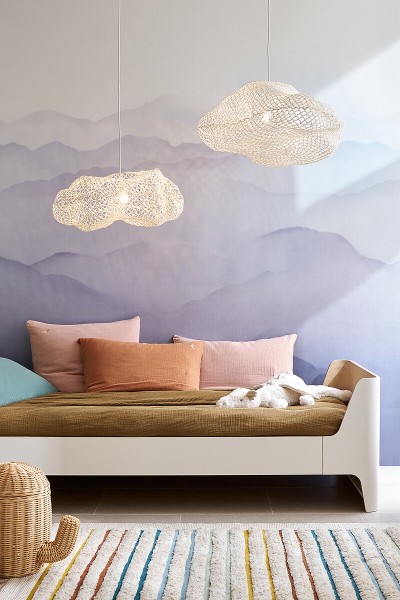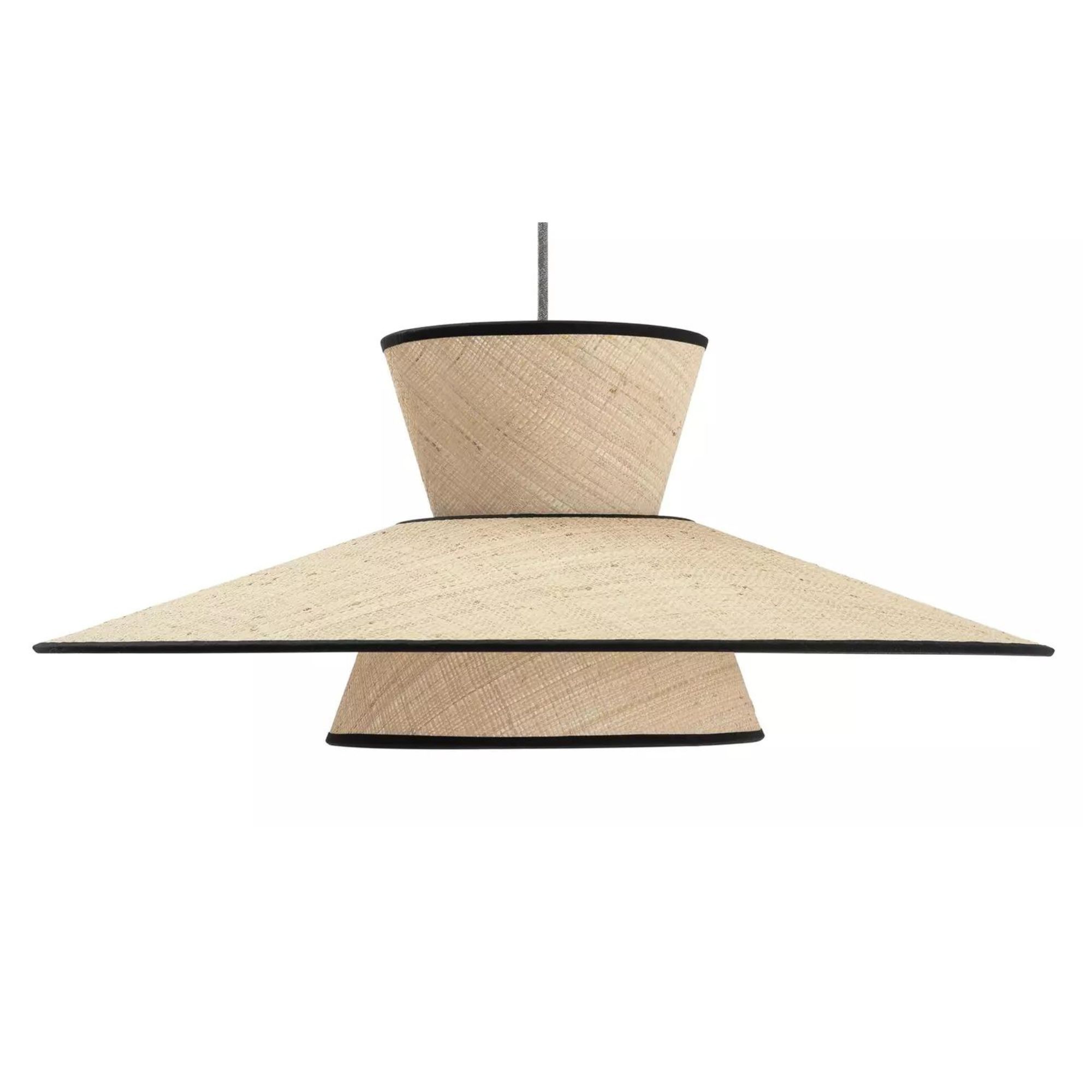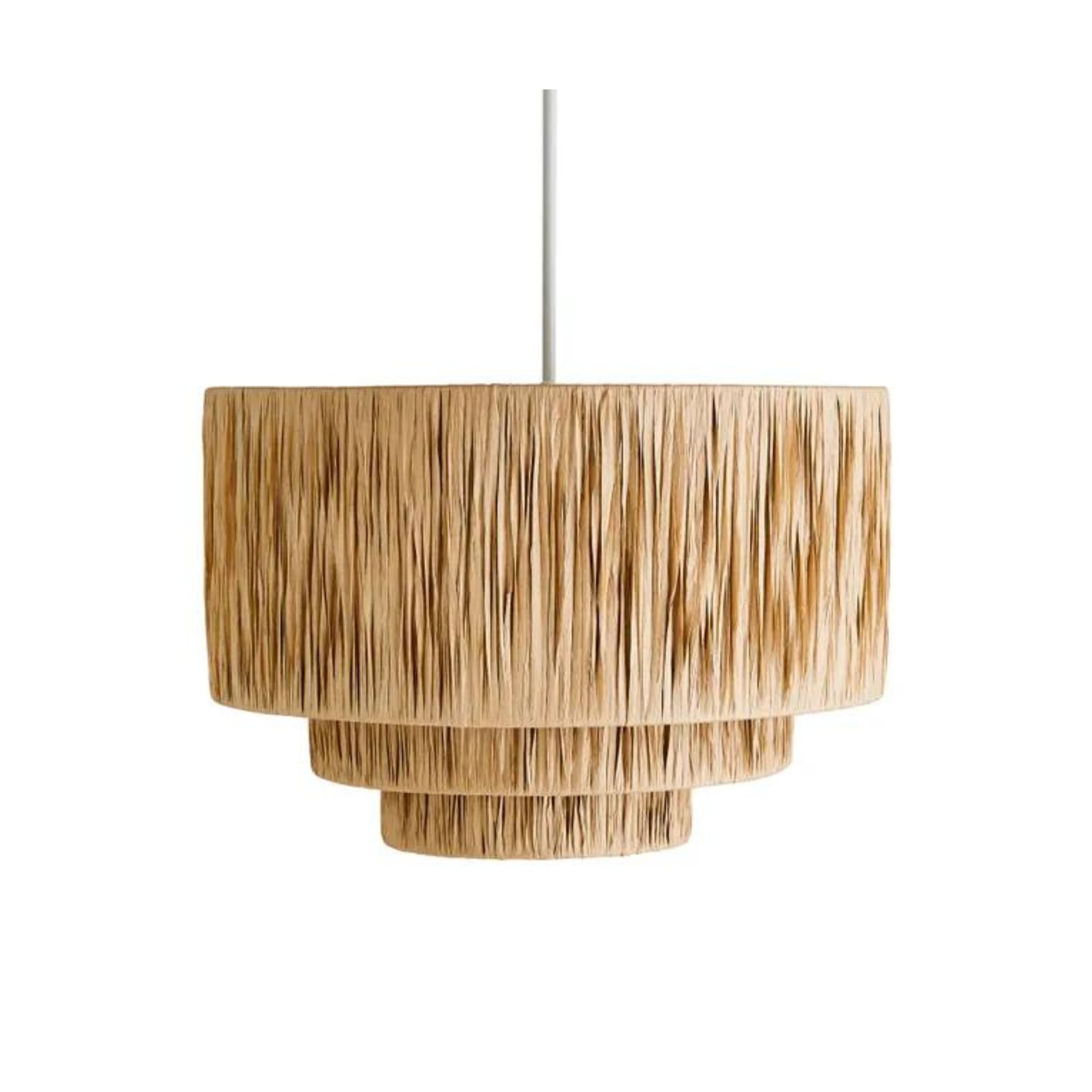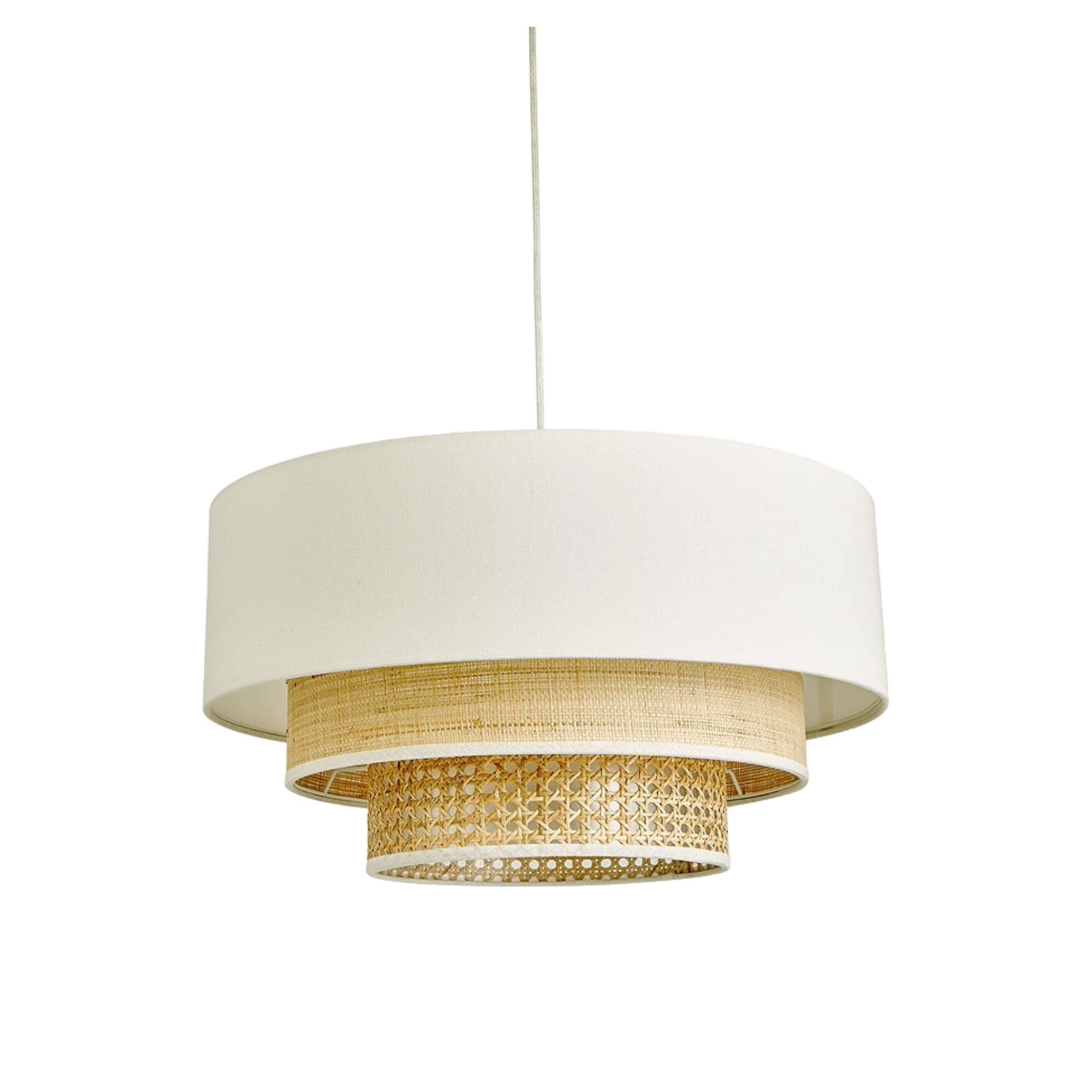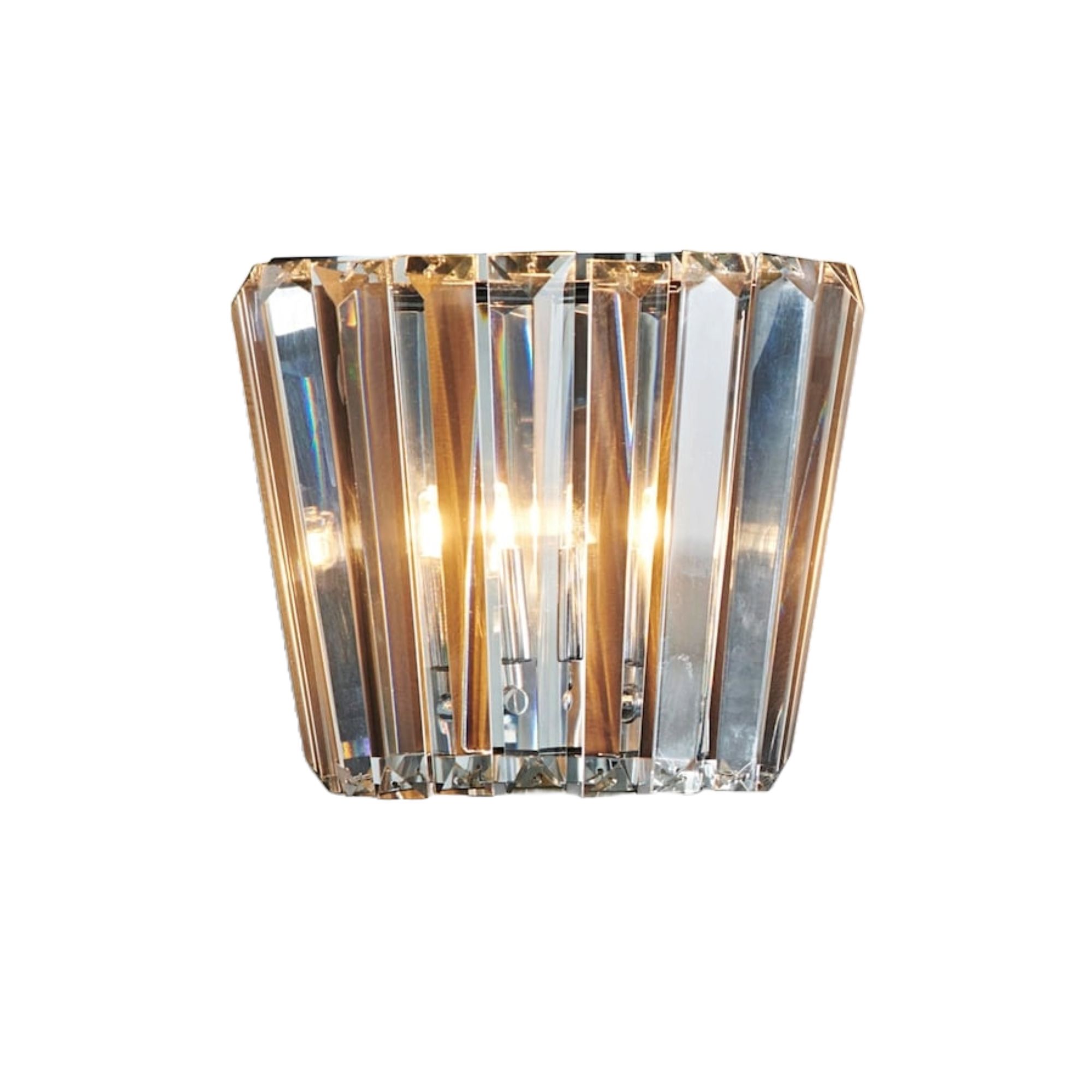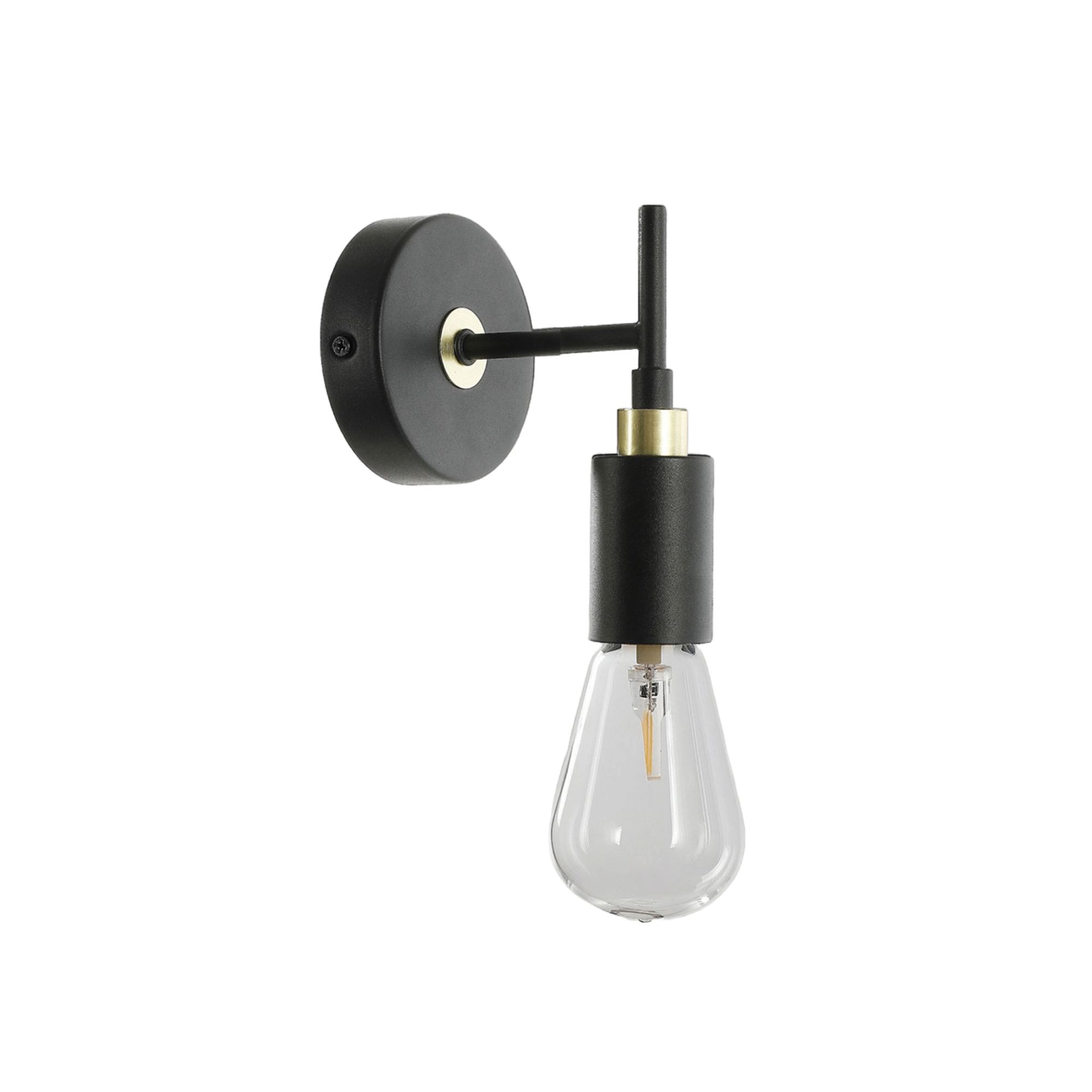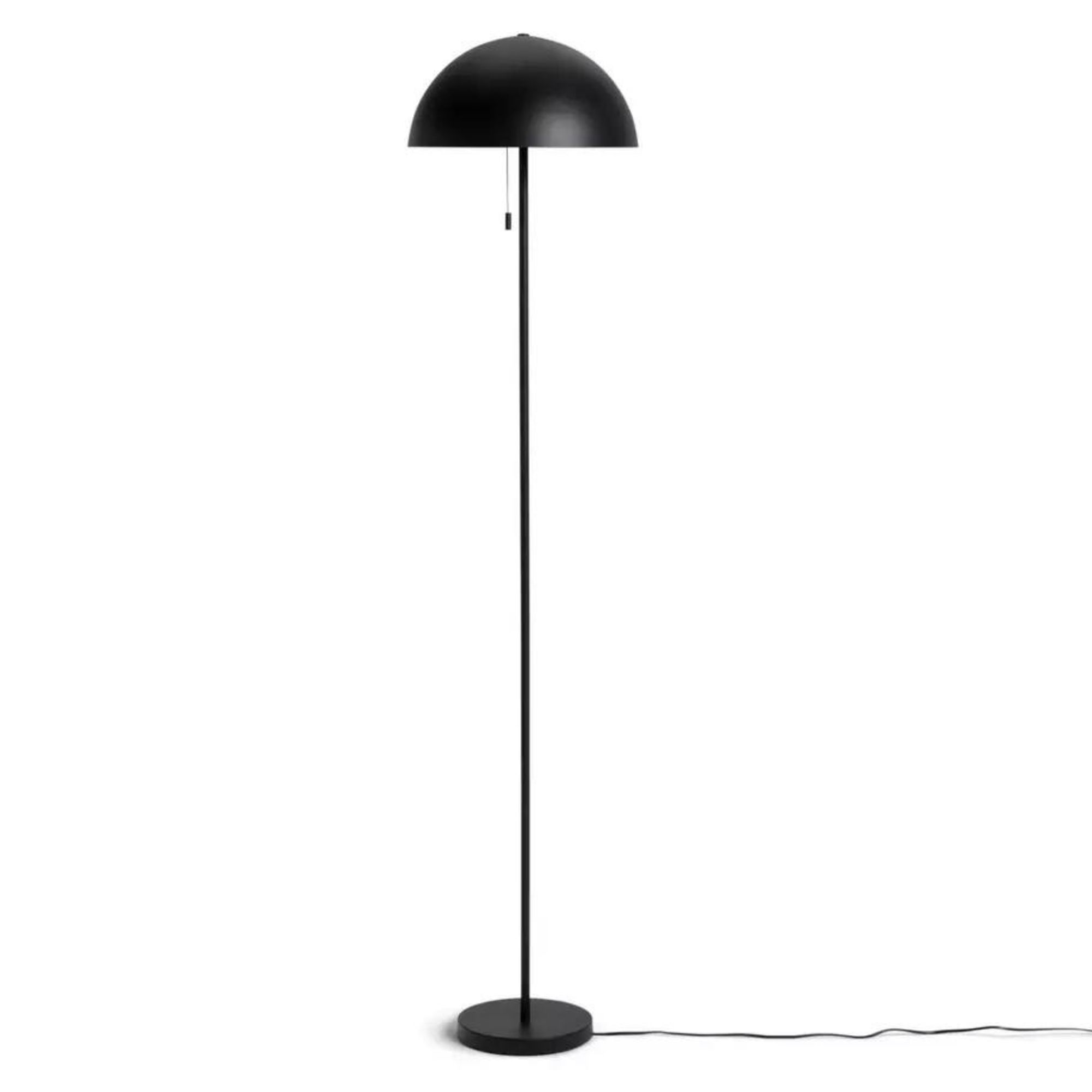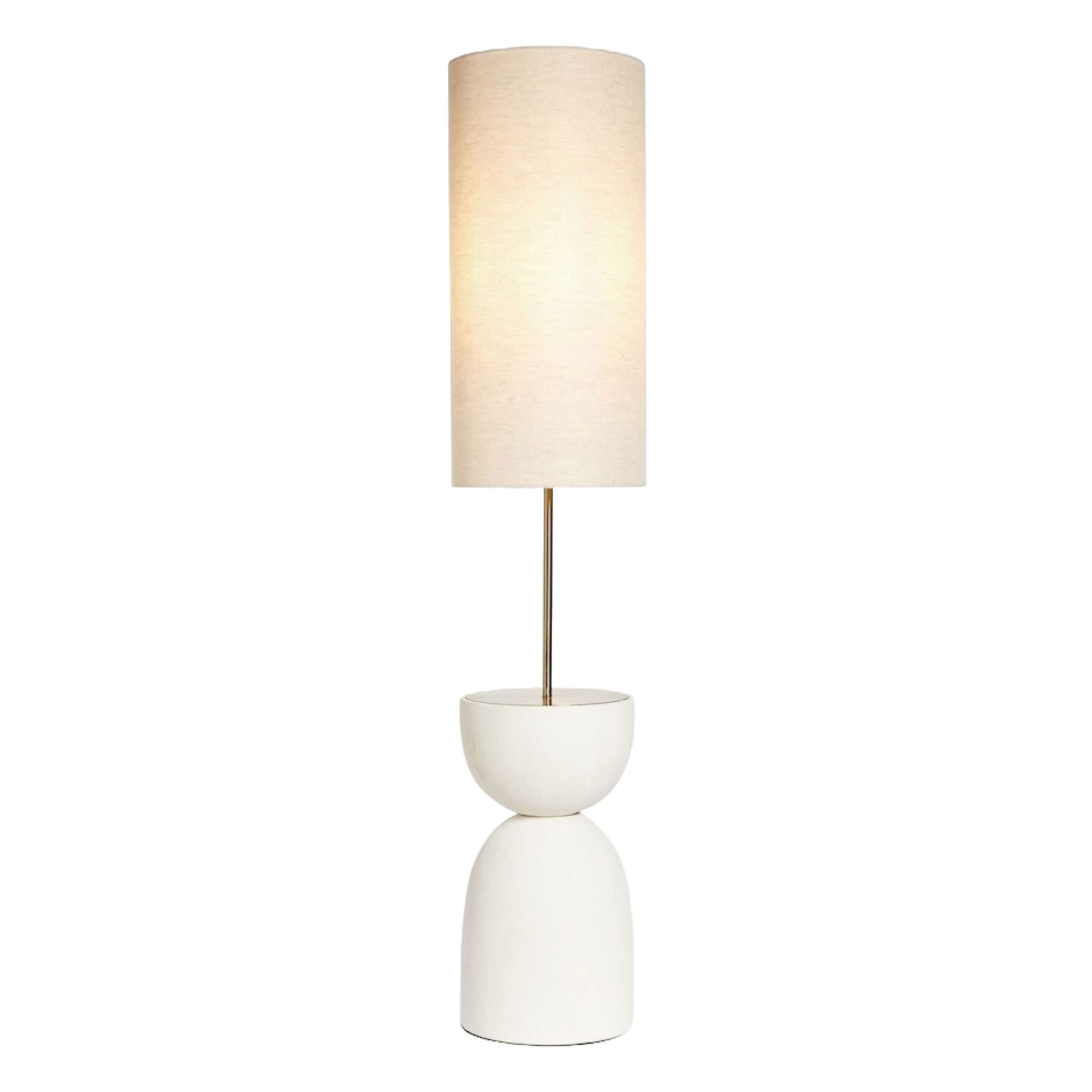Living room lighting ideas – 33 easy ways to use lights and lamps to add style and create a cosy mood
From quirky lamps to the right tone of your light, these are the best ways to give your lounge a stylish look and a cosy feel
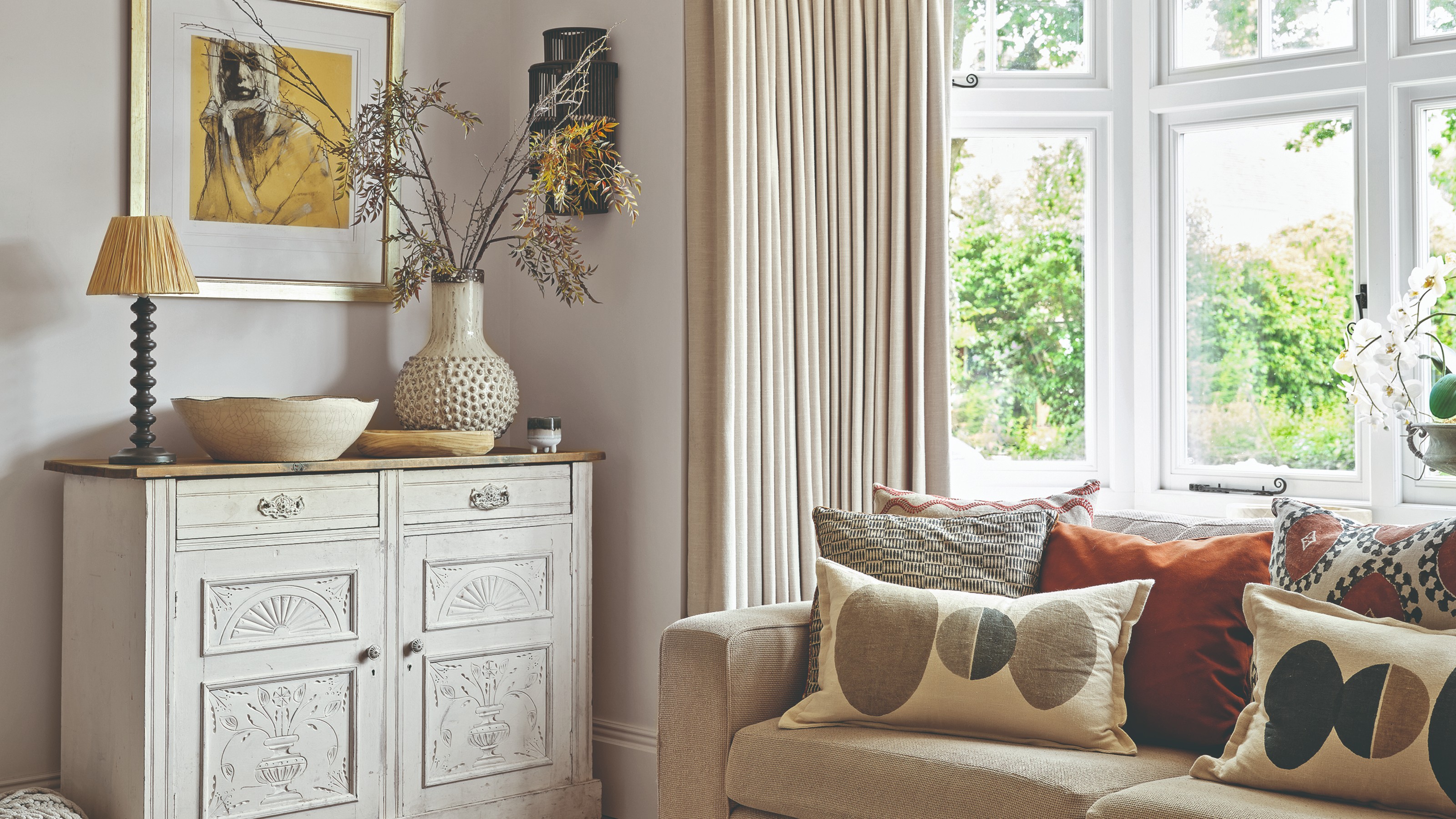

Lighting is responsible for setting the mood and the ambiance in any room. But we’d argue that nowhere is this as important as in the living room. The living space should ooze cosiness, warmth and welcoming vibes as it’s the place where you relax and unwind either alone or with the whole family and where you likely entertain your guests – and you want them to feel welcome, right? That’s what these living room lighting ideas are here to help with – that and the style factor.
That’s right, these living room ideas can also significantly elevate the look and style of your lounge, given the many chic and statement lighting trends that are sure to create a showstopping moment – whether that’s a sculptural pendant light suspended from the ceiling or a fun wiggle lamp placed in the corner. And while looking incredibly chic, they’ll also be effortlessly illuminating the room. That’s why living room lighting is so important to get right, both for the atmosphere and the aesthetic of the space.
Living room lighting ideas
‘Always plan your lighting scheme before you renovate or decorate your living room to help ensure you have good lighting in the space,’ advises Ally Dowsing-Reynolds, co-founder and lighting expert from Dowsing & Reynolds, reiterating the importance of living room lighting. ‘To do this, first consider how much natural light the space gets. Think about how you want to use the space, mapping out where key pieces of furniture will be placed such as side tables and coffee tables.’
1. Opt for cosy, warm-toned light
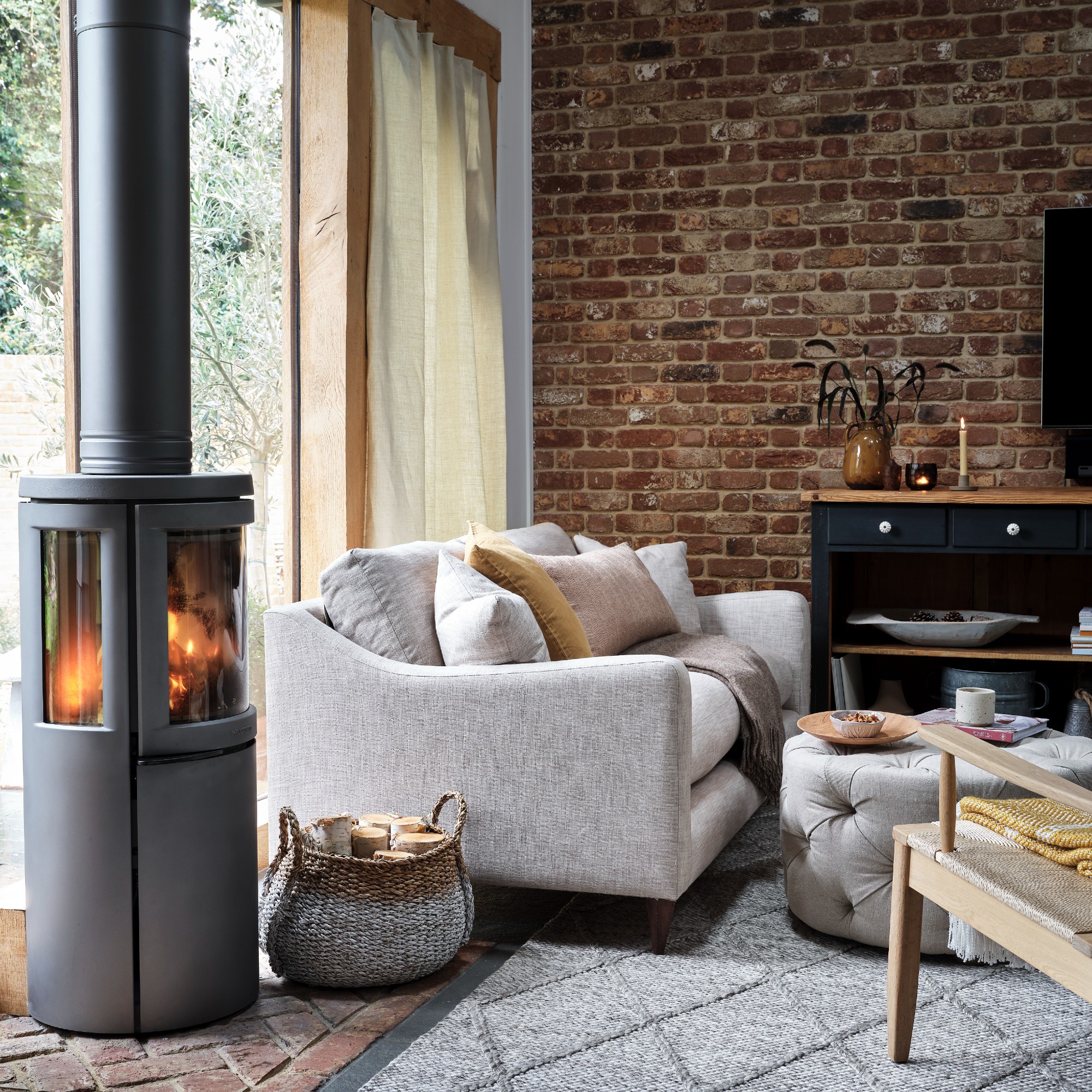
Cosy living room ideas can’t go without a level of warmth – and that applies to everything from the living room colour scheme to the materials and even the tone of the light used.
‘The majority of people use their living room to relax and unwind, so the lighting needs to reflect this,’ says Marlena Kaminska, lead digital designer at ValueLights. ‘I’d definitely recommend opting for warm toned bulbs to create a cosy atmosphere.’
Ally at Dowsing & Reynolds continues, ‘To take colour temperature into account, check the Kelvin on the bulb as this measures how warm or cool a light is. The higher the number of Kelvins, the whiter the light will be. Low Kelvins generate warmer, cosier light, making them perfect for your living room, dining room, bedroom or hallways. Whereas higher Kelvins are brighter, vibrant lights which are great for your kitchen, office or bathroom.’
2. Incorporate the big overhead light
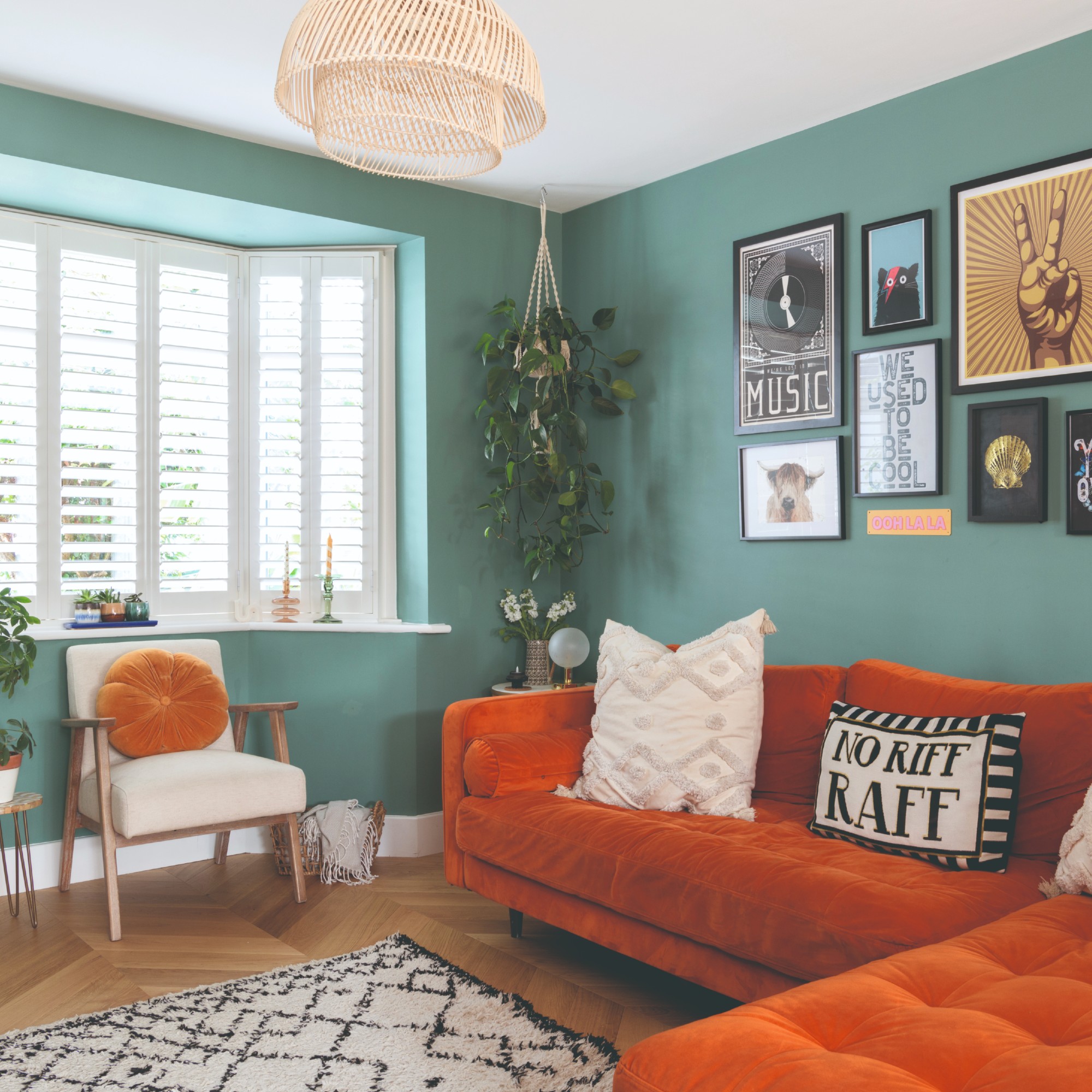
While there is a growing trend of ditching the ‘big light’ in favour of layered lighting, experts believe that the overhead light still has a place in the living room and shouldn’t be foregone completely.
Get the Ideal Home Newsletter
Sign up to our newsletter for style and decor inspiration, house makeovers, project advice and more.
‘The controversial “big light” or overhead light in a living room can be used as important task lighting and help to illuminate the room when you might need more light on a situation – for example, if you’re cleaning, helping the kids with homework or playing a board game. However, it’s important to incorporate the overhead light as part of a layered lighting scheme to help light the living room for different occasions. When it comes to choosing the overhead ceiling light, opt for a pendant light with a larger shade to help diffuse the light around the room,’ Ally at Dowsing & Reynolds recommends.
Marlena at ValueLights adds more advice on how to elevate the big light, ‘When it comes to overhead lighting, dimmers and other light sources can help to avoid harsh lighting when you’re looking to create a cosy atmosphere. However, bold chandeliers or pendant lights perfectly balance aesthetics and functionality when overhead lighting is needed.’
3. Illuminate displayed art
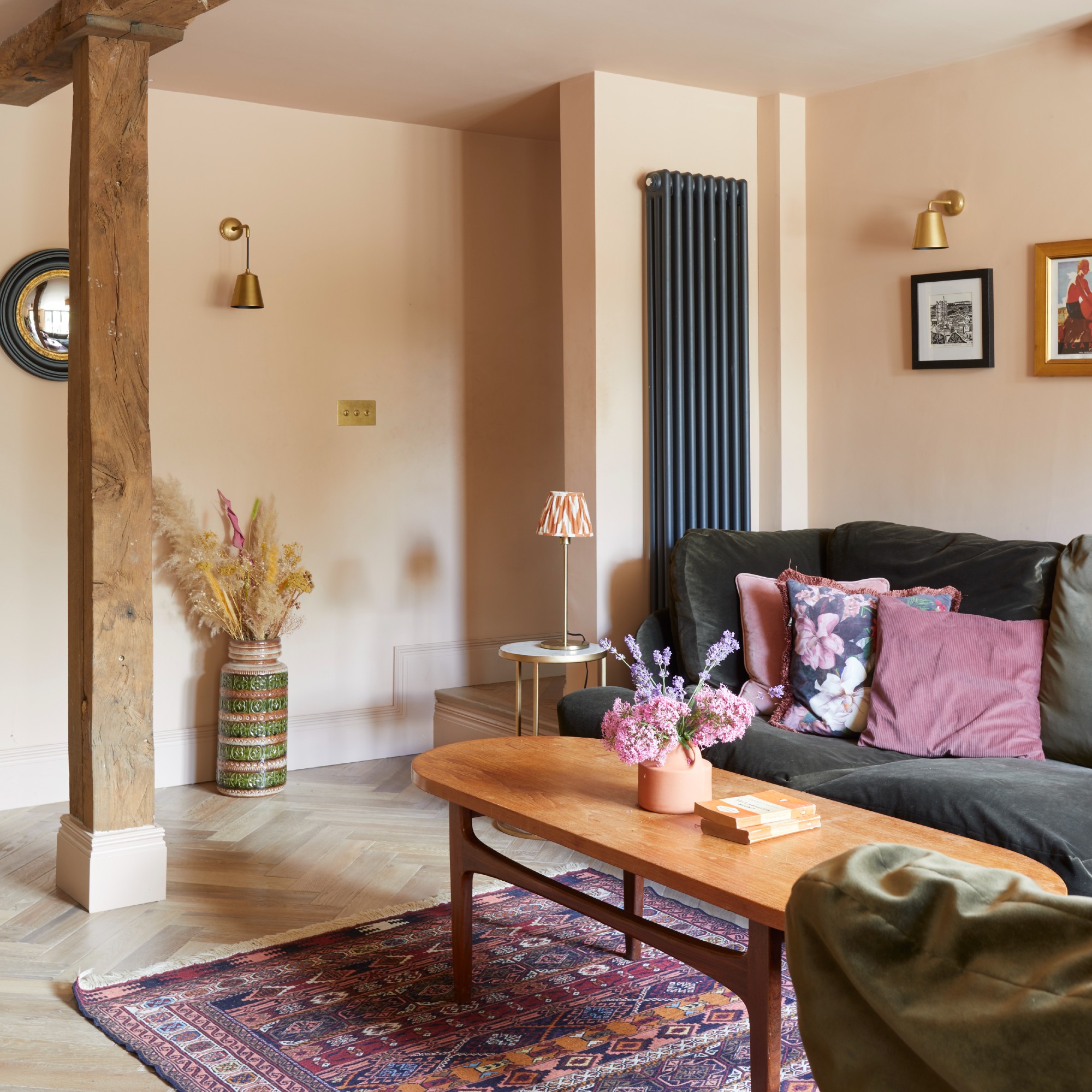
Wall lighting is really having its moment ever since last year with many brands coming out with chic wall sconce designs which became popular on social media. And while picture lights are just as popular to create a statement feature out of your wall-hanging art, wall sconces will do the job, too.
‘Add wall lights to create a relaxing ambience and light up any artwork around your living room ,’ Ally at Dowsing & Reynolds suggests.
4. Add warmth with a wash of lighting
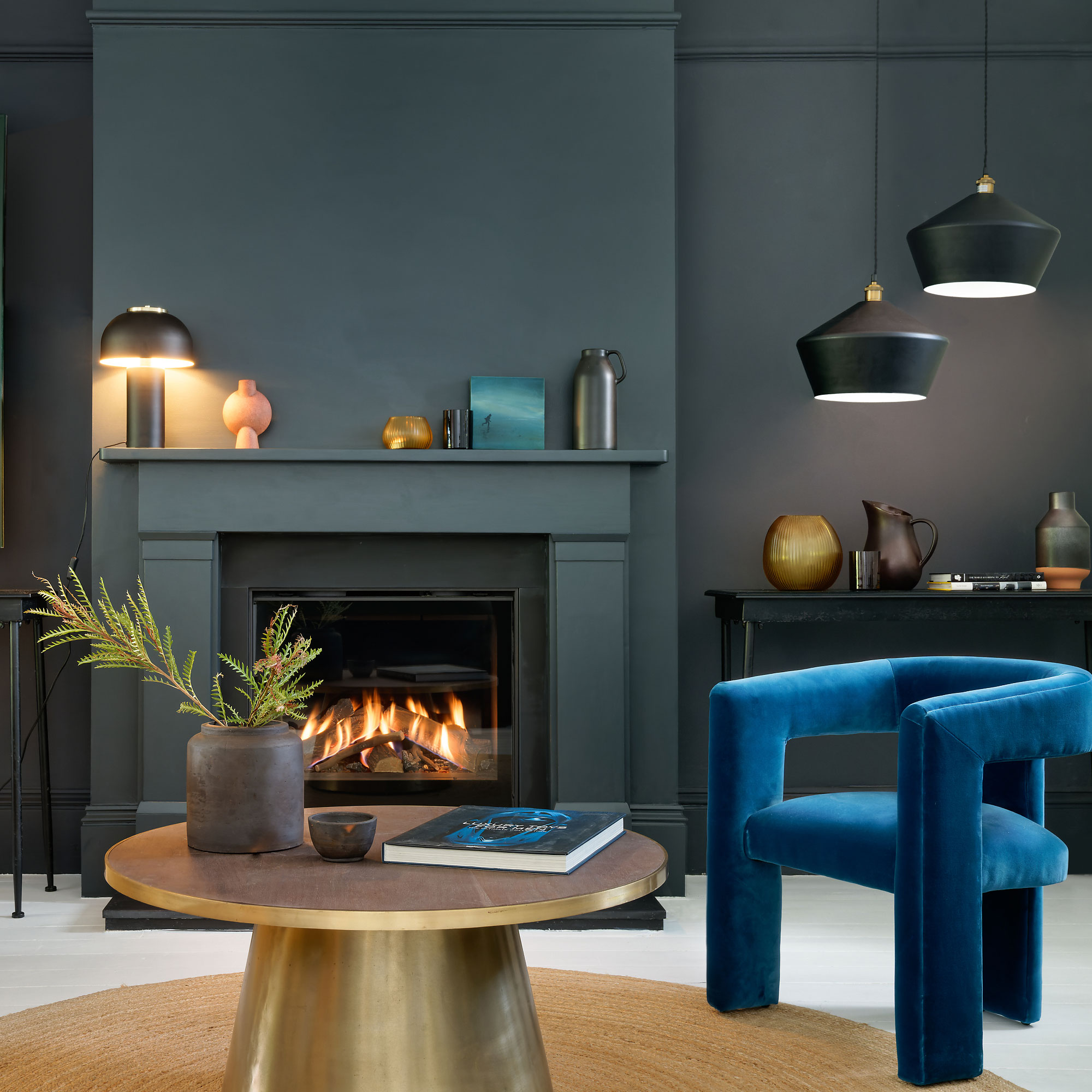
Before you buy anything, thinking long and hard about what type of living room you are choosing the lighting for. ‘Is it a more formal living room or a casual family hub type of space?’ asks Rohan Blacker, founder of lighting company Pooky .
‘Also think about the aesthetics of the room,' continues Rohan, 'you can use a mix of lamps, pendant and wall lights in various finishes to easily dictate style.’
‘The main function of a living room, more than any other space within the home,' he says, 'is to promote a sense of familiarity, relaxation and cosiness – all of which can be enhanced by lighting.’
Start by hanging pendants at different heights for visual variety. You can place them above an area of focus like a console table. Next, choose a table lamp in a similar finish for a coordinated look.
5. Swap out light bulbs for 'smart' versions
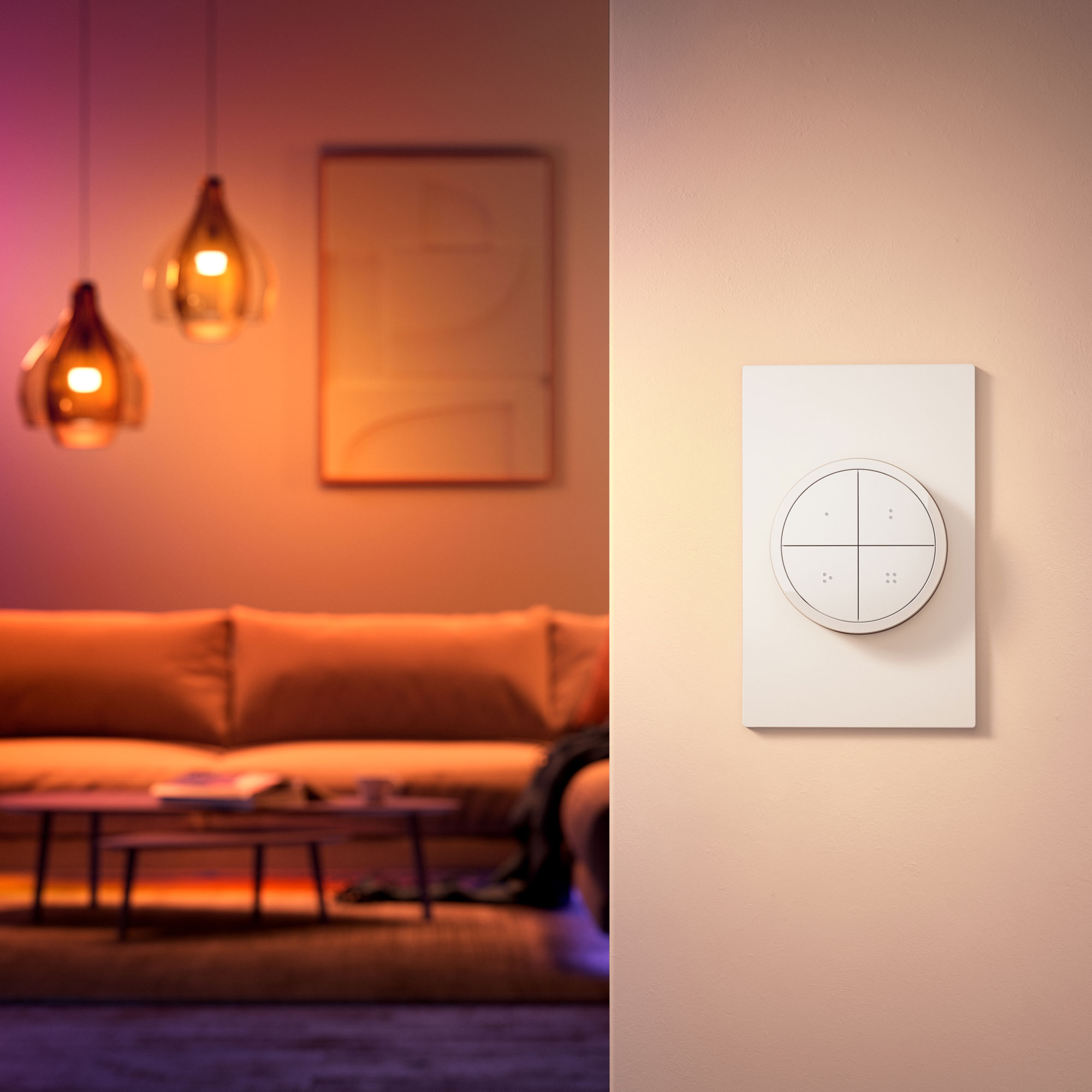
Five years ago, we might have suggested that you install a dimmer switch as a clever living room lighting idea, giving you control over how brightly your lights shone. Nowadays, you need simply switch out your lightbulbs for smart versions for the same effect (and with far more functionality).
‘Don’t get overwhelmed by smart lighting and colour-changing lamps, though,’ says Peter Legg, design and brand manager at där Lighting Group and The Light Shade Studio. ‘Try smart light bulbs in your existing fittings – the best feature is the ability to dim or turn off lights and create ‘schemes’ on your app via these bulbs. It does take some time to set up scenes, but once set up, you’ll be glad you did.’
Begin with a starter kit from Philips Hue at Amazon which covers two lights and you can link up to 50 in total around your house. When your smart lighting is linked to a smart assistant, you can turn the lights on and off and adjust the brightness all via voice control. You can also set schedules and design scenes depending on what you're using the room for.
6. Introduce a soft glow
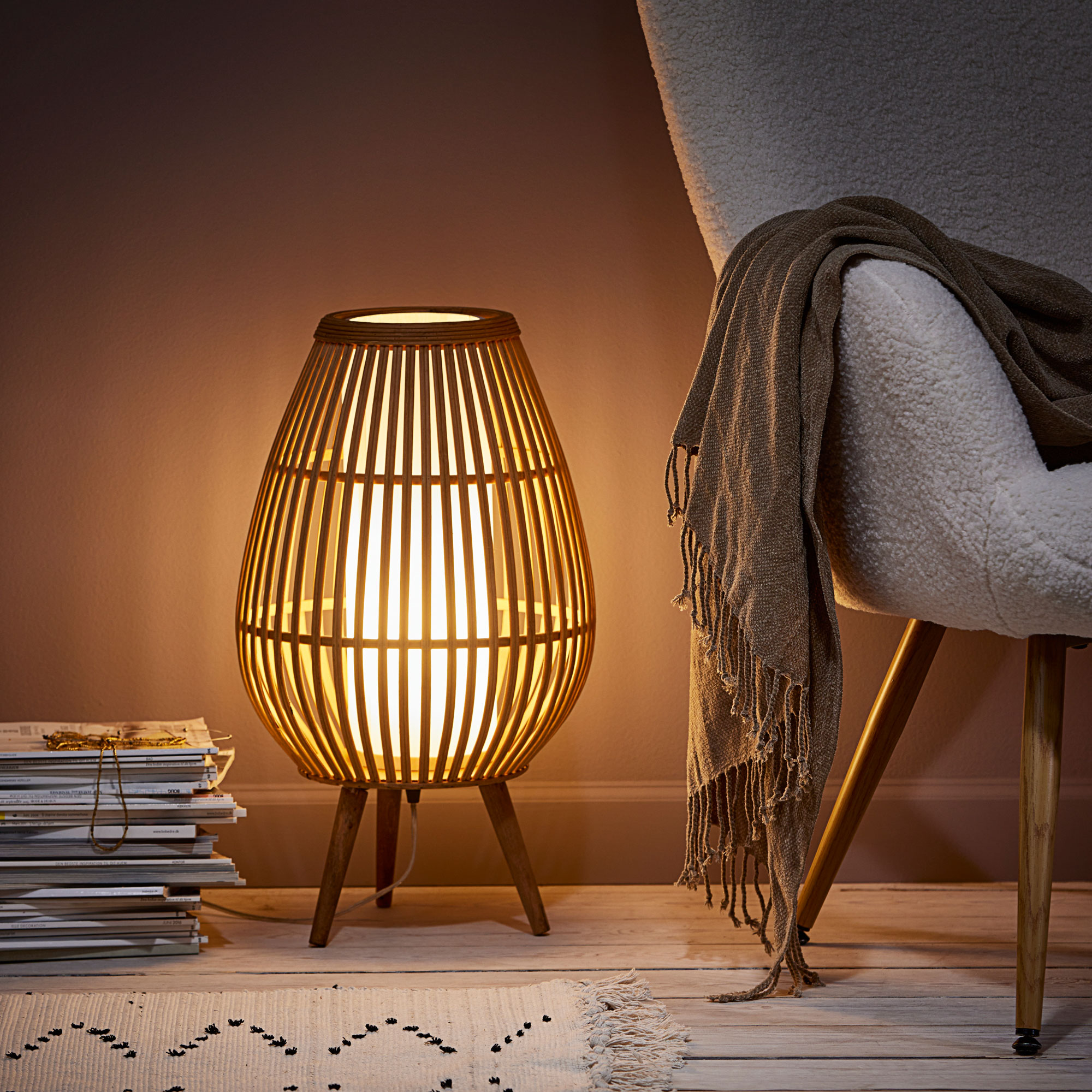
‘Lighting can definitely make or break any interior scheme,' explains Peter Legg from där Lighting Group and The Light Shade Studio. 'Living rooms are often used for relaxing, so adding soft, layered light is the way to go.’
Low level lighting covered in a naturally diffused shade made from bamboo or rattan casts interesting shadows at floor level and give the space a warm, relaxed vibe.
7. Echo natural light with natural fabrics

Use your lamp base to add natural texture to your space, like this Palmer wood floor lamp from Next. The stacked ball design adds visual interest while the plain natural shade echoes the similar fabrics on the curtains and upholstery creating a calming, cohesive scheme.
Try to avoid cold white lightbulbs. Rohan Blacker from Pooky agrees, ‘Try using a soft warm yellow or white light, rather than a stark white, with a dimmer to find the right intensity.'
'It is no surprise that an open fire is always considered as the cosiest place in a house – the lighting from the fire is localised, soft and accented, and the colour and intensity is just right.’
8. Keep surfaces clear (but don't lose out on light)
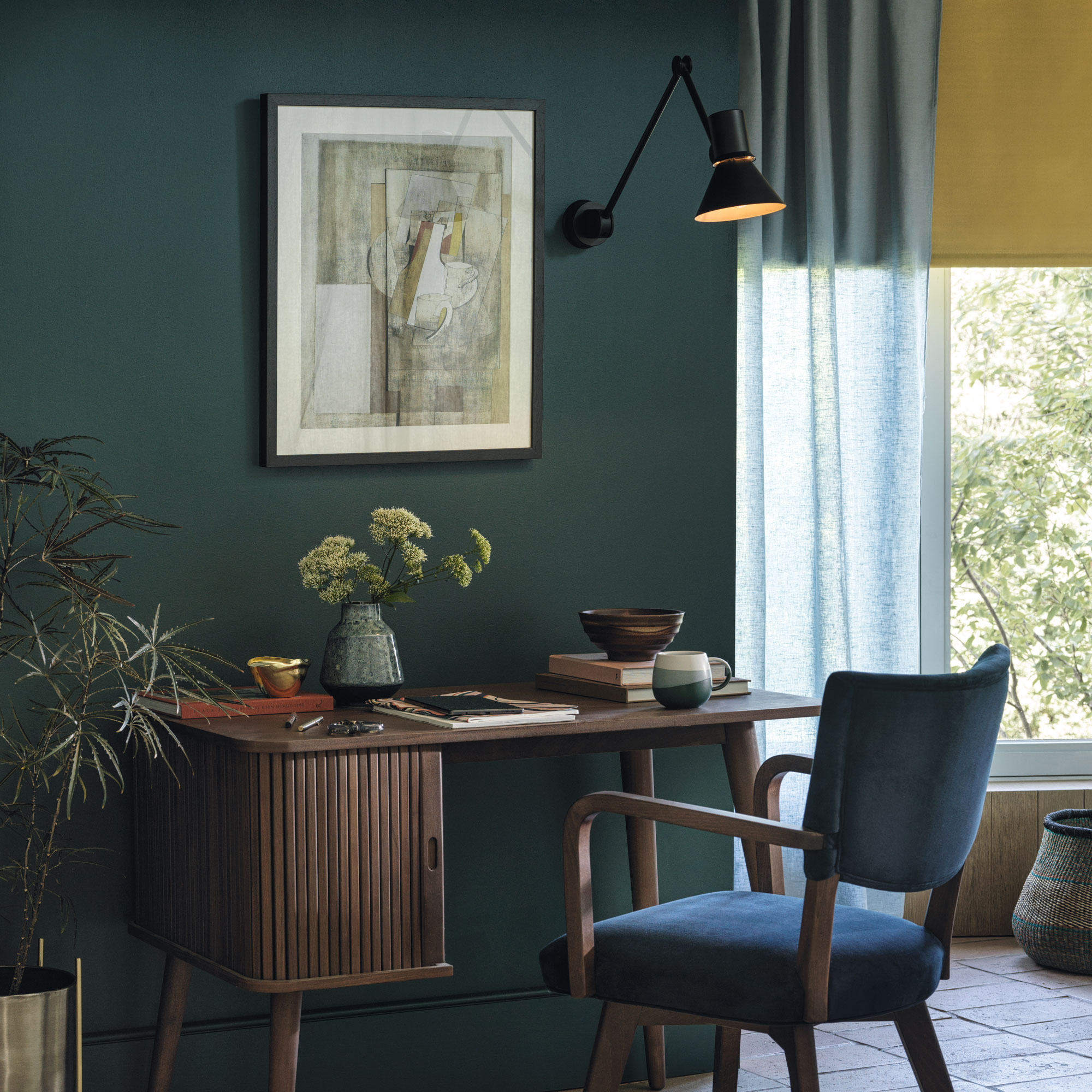
Keep desk space clear of clutter - essential if you have a desk area in your living space - using a smart wall light hung above.
Rohan from Pooky loves a wall light, ' They add an extra layer to your overhead, table and floor lamp options – they are unobtrusive, pretty and very efficient with space if you aren’t spoilt with lots.’
‘They are beautiful as both ambient and accent lights,’ continues Rohan. ‘They can act as great practical task lighting and can make a striking design statement.’
9. Make a feature of inset shelving
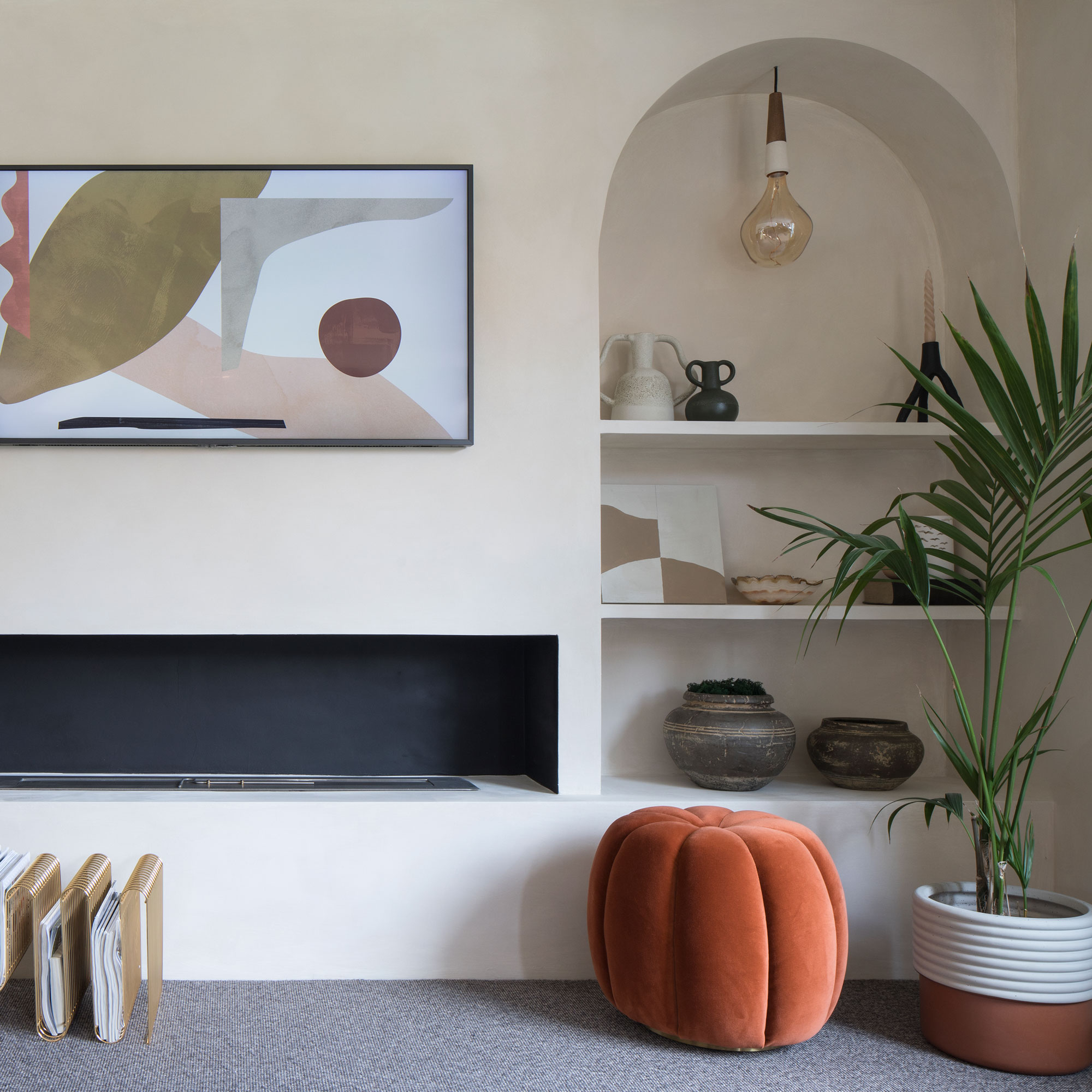
‘The more sources of light you have, the more moods you can create. Clustering a few lamps is a great way to add impact to an alcove or mantlepiece,’ says Rohan from Pooky.
‘Keep these table lamps soft,’ agrees Peter Legg from Dar Lighting Group. ‘Pleated fabric shares are really trending right now. Again, low-wattage bulbs will allow you to build up these layers of light, creating different moods within the room, depending on the time of day or activity.’
10. Incorporate a neon sign

Neon signs were once reserved for Halloween decoration ideas, but times have now changed. Neon signs are becoming more and more popular, offering homeowners the chance to add a touch of personality to their living rooms while still adding a soft light.
Emily Kelsey, PR assistant at Lights4fun, says, ‘Welcome a contemporary décor style into your home with a neon light. Perfect for creating a minimalistic statement, an uplifting slogan and complementary colour will be the ultimate addition to your living room and brighten up the darker months.’
‘Style in the middle of a plain wall to create a focal point, using removable command strips to seamlessly secure in place, and simply plug in, watching as your living room is filled with a cosy, colourful glow each day.’
11. Choose different lighting from a co-ordinating range
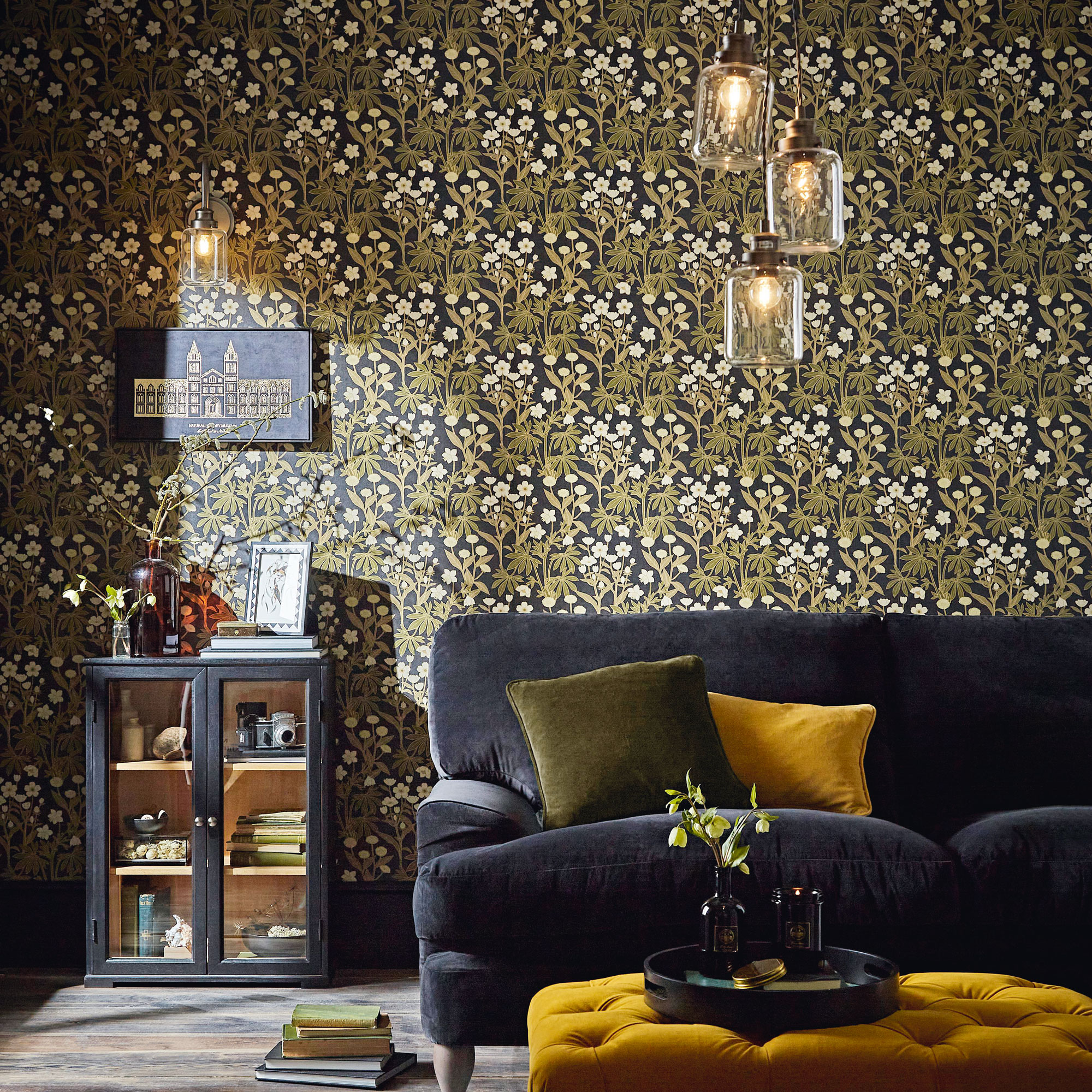
Even if your ceilings are low, you can still hang a striking pendant light. You can still have a statement central light, as interior designer Sarah Gare explains, ‘Just hang it above a sofa or coffee table as this is dead space that no one will walk under, so there aren’t any height restrictions. I’d also add directional spots in the ceiling and a floor or table lamps.’
This clear glass cluster design is extra clever - as it's see-through, it allows you to see any wallpaper pattern through it.
12. Complement your interior scheme
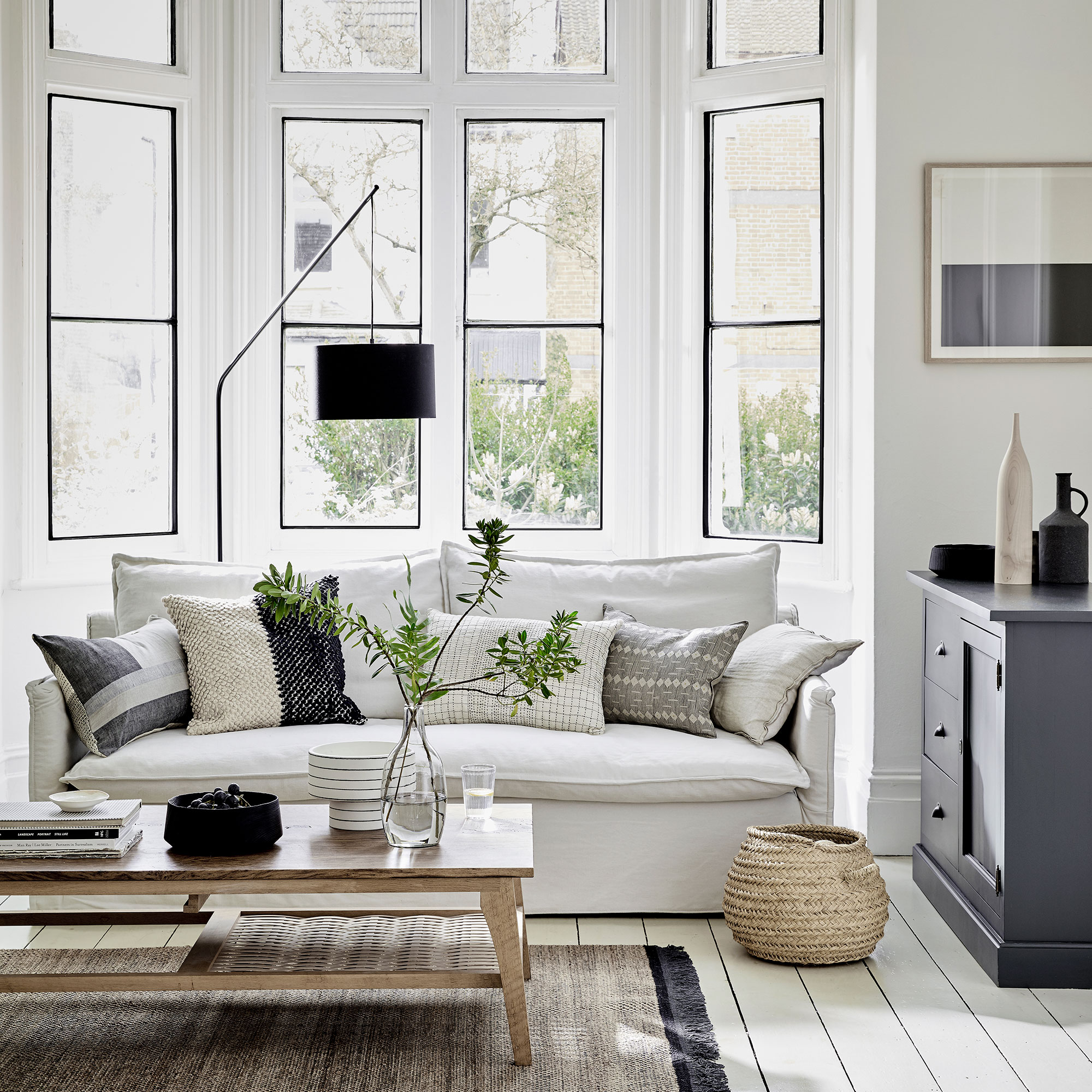
Lighting elements don't always have to shout about their existence. Living room lighting ideas are often thought of as having to include bold pendants and bright shades, but that's not always the case.
Peter Legg of där Lighting Group advises, 'When choosing a lampshade, pick out a colour used in the rest of your interior scheme or choose a complementary colour.'
Choosing a light which melds beautifully with your living room colour schemes, complementing it without distracting. Following commonly used shapes (whether graphically straight or quirkily curvy) will have the same effect.
13. Go for pattern on pattern
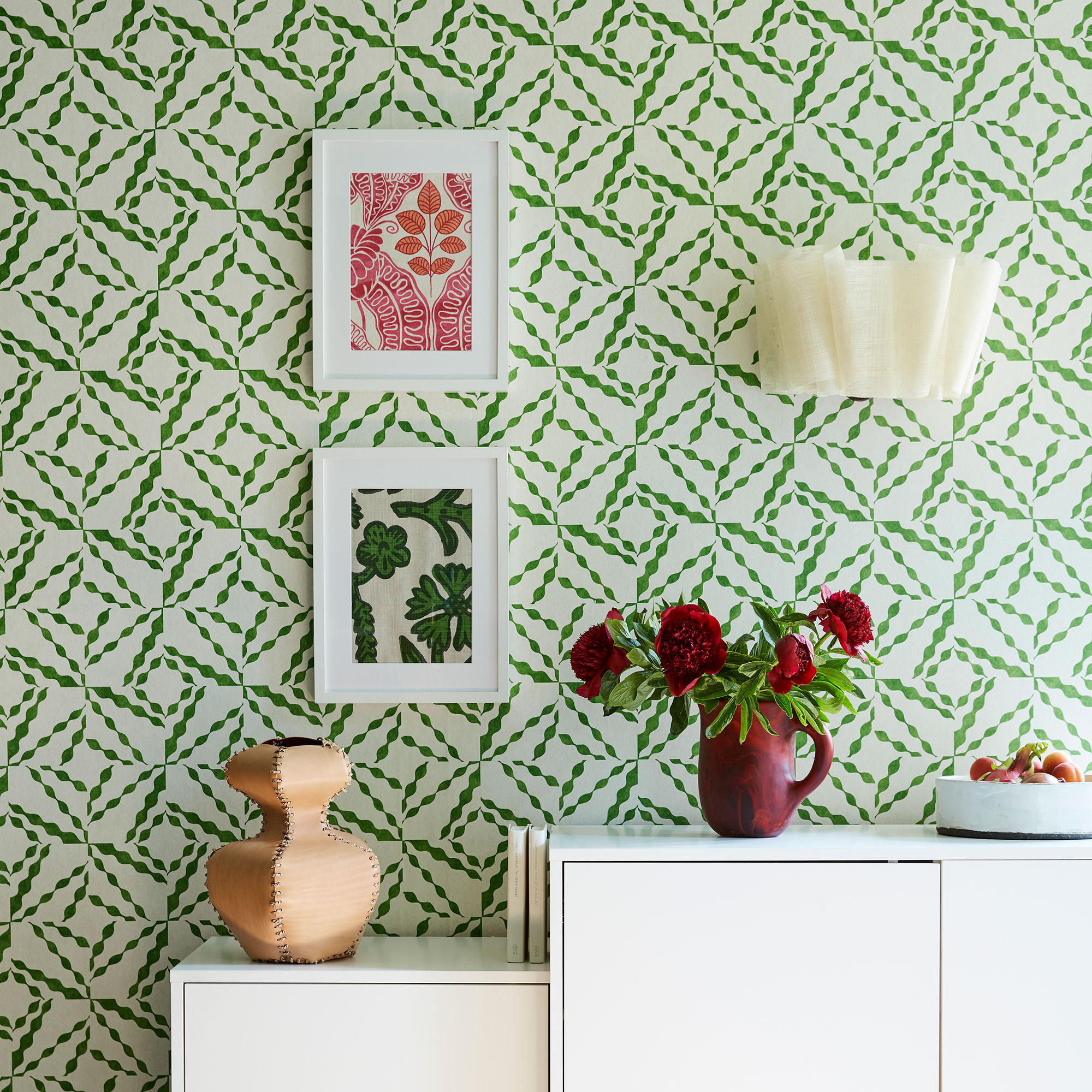
If you have patterned living room wallpaper ideas in your space, it might be tempting to choose a very simple wall light - or eschew them altogether. Instead, take this as an opportunity to create an extra dimension.
A textured wall light can appear to have a pattern of its own, and will look striking against even the busiest of wallpapers. Just make sure that it's a neutral colour as both pattern and colour clashing can be a little overwhelming.
14. Layer your lighting
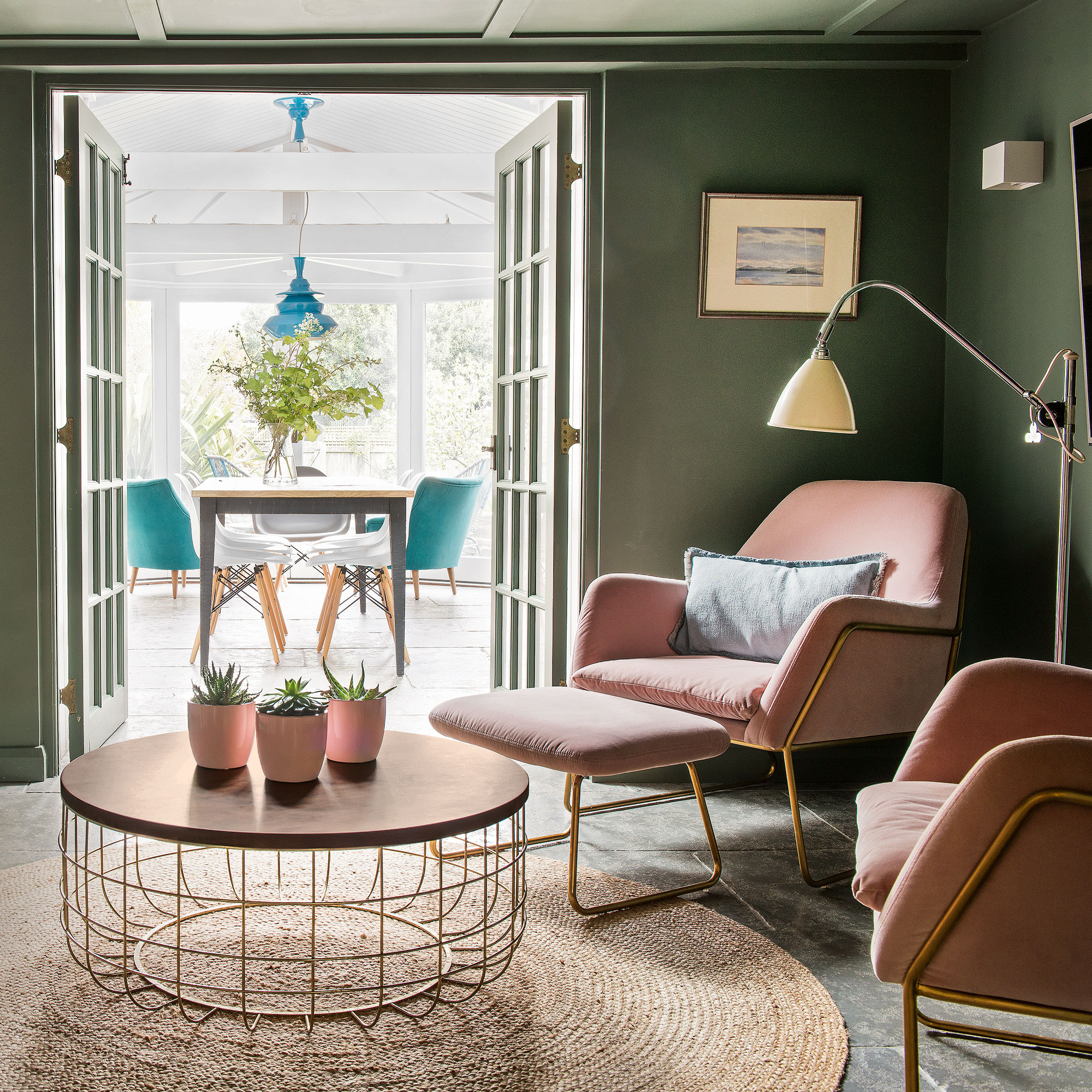
One thing that should never be forgotten with living room lighting ideas is layering. No matter how large or small your space, whether it's ultra modern or quietly country, or if you subscribe to living room trends or not, layering is key to a successful scheme.
‘You can create layers of lighting by having various types of lights and settings for different moods,’ says interior designer Sarah Gare. ‘Try some large lamps on side tables either side of the sofa for a warm glow to watch television or read, while a chandelier in the centre of the room can be quite dramatic, as can architectural lighting around the room.’
Peter Legg from där Lighting Group adds, ‘If you’ve got the room and budget, always think of your centre light as a feature rather than the primary light source, using a dimmer or low-wattage bulbs so it doesn’t overwhelm the rest of your scheme.’
‘The more sources of light you have, the more moods you can create. Clustering a few lamps is a great way to add impact to an alcove or mantlepiece,’ says Rohan from Pooky.
Make sure you account for all your activities and moods. Use an overhead light for blanket brightness, floor lamp and wall lights for ambience, and reading lights for focus time.
15. Choose a sculptural style
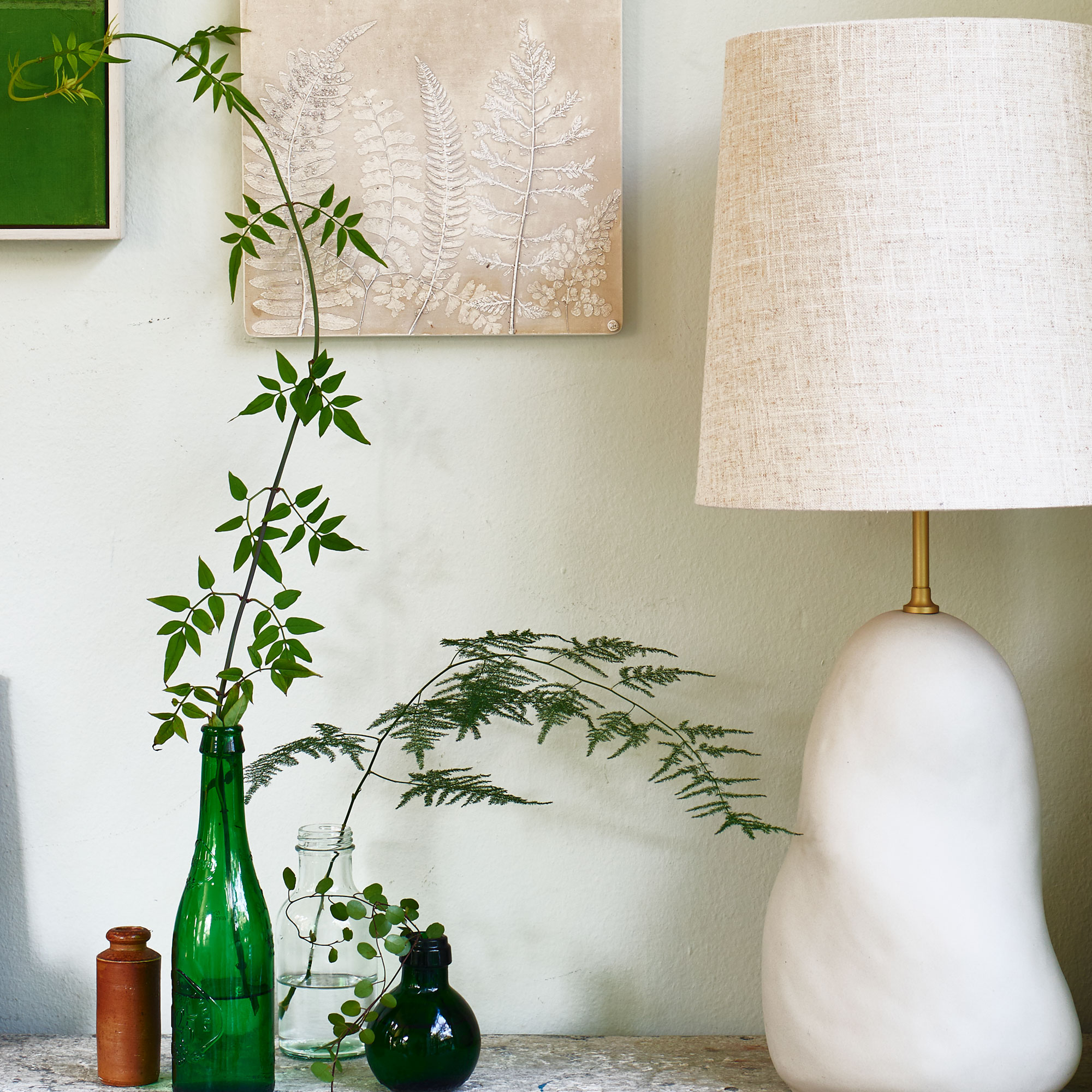
Lighting doesn't just have to be practical – it can be pretty and artistic, too. A beautifully sculptural lamp will add a new dimension to your surfaces, and can become a focal point in and of itself.
Choose an option with shapes or colours which tone in with your other decorative items for a cohesive feel.
16. Add drama with a modern ceiling light
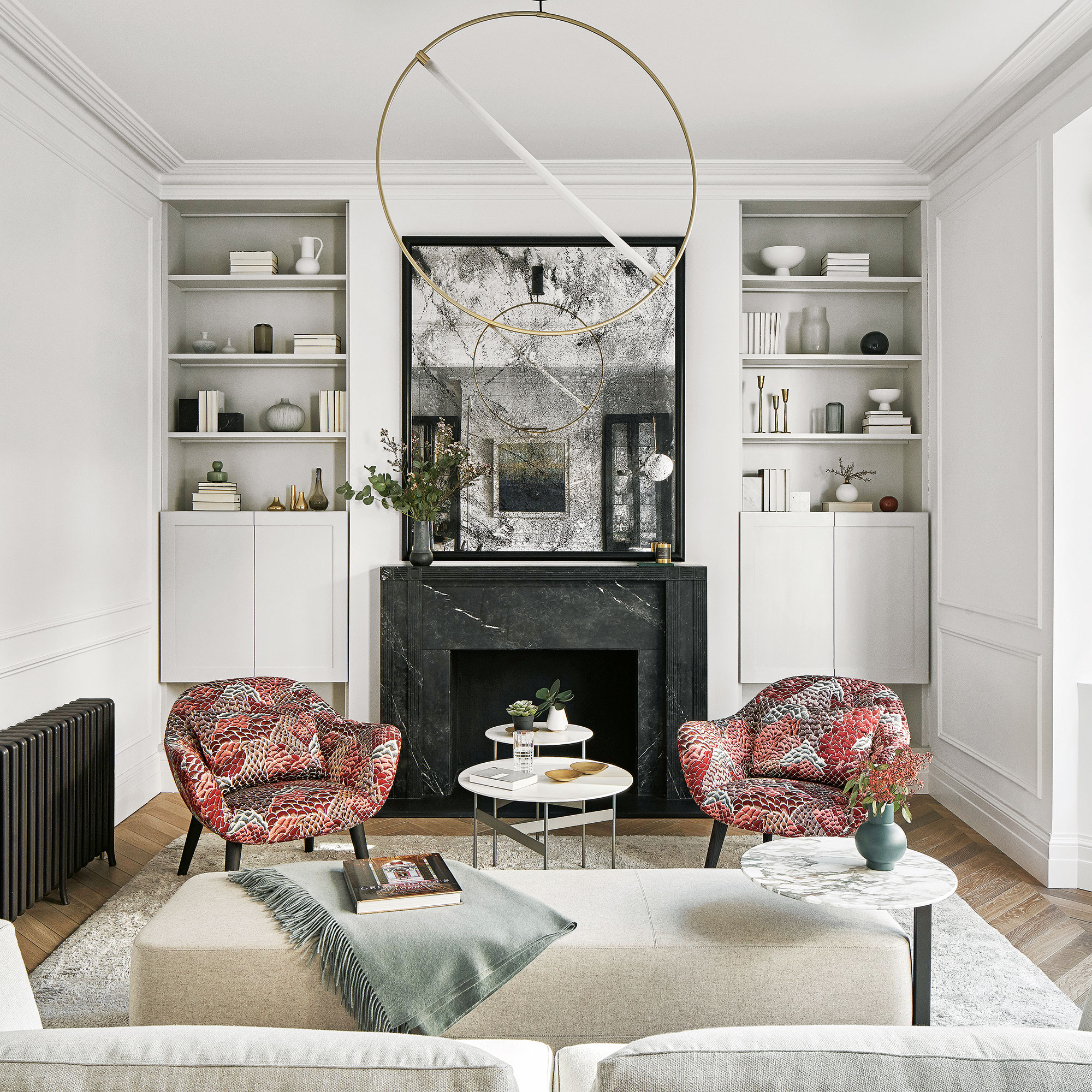
A contemporary ceiling light will add a splash of drama to your space. Look for designs which incorporate brass, opaque glass and sculptural shapes for the utmost interest in modern living room ideas.
Peter Legg from där Lighting Group agrees: ‘For a well-lit living room, I’d have a beautiful crystal central light hanging over a coffee table where no one can bump into it, with table lamps adding layers of light.’
Remember, in this case, bigger can most definitely be better, so have some fun with it.
17. Source a vintage chandelier
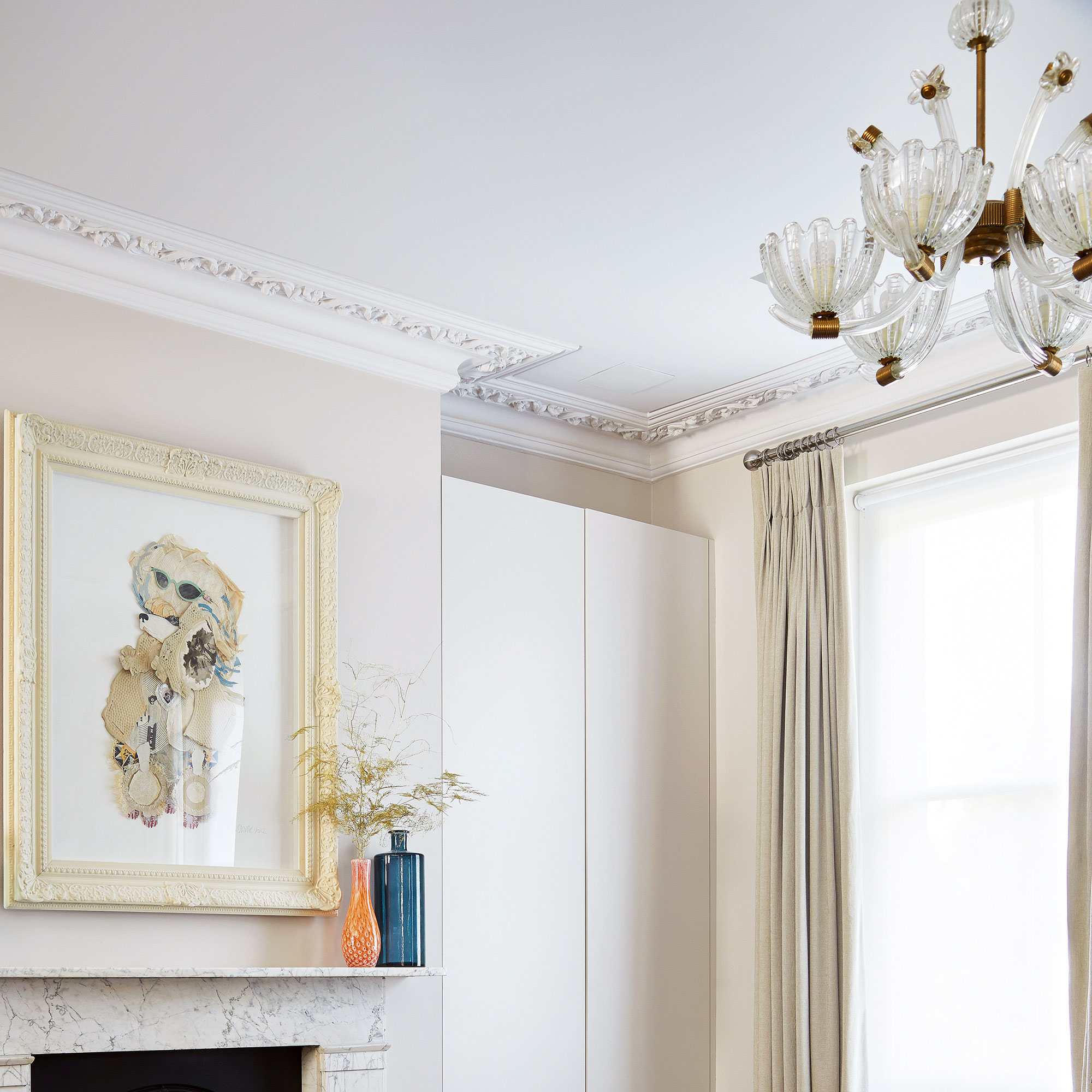
For a unique addition to your living room lighting ideas while being kind to the environment (win win), find a vintage piece.
Look to mid-century living room ideas for inspiration. The softly undulating shapes and use of glass and metal are sure to create a one of a kind feel in your home.
18. Pick the perfect pendant
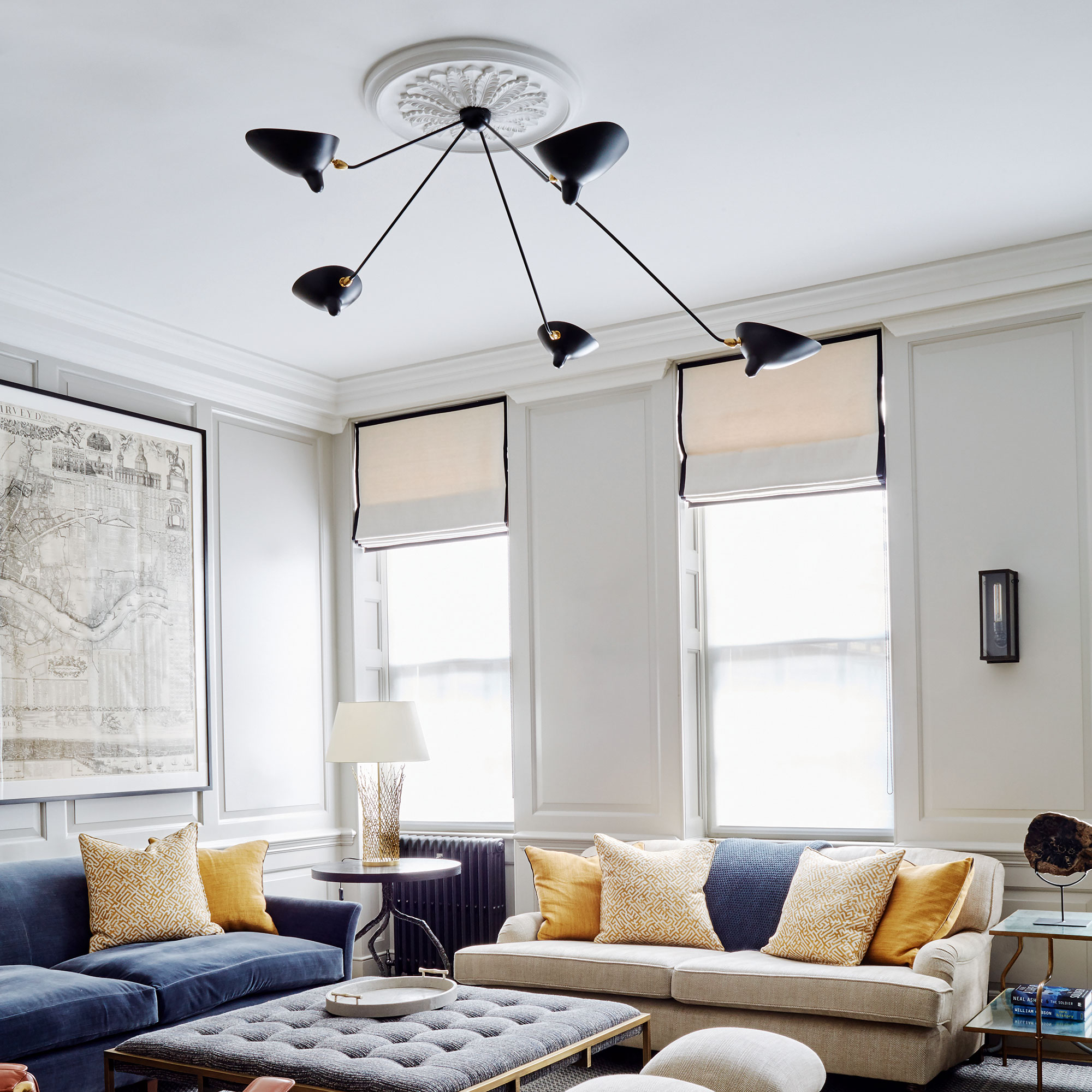
'Investing in a feature ceiling light helps to transform your space in two ways: it draws the eye upwards and opens the space up, and tricks the eye into thinking that the space is bigger than it is,' says Natalie Mann, new product development co-ordinator at Iconic Lights.
'It's not always necessary to opt for an overhead living room lighting ideas,' adds Jo Aynsley, designer director at Jeffreys Interiors. 'But comes down to design preference and how you plan to use the room.'
19. Add on-trend texture with woven pendant shades
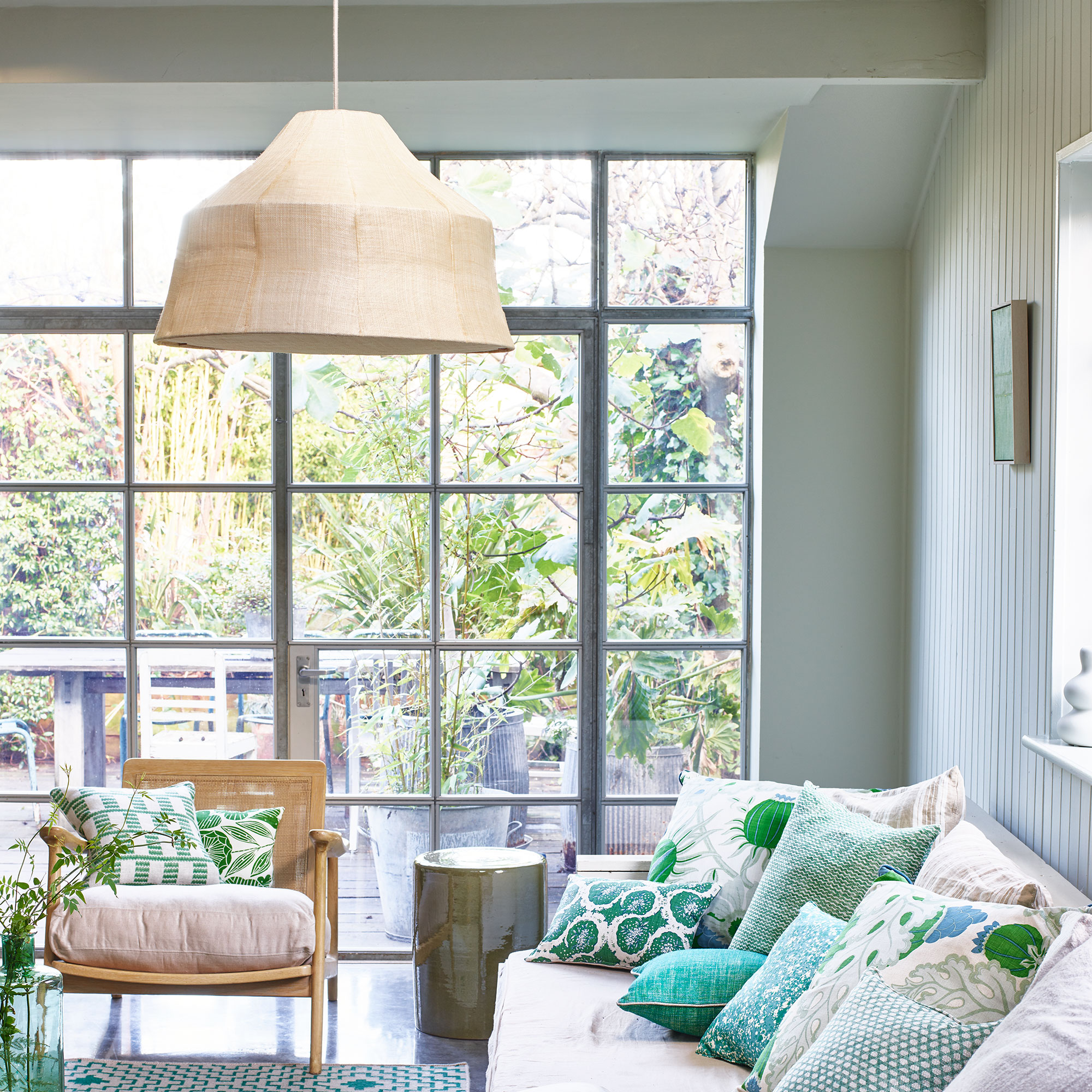
Changing a light shade can be transformative to a rooms decor. Not to mention simple and cost effective.
Natural textures will add a touch of biophilia to the space, helping you to relax to the max. Plus, these type of rustic living room ideas design details look just as striking when the bulbs are switched off.
20. Keep wall lights simple and sophisticated
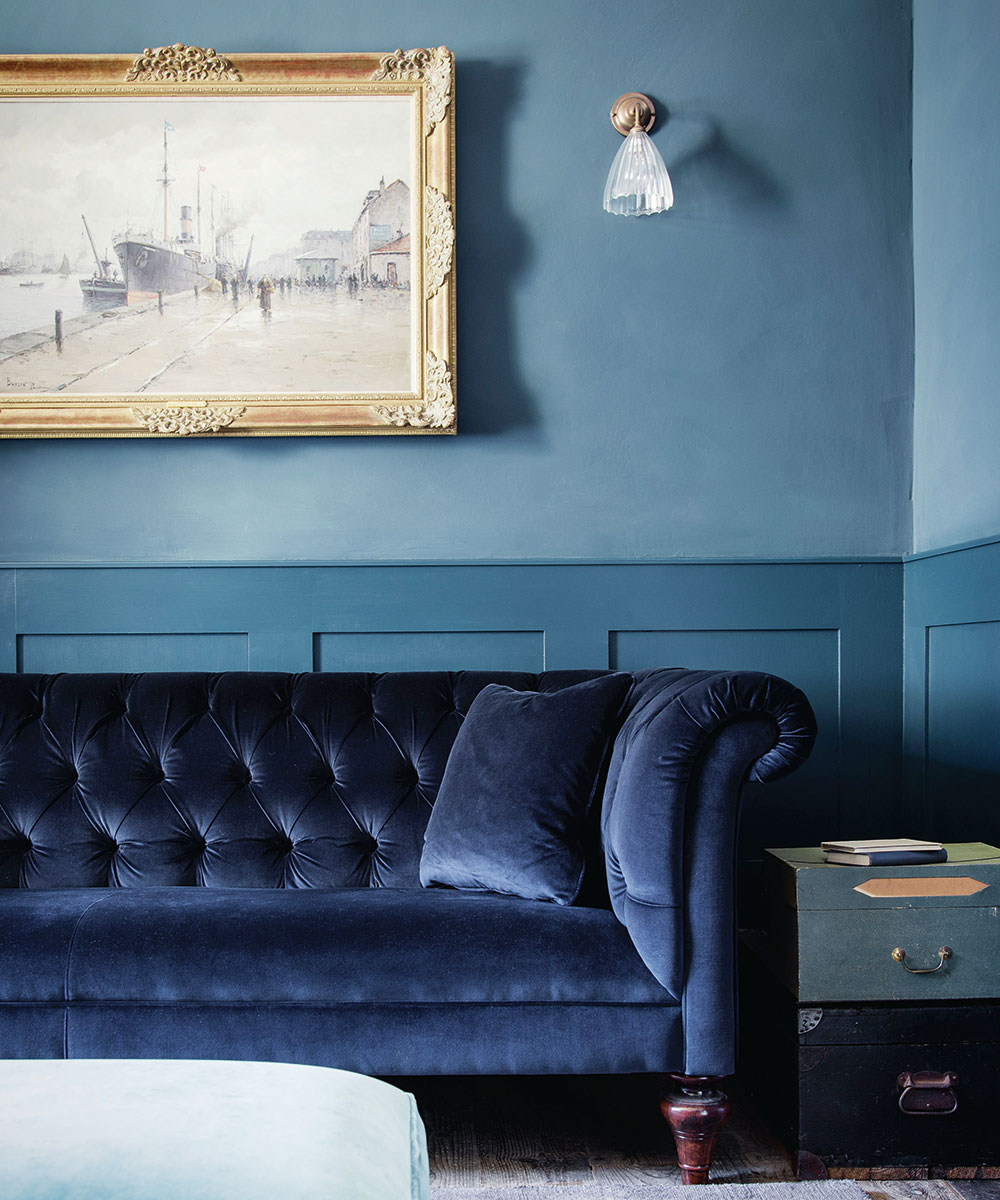
'Wall lights are a great addition to a living room,' says Natalie from Iconic Lights. 'They act as a much softer alternative to an overhead light and add visual interest to the walls.' Keep the design simple and understated for a sophisticated finish.
'Living room wall lighting ideas are great for an ambient tone,' adds Simon from Fritz Fryer. 'They create a low level of light and bring out features in a room. It's all about balancing the layers.'
21. Mix uplighting and downlighting
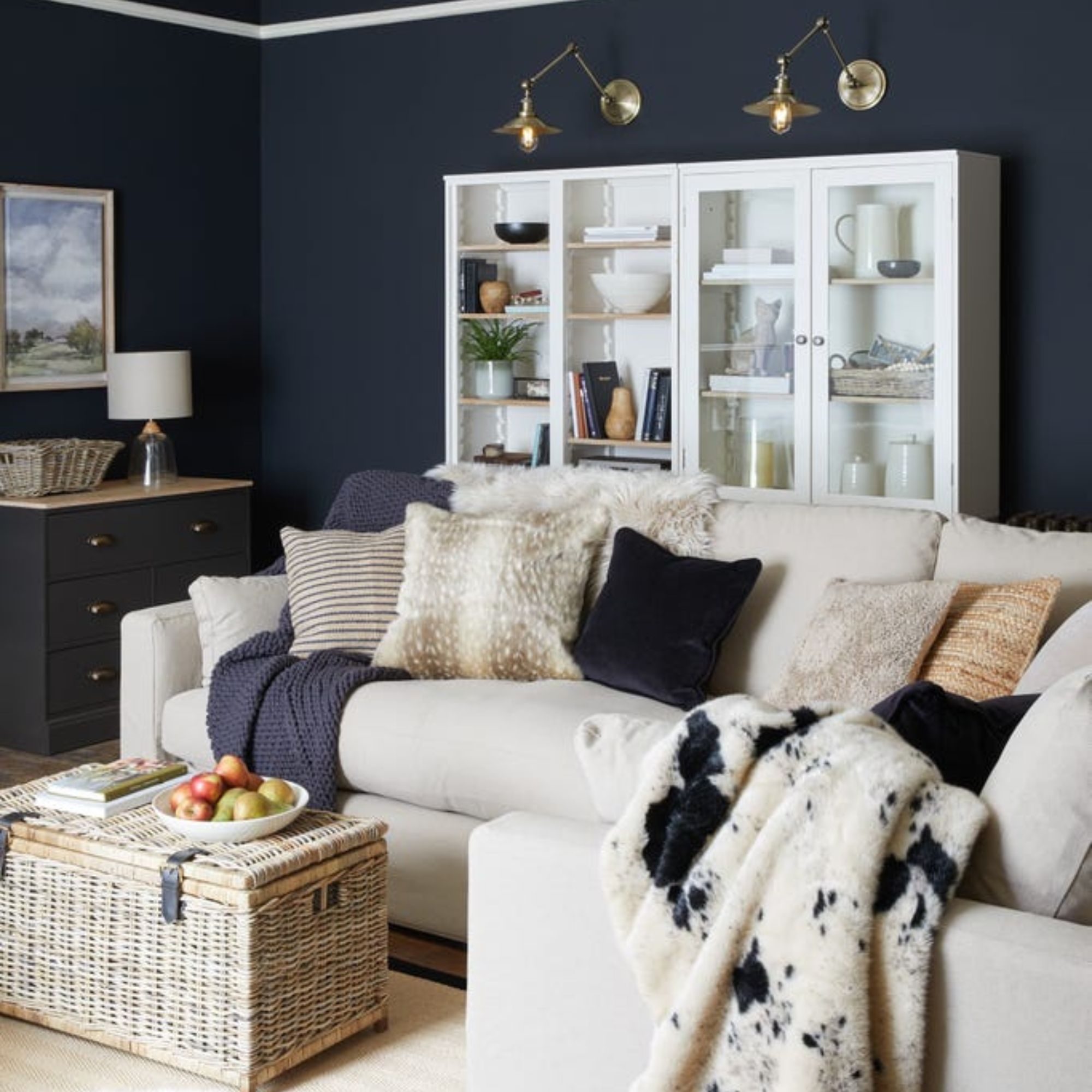
Wall lights are a popular choice for living rooms, but do you opt for uplights or downlights? Well, we’d always suggest using a mixture of both in different areas of the room.
That’s because too many downlights can often make a room feel cold and small, while too many uplights can make a room feel too dark and impersonal. Mixing the two together can create a layering effect that lights up a living room perfectly. It’s important to choose the right bulbs for these wall lights, though.
‘To achieve a wonderful golden glow that's bright without being too harsh, choose bulbs with a colour temperature between 2700K and 3000K. If your existing lights are dimmable, we also recommend turning them to low for an instant infusion of cosiness,’ explains Francesca Hadland, interiors manager for Bridgman.
22. Lean into a theme
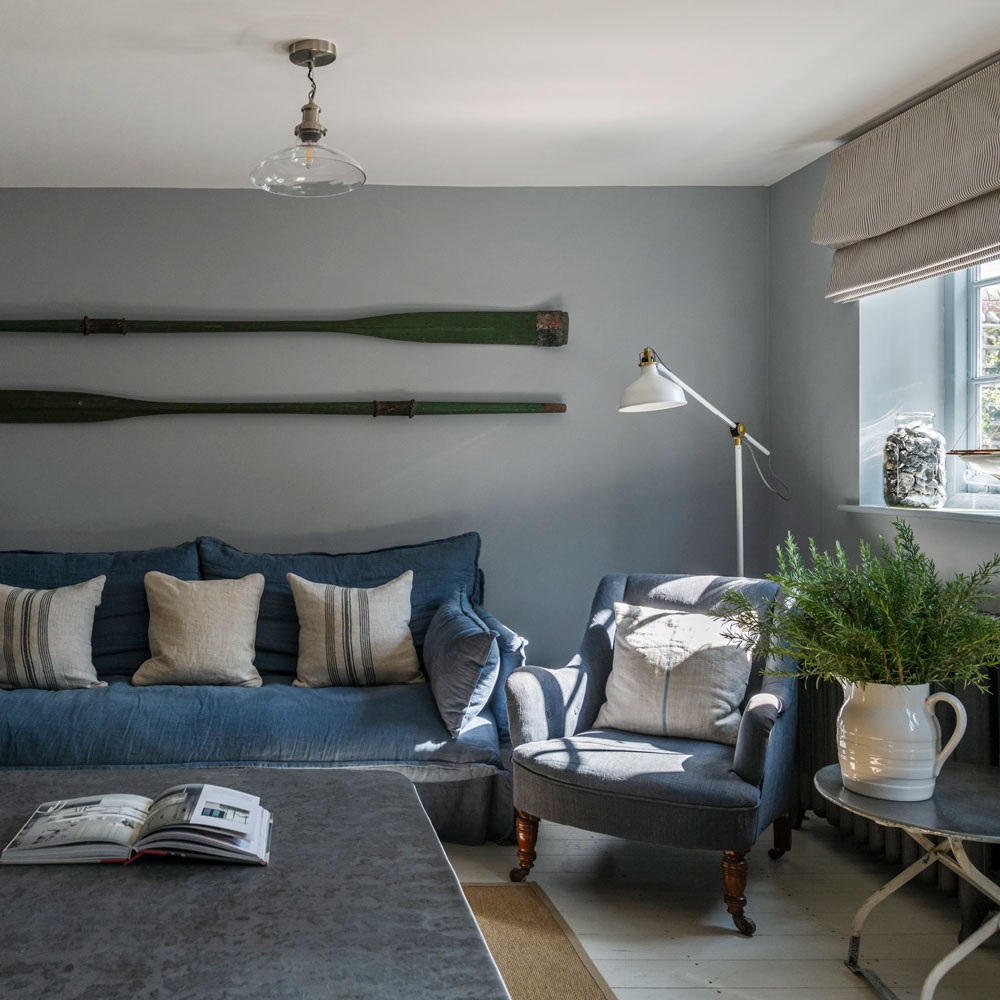
The best way to make all your living room lights blend seamlessly, without being too matchy-matchy is by coordinating a theme. For coastal living room ideas, for example, you might want to combine enamel shades with traditional glass Fishermans pendants.
By using a combination of materials and shapes, you'll create a more relaxed, organic vibe in the room. Less show home and more authentically collected.
23. Zone open-plan layouts
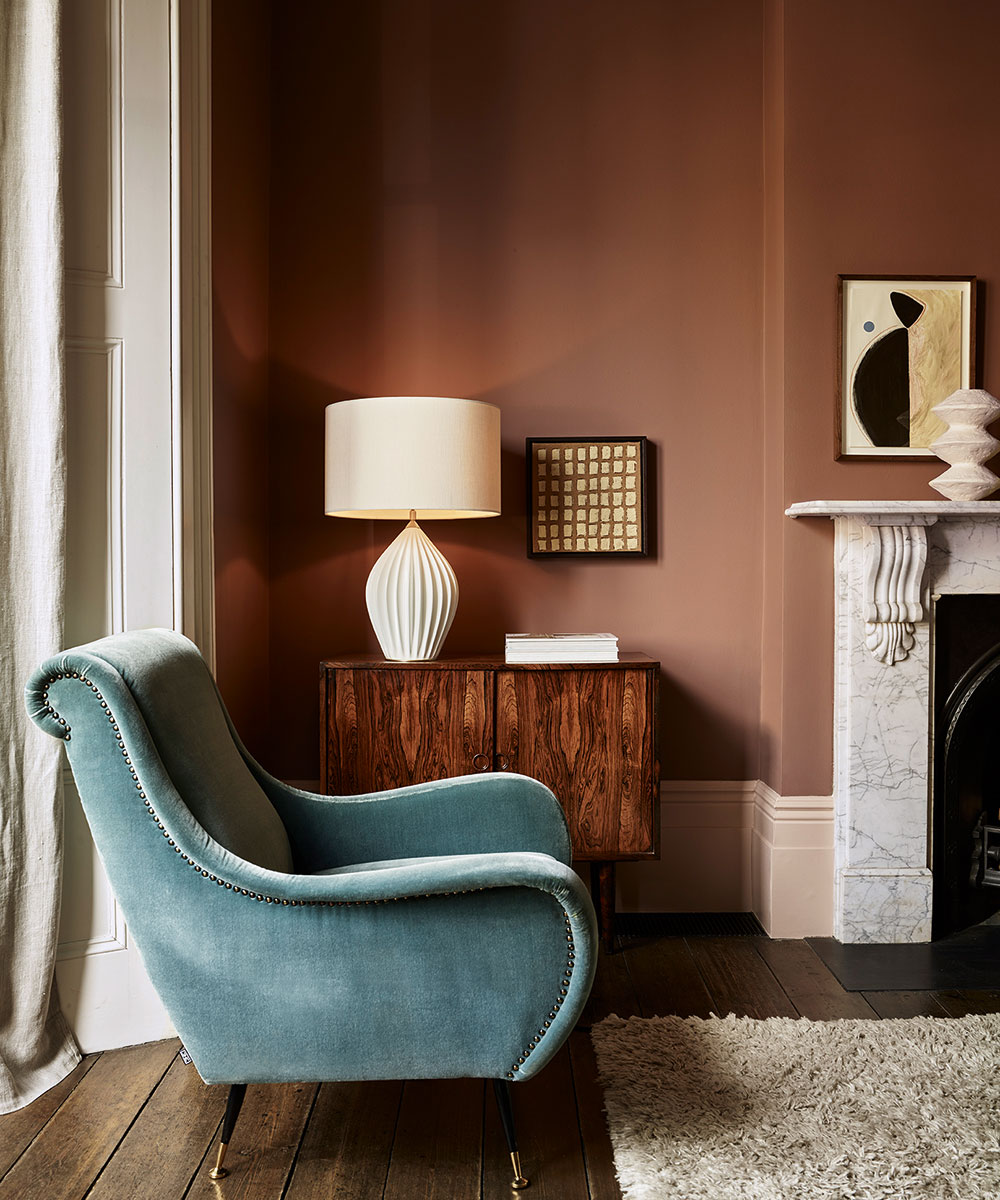
'By creating light and shade areas, you can have cosier spaces within open-plan living room ideas,' says Simon from Fritz Fryer. 'Mix up the layers of light, highlight architectural features with accent lighting and don't over-light ares that don't need illuminating.'
'Look at your room and decide where function lighting is needed and mood lighting is required,' adds Natalie from Iconic Lights. 'There'll be some crossover between the two, so dimmer switches will give flexibility to switch between function and mood lighting.'
24. Mismatch lamp shades
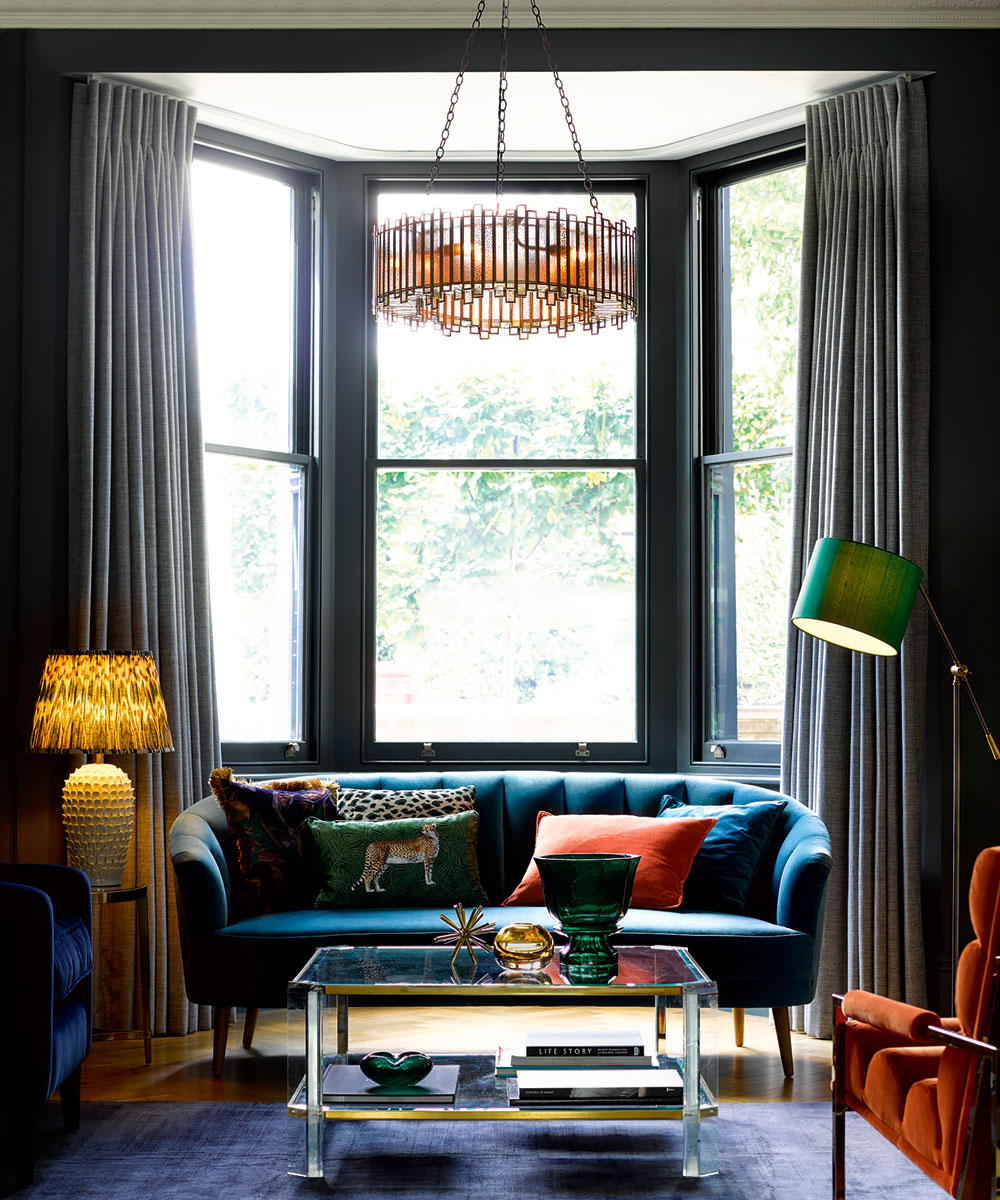
Do all lamp shades in a room have to match? 'No,' says Jo from Jeffreys Interiors. 'Unless they are a matching pair. For wall lights though, it's best to match.'
'It's important to work out what kind of living room lighting ideas you want,' adds Natalie from Iconic Lights. 'The weight and colour of the shade will impact the amount and tone of light emitted. If you want brightness, consider mesh shades or glass. Or dispense with shades and go for exposed bulbs, Edison-style.'
25. Illuminate dark corners
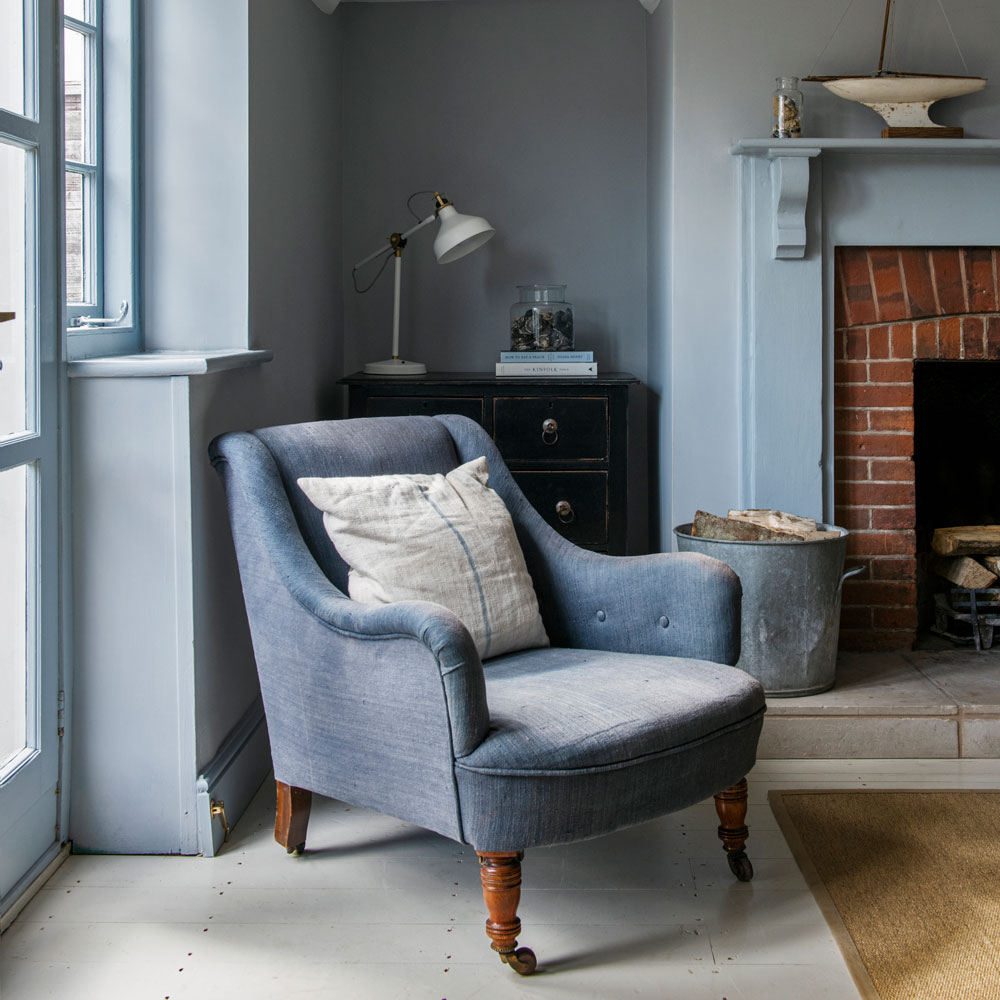
If you have a dark corner, such as an alcove beside your fireplace ideas, a lamp can prove invaluable. This helps to illuminate the space, to make the room feel bigger and add depth. It can also help to make it feel more characterful after dark, as the shadows play with the space to create interest in contrast to the light bouncing directly off a flat wall.
You can chose to direct the light slightly more into the alcove, as opposed to shining it directly outwards – as desired.
26. Mimic natural light with wall lights
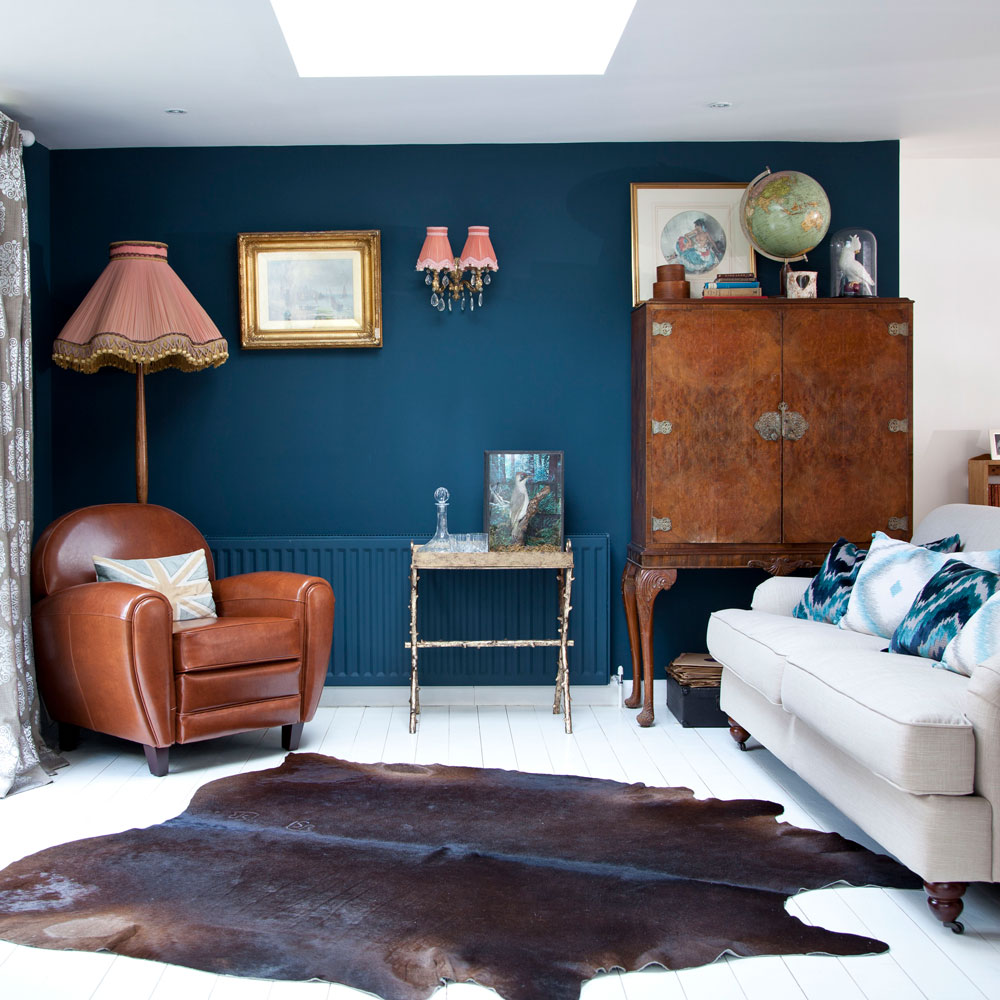
Placement is an all important factor when it comes to lighting, for any room. We tend to use living rooms throughout the day, so mimicking the natural light with well-placed lighting options is a good idea.
If you have skylights in your living room, place the wall lights directly beneath. Once dark outside these will help replace the lost light, giving the room a consistent brightness
27. Play with scale
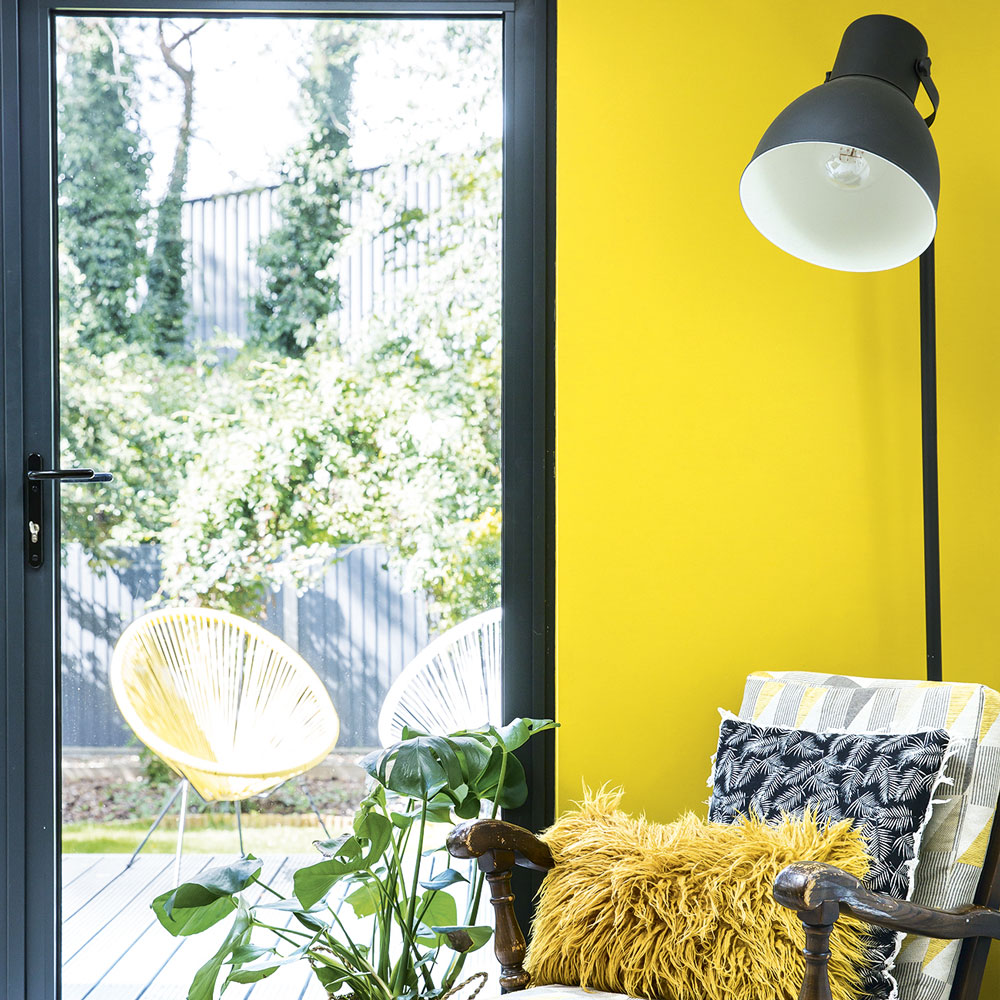
'Think about the size of the room and scale of chosen design' advises Suzy McMahon, buying director at Sofology. 'The addition of a large floor lamp can draw the eye, adding personality and making a statement.'
'However, for small living room ideas, consider floor lamps with slim bases that won’t take up too much space; these also offer a way to light darker corners and hallways without being imposing.'
28. Bring symmetry with matching table lamps
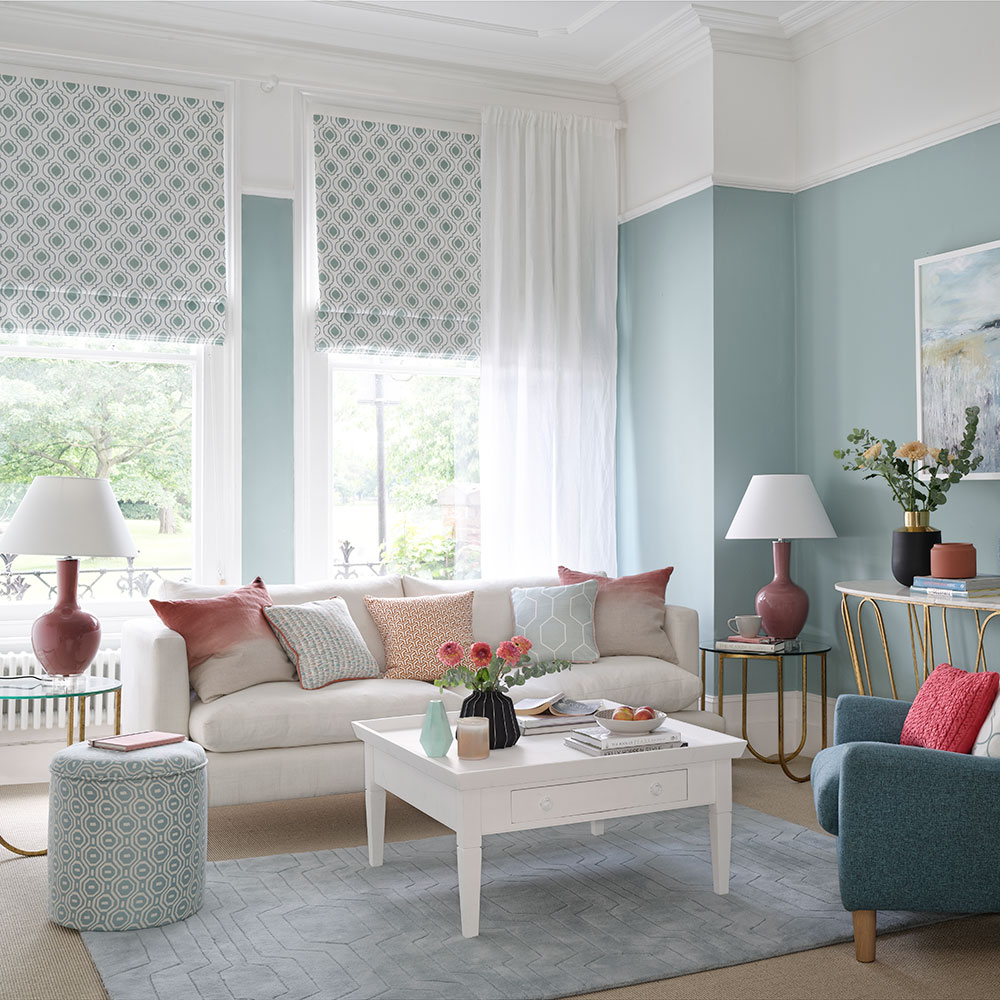
Take a tip from the interior designers and double up for a more professional, put-together look for with your living room lighting ideas. Two identical table lamps used either side of the sofa can really anchor a scheme, especially when set on matching tables.
29. Mix-and-match lampshades and bases
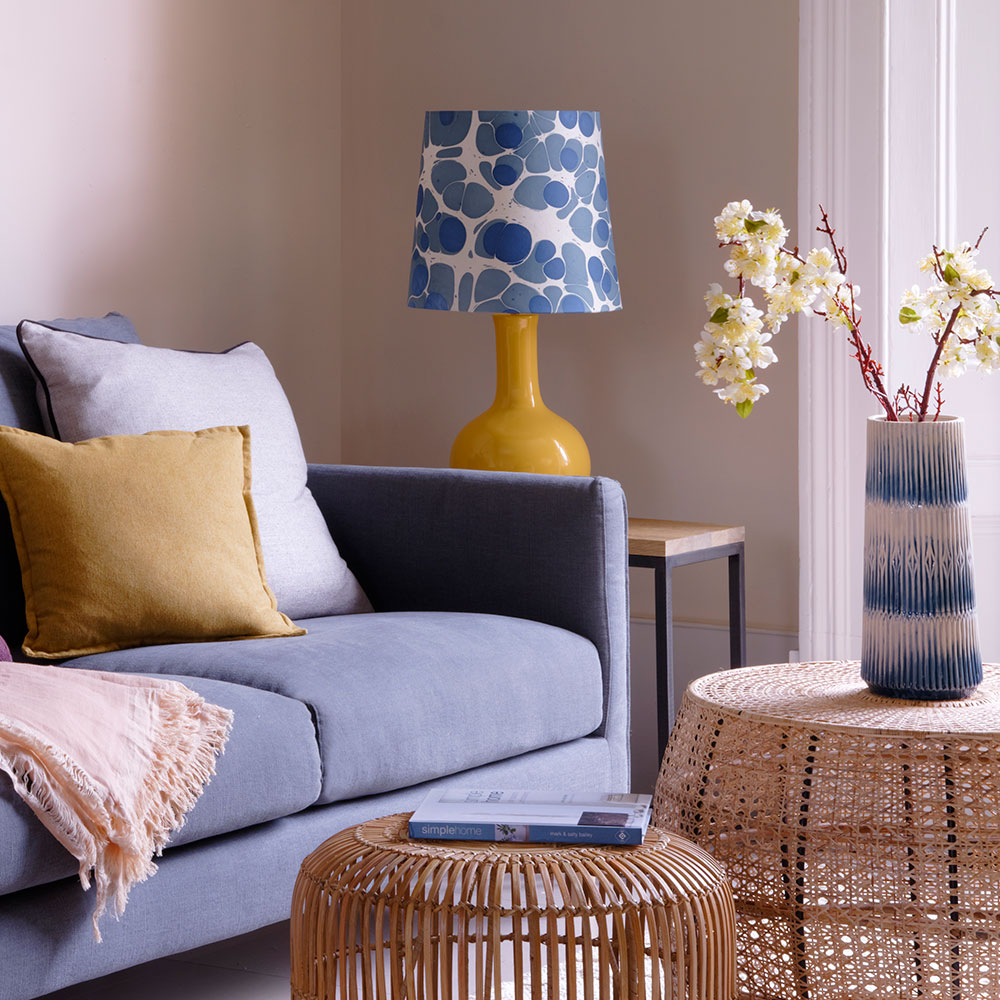
The right table lamp can brighten up a room even when it's turned off. The trick here is to mix pattern with block colour and to take two contrasting colours to come up with a combo that really pops.
It's an easy but effective way of creating interest with small living room lighting ideas.
30. Co-ordinate with your furniture
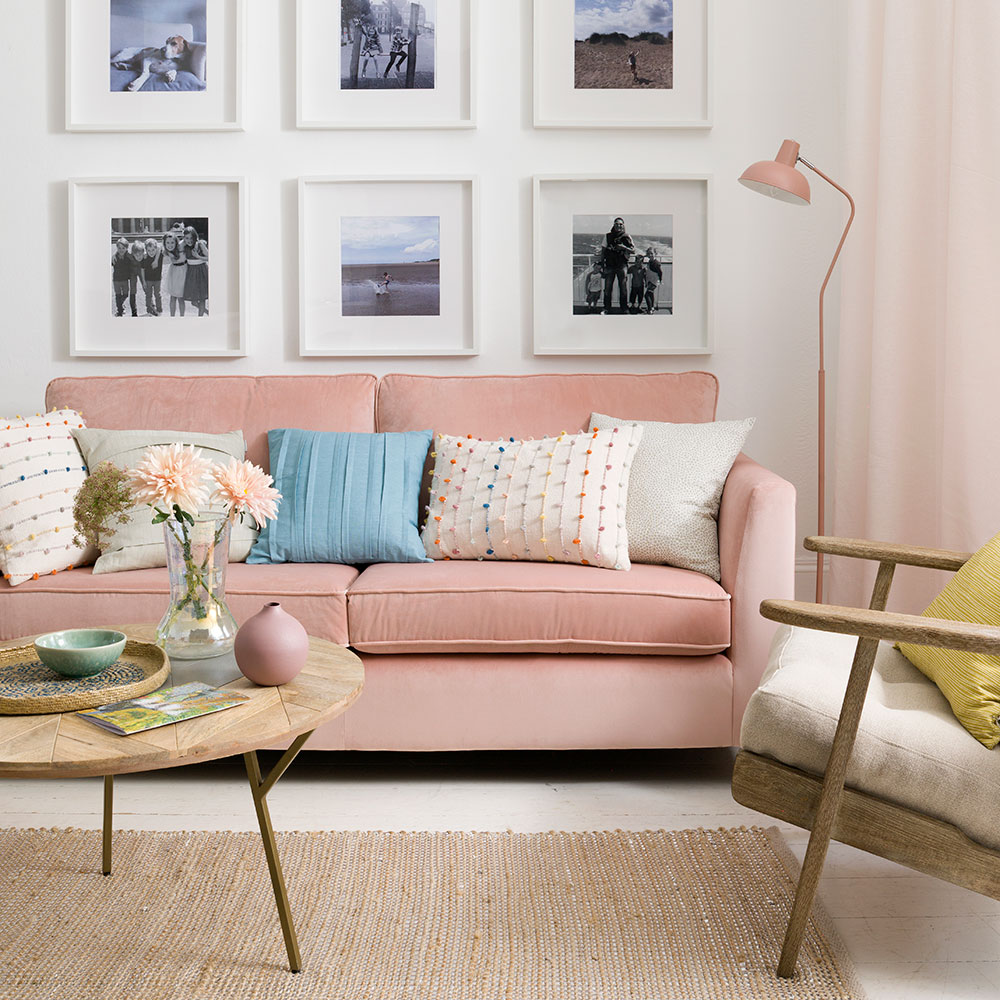
For a truly cohesive and considered feel, work your living room lighting ideas in with your furniture choices. Choose a light in a colour to match a hero piece in your space, such as the sofa or a statement ottoman.
31. Add adjustable wall lighting
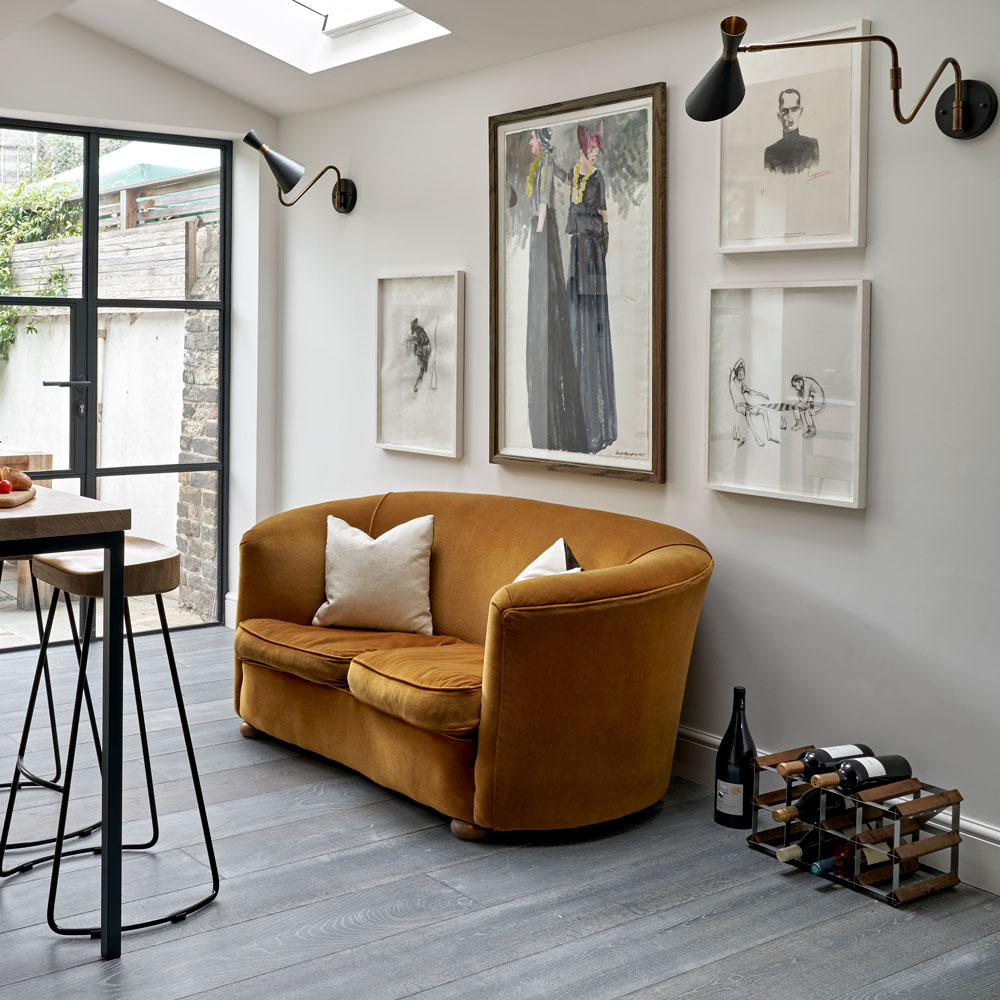
Wall lighting provide the perfect way to create a more directional approach with fixed lighting. Choosing living room lighting ideas that sit on the wall with adjustable rams allows you to concentrate pools of light exactly where you want them to shine, a great characteristic in open-plan living spaces.
Since you'll likely want at least two of those, it's a good idea to check out what home decor discount codes are active to gain savings on what could otherwise be an expensive addition to your space.
32. Introduce natural light with skylights
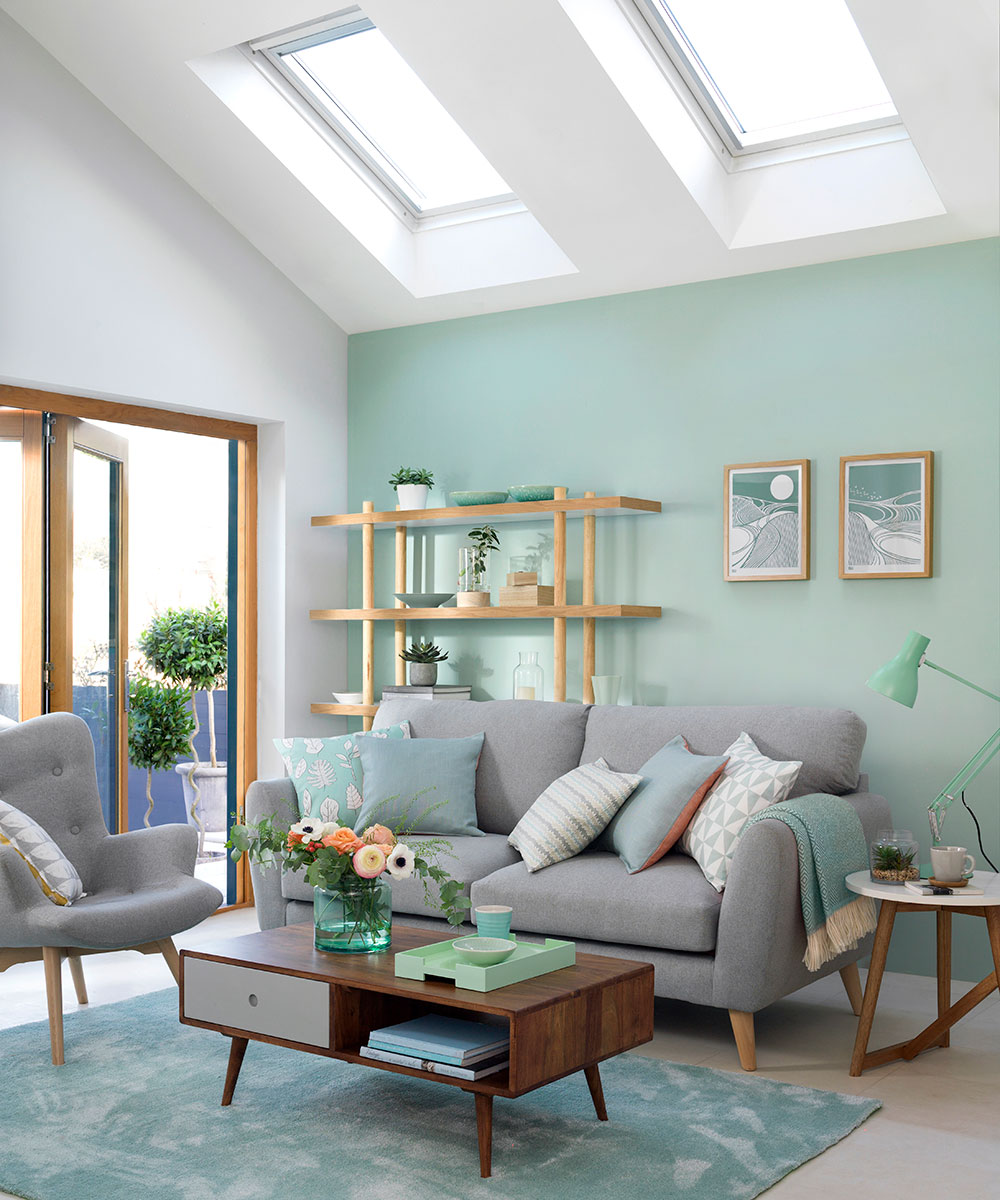
You might think adding roof lights is a huge structural undertaking, but it can be surprisingly easy – especially if you only opt to add one or two. However, the transformation will be instant and dramatic. Velux is a good place to start your research – and if you'd prefer a larger roof lantern, try Apropos.
'Getting the balance right between natural living room lighting ideas and fitted lamps can be tricky, so think about what exactly you need,' adds Natalie from Iconic Lights.
33. Make a grown-up display of string lights
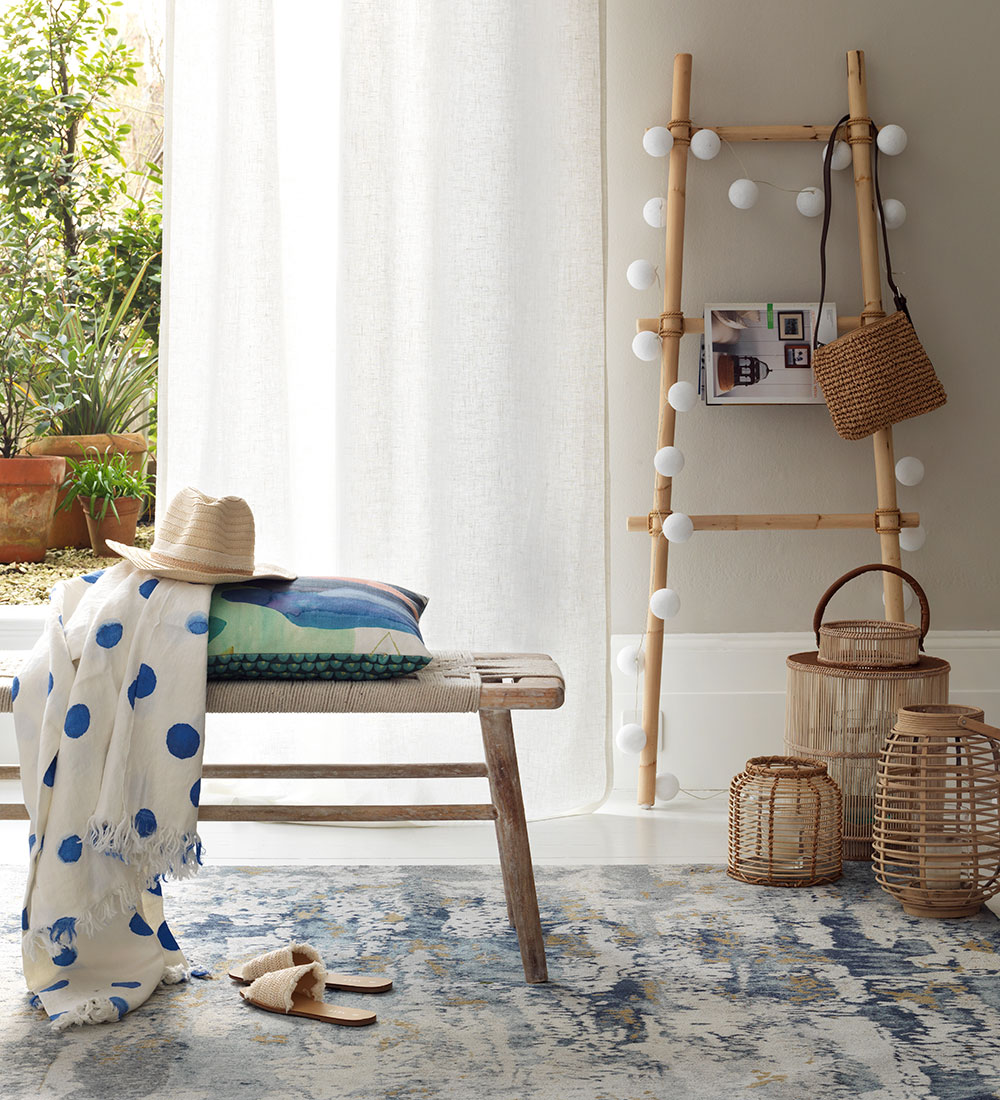
Fairy lights don't have to be exclusive to Christmas trees and kids' rooms. Pick the right design and they can be used tastefully to light up a dark corner for budget living room ideas.
Cotton ball string lights are ideal – provided you stick to tones like white, taupe or soft grey, you're on to a style winner.
FAQs
What are the main types of living room lighting?
'There are three distinct types of lighting; task, ambient and accent,' explains Simon from Fritz Fryer. 'It will help you to choose the correct lighting if you understand the difference between these.
'Task lighting, such as desk lights or spotlights, has a practical purpose. ambient lighting like wall lights, table and floor lamps, and dimmable ceiling lights creates constant lighting. Accent lighting captures features, creates drama or alters atmosphere.'
'The best schemes include multiple layers of lighting, all doing their bit to create desired levels of illumination and flexibility.'
How do I choose a light for my living room?
When working out how to design a living room, lighting should be central to your plans. The style is up to you and your personal tastes, but there are some rules of thumb to help guide you along.
'Choosing living room lighting ideas and designs with mixed materials such as metal and glass adds texture whilst keeping the look contemporary,' advises Suzy from Sofology. 'Although it's not necessary to match a light's materials to other pieces in the room, it's worth opting for styles that complement each other for a cohesive décor scheme.'
'For example, if your wallpaper features a lot of green, selecting a lampshade in a similar colour will tie the look together.'
‘We love it when people consider how lights will look when they are off,’ says Peter from där Lighting. ‘Lights spend half of their time off, so really think about your choice of main centre light, choosing a design with interest.’
Rohan from Pooky loves to see ‘pops of colour, vibrant patterns and fun textures.’ He adds, ‘A printed lampshade, bold base or quirky pendant is a great way to portray a sense of your own personality and character.’
Interior designer Sarah Gare likes to mix and match styles; ‘Again, this depends on the look you want to create, with matching fittings giving a more tailored feel. If you plan on mixing or matching and the chandelier you have chosen does not match the wall lights, then link them to something else in the room. For example, if the wall lights have purple shades, it links them to some purple cushions on the sofa,’ she shares.
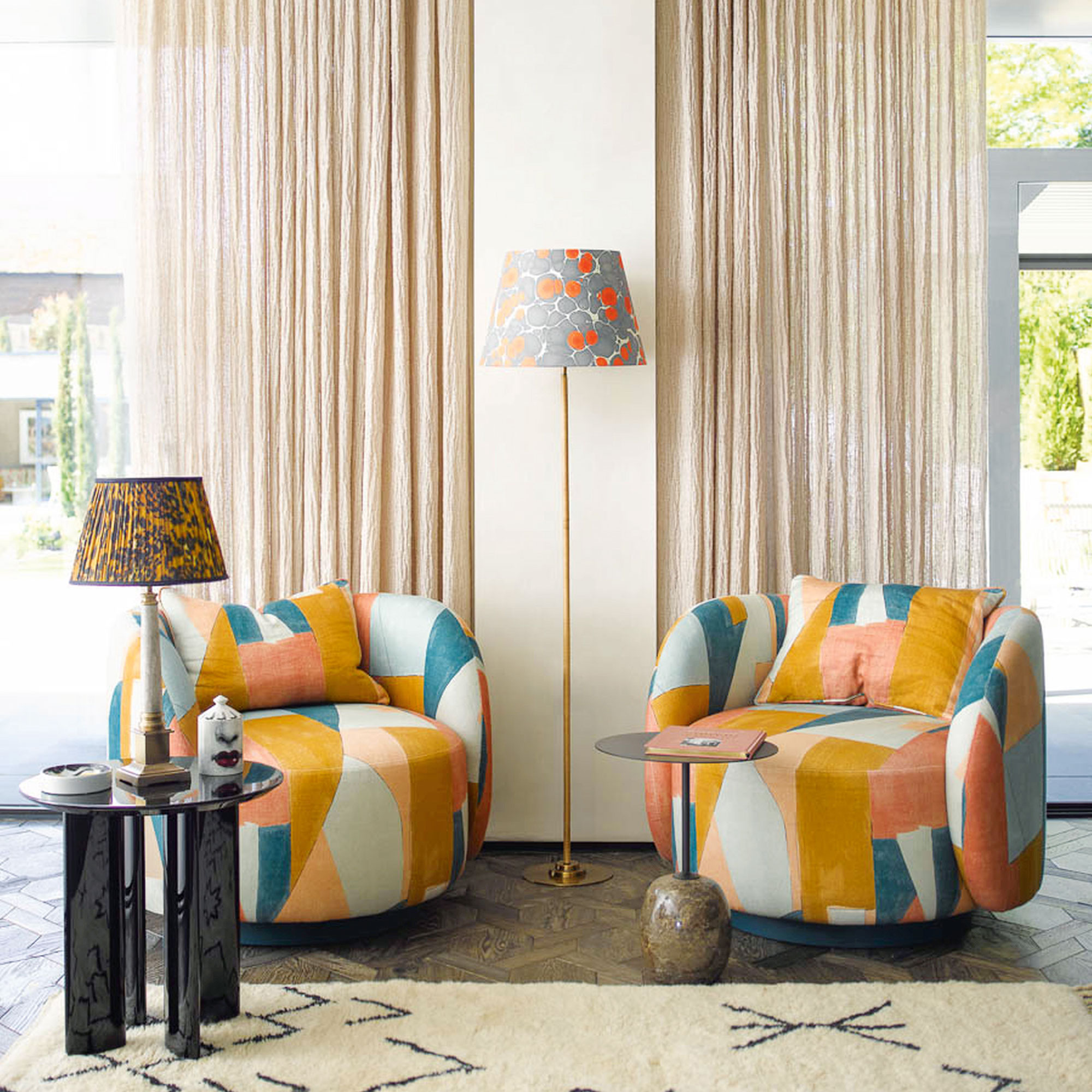
How do I get mood lighting in my living room?
'Whether they're wall-mounted dimmable switches or touch lamps with three settings, being able to dim your lights or make them brighter makes for a comprehensive set up,' advises Natalie from Iconic Lights
It's about being flexible, explains Simon from Fritz Fryer. 'Warming up the colour temperature of a light will add depth and create cosy living room ideas. Whereas a cooler light temperature will bring energy levels back up in the room.'
'Successful schemes include lots of layers and the flexibility to individually control each layer, by either dimming or turning on and off.'
‘The more sources of light you have,' explains Rohan from Pooky, 'the more moods you can create. Clustering a few lamps is a great way to add impact to an alcove or mantlepiece. Colour or patterned shades can also be used to influence mood and introduce some joy into your interiors,' adds Rohan.
Now you have all the necessary tools to create a cosy and stylish living room with the help of lamps and light fixtures. Happy light decorating!

Thea Babington-Stitt is the Managing Editor for Ideal Home. Thea has been working across some of the UK’s leading interiors titles since 2016.
She started working on these magazines and websites after graduating from City University London with a Masters in Magazine Journalism. Before moving to Ideal Home, Thea was News and Features Editor at Homes & Gardens, LivingEtc and Country Homes & Interiors. In addition to her role at Ideal Home, Thea is studying for a diploma in interior design with The Interior Design Institute.
- Sara HesikovaContent Editor
- Ginevra BenedettiDeputy Editor (Print)
- Lauren BradburyContent Editor (House Manual)
- Holly WalshContributor
You must confirm your public display name before commenting
Please logout and then login again, you will then be prompted to enter your display name.
-
 Aldi is selling a robot lawn mower for under £200 - it's one of the cheapest on the market
Aldi is selling a robot lawn mower for under £200 - it's one of the cheapest on the marketI never thought I'd see 'Aldi' and 'robot mower' in the same sentence...
By Kezia Reynolds
-
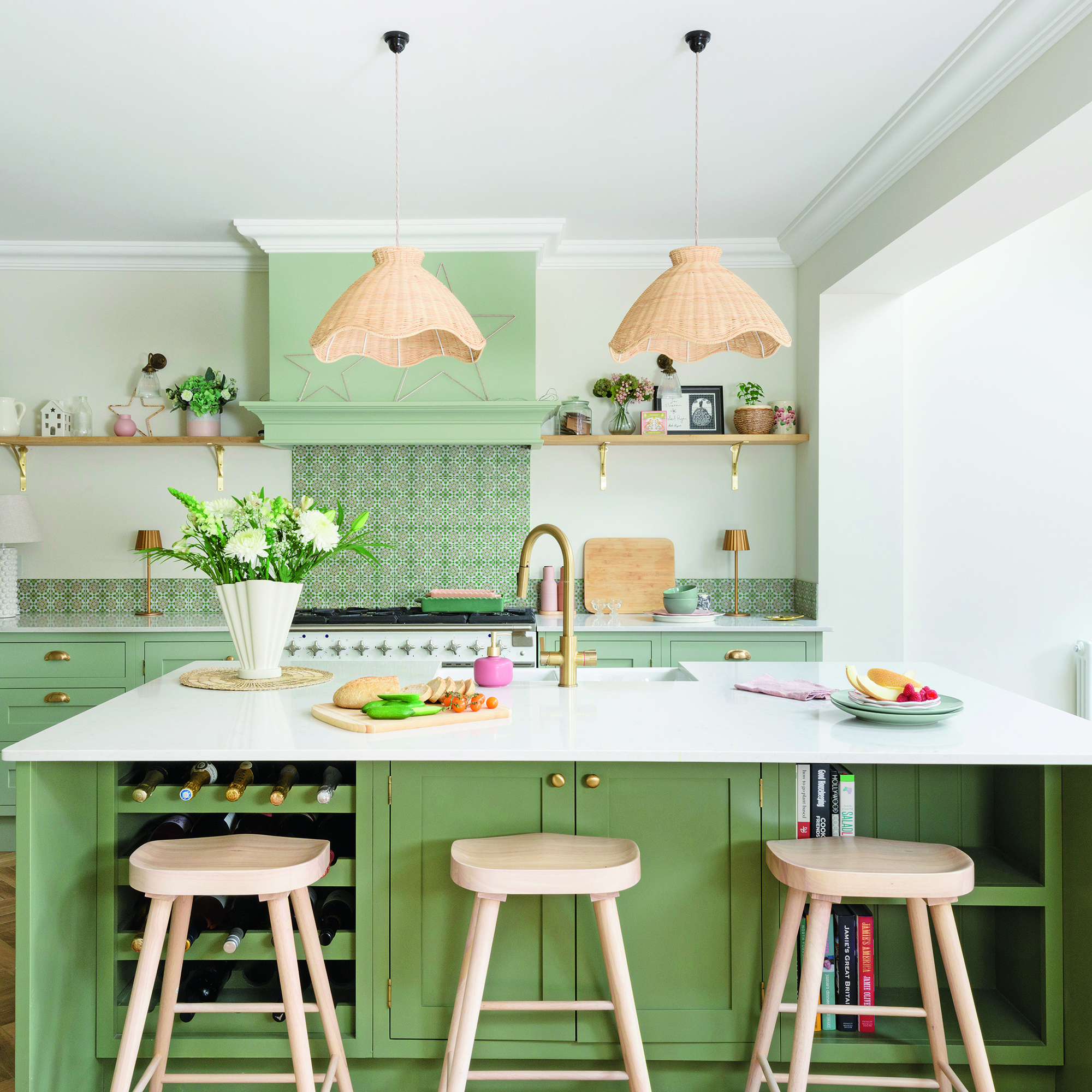 Hot water taps are the best way to level up your kitchen island in 2025 - these kitchen experts explain why you need one
Hot water taps are the best way to level up your kitchen island in 2025 - these kitchen experts explain why you need oneI asked kitchen experts exactly how you can add one to your island retrospectively
By Natasha Brinsmead
-
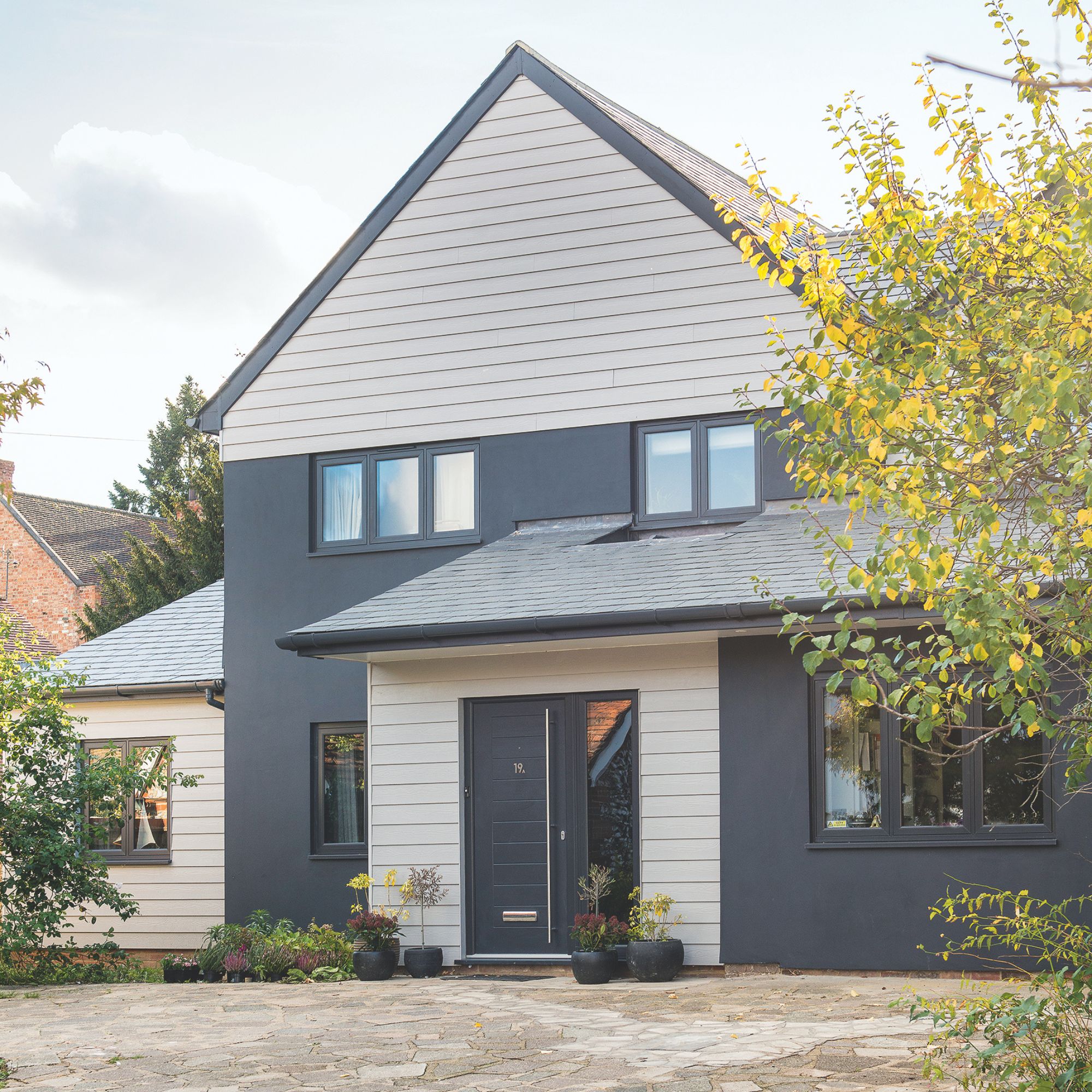 Is triple glazing worth it?
Is triple glazing worth it?Experts explain when the added cost is worthwhile, and when it isn’t
By Sarah Handley
-
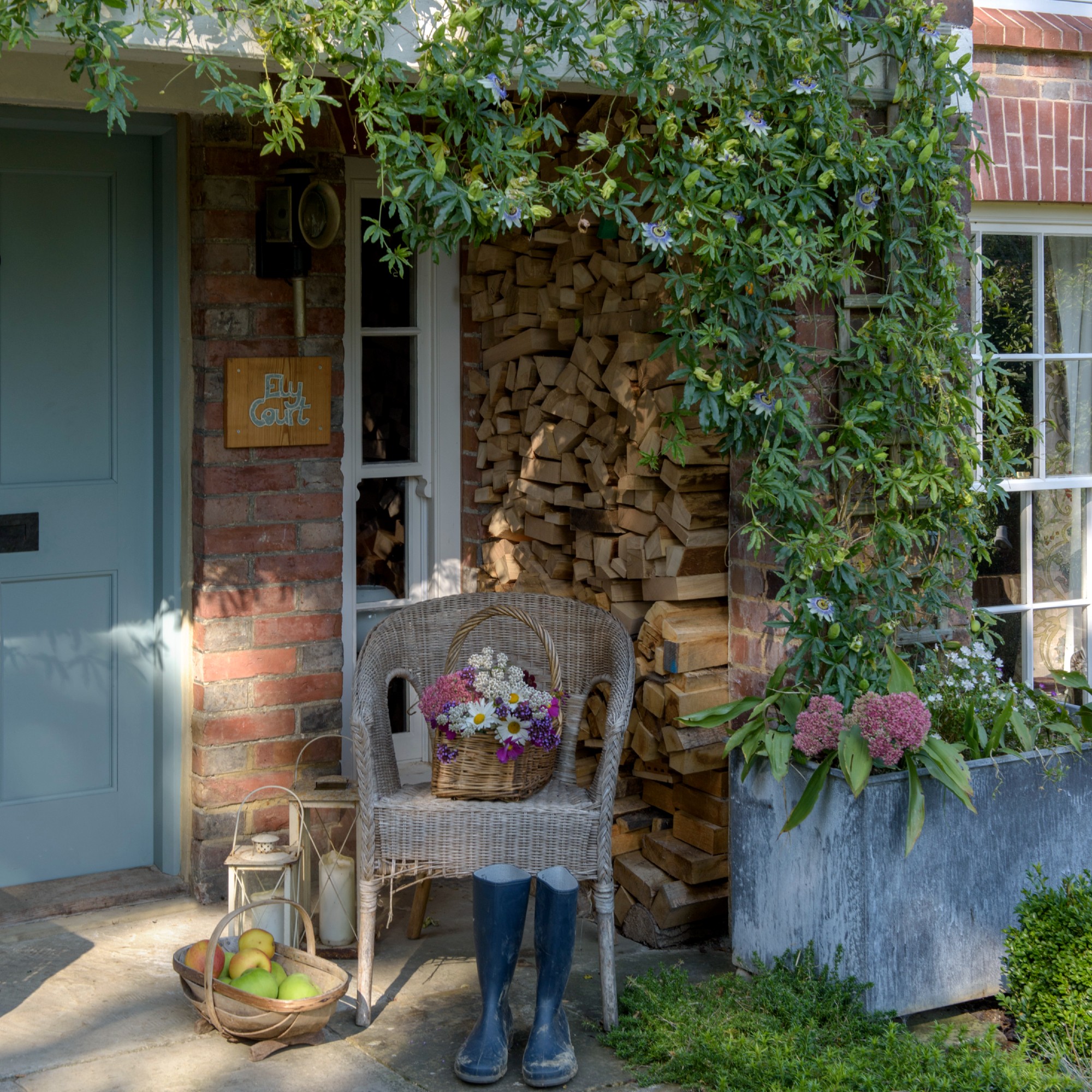 Is your porch missing something to sit on? These 7 porch seating ideas will solve that issue for you in style
Is your porch missing something to sit on? These 7 porch seating ideas will solve that issue for you in styleThese are the top porch seating ideas to make your space more functional and stylish at the same time
By Sara Hesikova
-
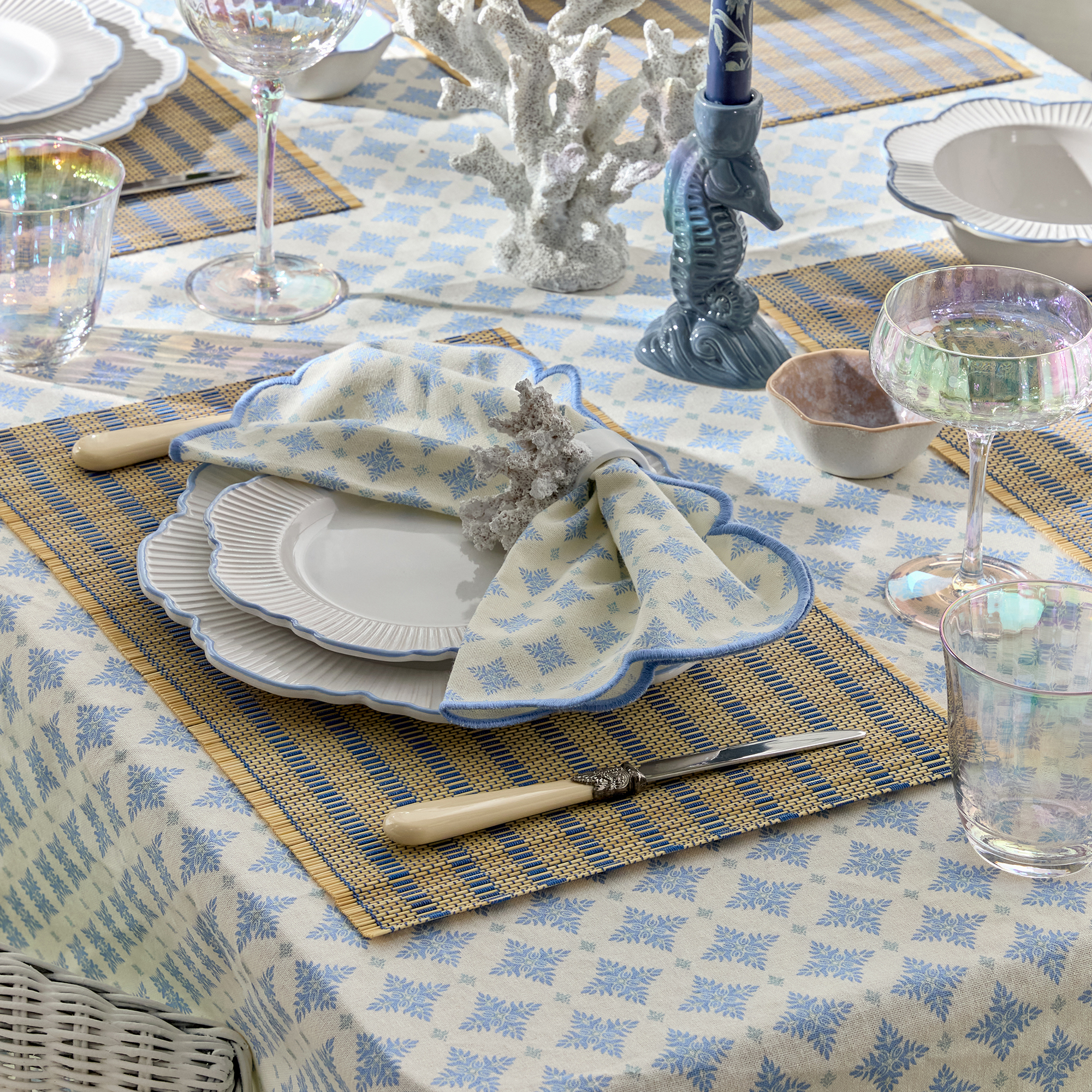 I failed my no-buy month because of this Primark tableware collection - it looks so much more expensive than it is
I failed my no-buy month because of this Primark tableware collection - it looks so much more expensive than it isMy tablescape has never looked better - without taking a hit to my budget
By Holly Cockburn
-
 Kilner's butter churner is back in stock – here's why it sold out in the first place
Kilner's butter churner is back in stock – here's why it sold out in the first placeMake your own butter by hand with this fun addition to your kitchen gadget collection
By Molly Cleary
-
 I won't gatekeep – Magimix's new small kitchen-friendly mini chopper is my secret to delicious lazy dinners
I won't gatekeep – Magimix's new small kitchen-friendly mini chopper is my secret to delicious lazy dinnersMy homemade pesto pasta has never been better
By Holly Cockburn
-
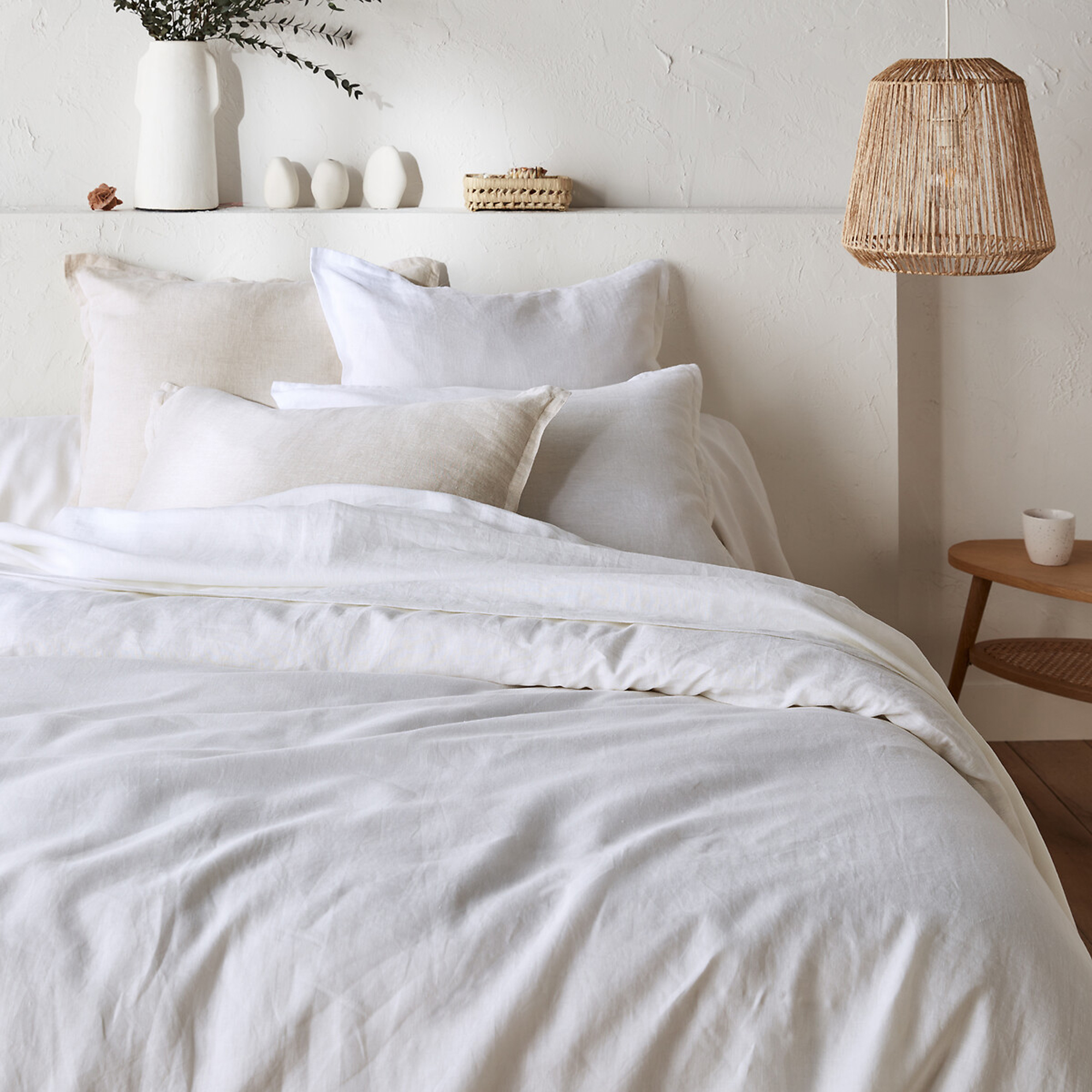 'I've now bought 3 different colours' – my favourite affordable linen bedding is currently half-price, and the 5-star reviews speak for themselves
'I've now bought 3 different colours' – my favourite affordable linen bedding is currently half-price, and the 5-star reviews speak for themselvesThe half-price linen bedding that owners can't stop raving about
By Amy Lockwood
-
 Want to cook like Jamie Oliver? This is the top-rated casserole he uses from his own collection all the time on Instagram
Want to cook like Jamie Oliver? This is the top-rated casserole he uses from his own collection all the time on InstagramJamie's collaboration with Tefal has led to this casserole dish getting the best user reviews I've ever seen
By Molly Cleary
-
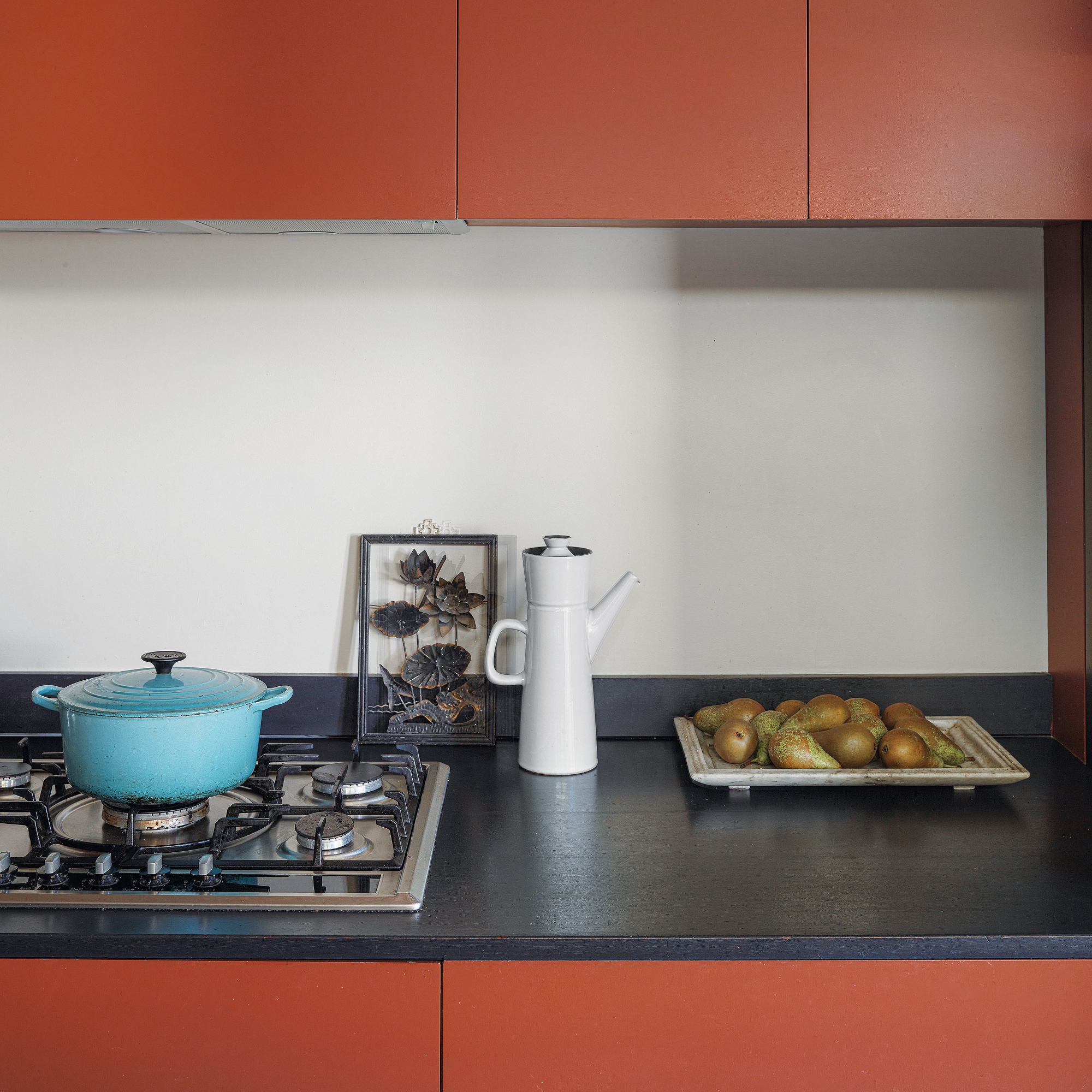 I’ve found a stunning £40 buy that rivals Le Creuset at Wilko - this casserole dish is a dead ringer for one of the most summery colourways
I’ve found a stunning £40 buy that rivals Le Creuset at Wilko - this casserole dish is a dead ringer for one of the most summery colourwaysYou just can't beat finding a great Le Creuset alternative
By Kezia Reynolds
-
 This beautiful mixing bowl is the unexpected star of so many kitchens – including Mary Berry's and the Bake Off tent
This beautiful mixing bowl is the unexpected star of so many kitchens – including Mary Berry's and the Bake Off tentThis earthenware bowl proves that you don't have to spend a huge amount for a classic kitchen addition
By Molly Cleary
